#i know this isn’t quite on the same analysis level as the other post
Explore tagged Tumblr posts
Text
Lucci and Kaku: An Analysis
I haven’t done long analysis/meta/essay-style posts in a while, but after seeing a comment that amounted to “every time Lucci’s shown an interest in something that doesn’t have to do with killing, Kaku’s involved” it made me think about whether or not that's true and, more specifically, whether or not there’s been sufficient build-up to justify what happens in Chapter 1111.
So let’s explore, shall we?
First of all, basic disclaimer that I’ve been heavily into One Piece since 2008 and Water 7 has been my favorite arc since the first time I read it that summer. Kaku, in turn, has always been one of my top characters in the entire series for various reasons…but this isn’t about him (at least, not entirely), so all of that is just to say that I’ve thought about these characters a lot over the years.
And I think what always struck me about them is that not only are they so fundamentally different, but that realistically Lucci should not tolerate Kaku at all. He’s pretty much everything Lucci’s not, and they’re more-or-less a perfect example of the ‘someone will die…of fun!’ meme in a lot of ways (and honestly it’s what I think of every time I see this card, but I digress):

At the same time, what happened in the latest chapter didn’t surprise me, because there’s been hints all along, and I’ve personally been waiting years for it to pay off…even though part of me thought it never would, or at least not in the way it did!
Still, how did we get here?
But First, A Bit About 相棒
So. Why is the fact that Lucci calls Kaku his “相棒” (aibou) so significant? Mostly because of the…individualistic meaning of the word. It literally translates to ‘partner’, but not in a romantic/life-partner way (not to say that it has never been used like that, but it’s not the inherent meaning of the word).
Unlike words such as 友人 (yuujin), 友達 (tomodachi), and of course, with Luffy, 仲間 (nakama), aibou generally only refers to one person. You can have many friends, teammates, crew members…but only one aibou. So by calling Kaku that, Lucci’s already placing him on a different level to anyone else in CP9 or CP0 and acknowledging openly that Kaku’s important enough to him to have earned that distinction.
Which is why a lot of us were very excited about it, since this is not a common occurrence where Lucci’s concerned.
That aside, let’s get to the actual canon content.
Water 7
Obviously at the beginning we find out they both work at the shipyard, but that in and of itself isn’t entirely significant…until you consider that, since Kalifa is pretty much with Iceburg all the time and Blueno’s running the bar, the two of them are working in much closer proximity to each other than to the other CP9 members in the city.
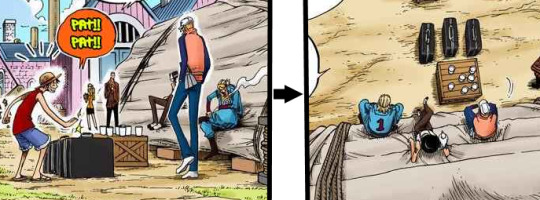
The first real indication we get regarding their comfort level with each other comes in chapter 327 when Kaku gets back from examining the Merry and goes to sit down to explain what he’s discovered. Paulie’s the closest to him, but he actually ends up stepping past both him and Lucci in order to sit directly beside Lucci on the same level.
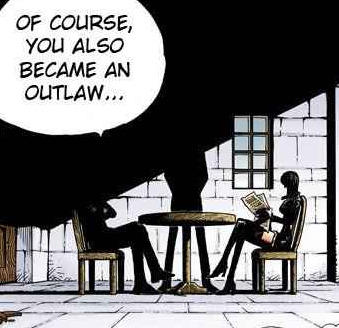
It’s quite a while before we see the two of them alone again, and it doesn’t happen until chapter 339 when they’re speaking with Robin. Of course at the time we’re not supposed to know it’s them, but there’s really nobody else it can be since this is happening at the exact same time that Blueno’s talking with Franky and Kokoro at the bar. So, as will become fairly common, the two of them are again acting as a unit of their own within the larger group.

And then, of course, we get the infiltration of the mansion prior to The Big Reveal (which I’ve spoken about before because for me it’s still the single greatest reveal in the entire manga because of how carefully crafted it is, right down to Kaku’s limited dialogue in this section being completely devoid of his usual speech quirks in the original Japanese text). Once again, Blueno and Kalifa are doing their own things while these two are working together.
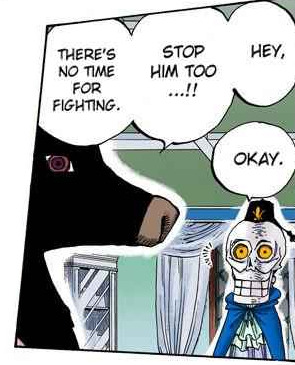
This panel has always been interesting to me because immediately prior to this Lucci says he can’t let Paulie live, and then he decides to just restrain him instead. In Luffy’s case it makes sense because they gave their word to Robin not to harm the Strawhats, but he has absolutely no reason to spare Paulie, and the little lines of shock/surprise beside Kaku imply that he hadn’t expected Lucci to do that, either. The ‘why’ is still unclear, but it’s interesting nonetheless, and it’s also…noteworthy that it’s the only thing Lucci asks Kaku to do. All of the actual damage Paulie takes comes from Lucci and he never asks for or expects Kaku to harm him.
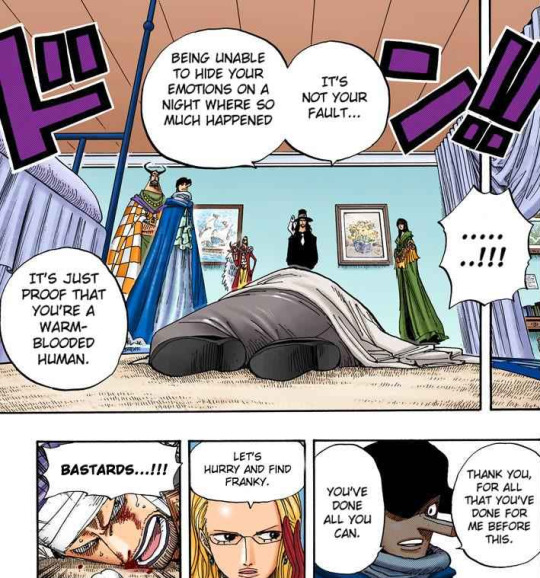
I never connected these two panels before but it’s obviously very deliberate to have Lucci telling Iceburg that feeling emotions is a sign of humanity followed immediately by Kaku…demonstrating exactly that and thanking Iceburg. It’s important to establish that part of Kaku’s character, but keep in mind Lucci’s lack of a reaction here because it’ll come back later.
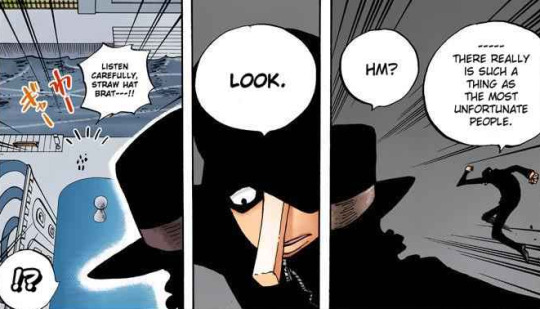
Again, very tiny moment, but there’s a lot of examples of Lucci deferring to Kaku or letting him take the lead without any hesitation, and I like this because Kaku’s noticed something that Lucci hasn’t and Lucci just goes with it immediately.
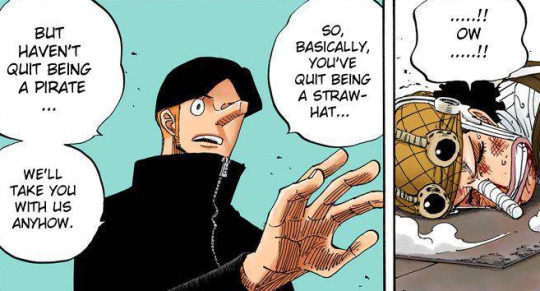
I’d forgotten about this but Kaku’s also the one that decides to take Usopp with them, first by recognizing him as one of the Strawhats and then going through with it even after finding out he doesn’t consider himself a part of them anymore. And Lucci just…stands back and lets him give out orders to the others while doing so.
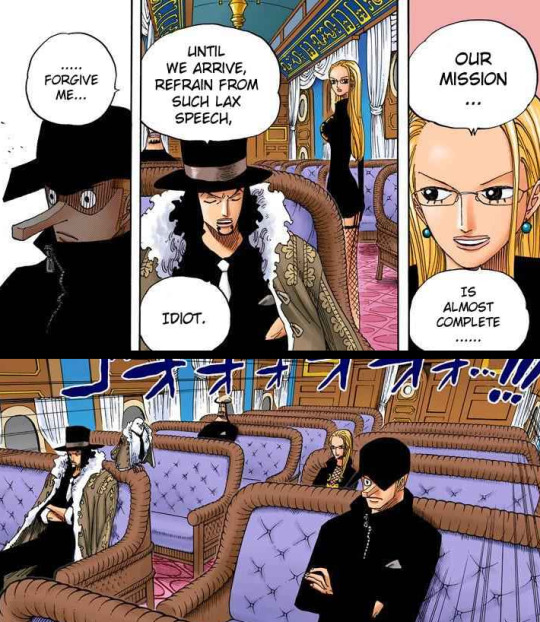
Okay so this is what I was referencing earlier. Kaku shows actual emotions with Iceburg and Lucci’s silent, but the moment Kalifa gets even slightly happy about completing the mission he’s berating her instantly. Kaku’s expression here is interesting too because he looks absolutely haunted and it’s very telling.
And also another visual representation of Lucci and Kaku being equal to/on the same level as each other.
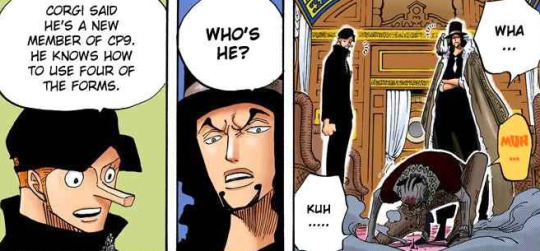
I didn’t include the panel but Kaku was ‘sleeping’ when Corgi was giving them all of the information about Nero while Lucci was (seemingly) wide awake, and yet Lucci has no idea who he is and relies on Kaku to have all the information. Which he does.

Kaku being the one to take charge again and direct the others even though Lucci’s standing right there. They do this more than I’d realized at first, especially since Lucci always seems to be looked at as the unofficial ‘leader’ of CP9.
Enies Lobby
We’ve made it to Enies Lobby, which is the first glimpse we get of these two interacting with the full CP9 group outside of any sort of ‘mission’ environment.
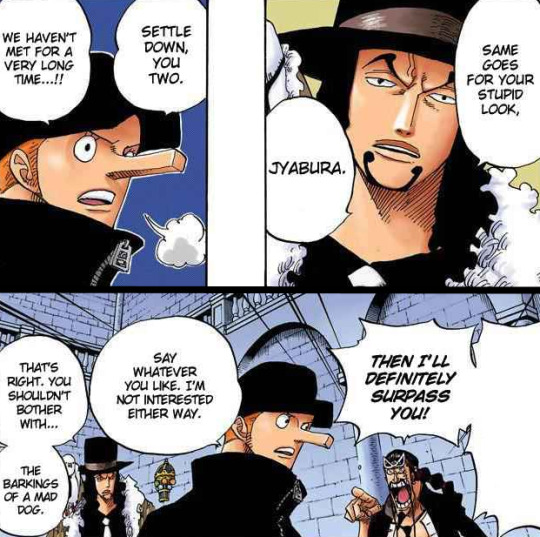
Mostly it entails Lucci being more combative (especially with Jabra) and Kaku being more annoyed, but again I can’t really imagine anyone else taking this tone with Lucci and getting away with it while Kaku does it fairly often and Lucci never retorts or gets angry with him.
And while Kaku’s not immune to taking Jabra’s bait in the right circumstances, his typical tendency is to de-escalate situations if he can and here he’s refusing to engage despite being deliberately called out…and Lucci, without being asked, immediately takes his side and defends his choice.
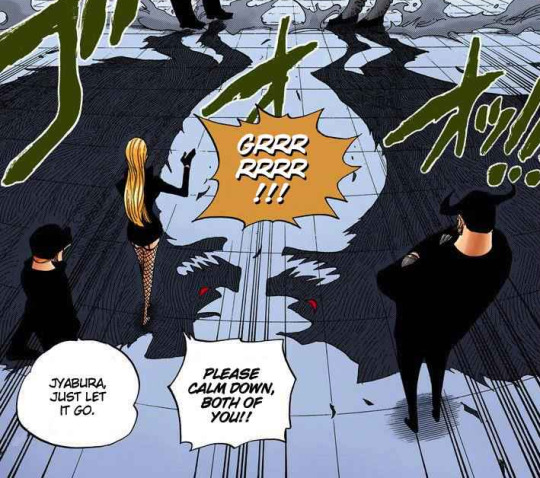
This is practically the next panel and while both Lucci and Jabra are kind of equally at fault for this little display, Kaku only berates Jabra for it while Kalifa’s directing her comments at both of them.
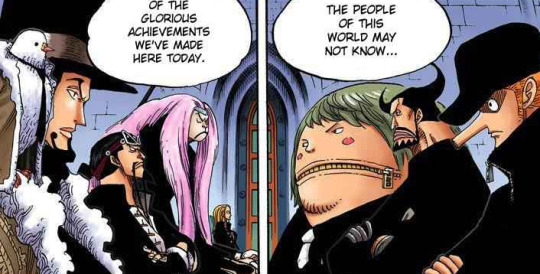
Now that I’m actually looking for these sorts of things it’s becoming more obvious, but again we have Lucci and Kaku in an equal position to each other at the front of CP9.
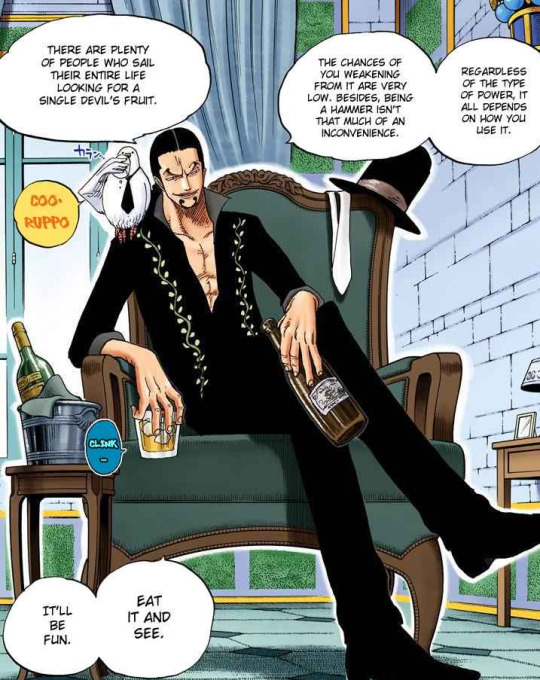
This isn’t just to Kaku since Kalifa’s there as well, but Lucci’s still encouraging them to eat the fruits and I have to believe it’s coming from a place of good faith because he’d know whether or not being able to swim is that big an issue in their profession. I also want to note that Kaku echoes Lucci’s ‘it’ll be fun’ line when he actually does eat his fruit, so obviously that resonated with him.
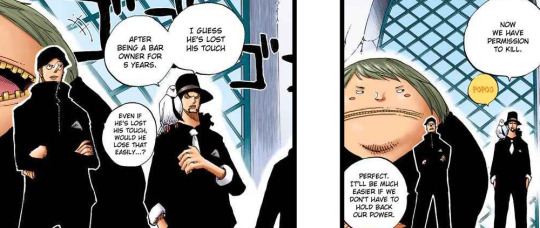
I’ve put these two together because they both highlight the same thing, that being in both of these sequences we get almost all of CP9 giving out their individual thoughts/comments on what’s happening but Kaku’s statement both times is a direct reply to what Lucci says, so again the two of them are paired off in a way that doesn’t include anyone else there.
The only other thing of note in this section is that while Robin’s talking about what happened during the Buster Call on Ohara, Kaku and Lucci are the only CP9 members to kind of…break formation and actually look at her while she’s speaking, which is interesting.
And for the rest of Enies Lobby they aren’t together so there’s not too much more to say here other than Kaku of course being the one to have the actual key to Robin’s cuffs, but it’s never made explicit who came up with that plan or handed out the keys so…if I ever actually do the thing and write a full analysis of Kaku’s character we can talk about it then Lark you’ve been saying you’ll do this for years IF I EVER--
Interlude - CP9’s Independent Report
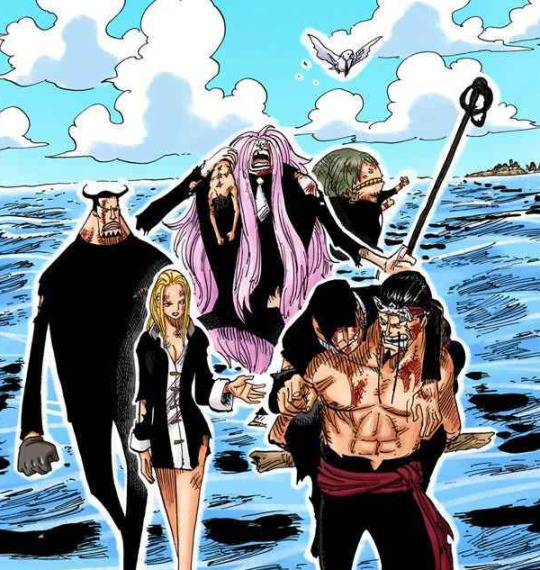
Besides the fact that this is still one of my favorite cover stories, there’s a couple of noteworthy things here, the first of which is that Kaku again is taking the lead. Even though he’s the only other CP9 member other than Lucci to be injured badly enough that he can’t walk on his own, he’s still the one directing them where to go.
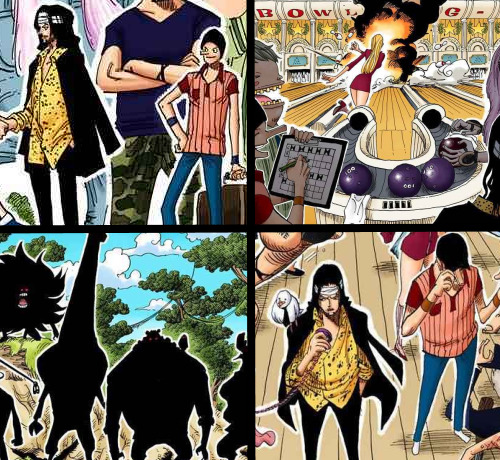
Other than that, I love seeing all of them just…interacting like friends and being very relaxed and casual, and pretty much every panel where Kaku and Lucci are together they’re directly beside each other so I’ve included a bunch of those here.
Dressrosa & Egghead
The next time we see Lucci and Kaku is at the end of Dressrosa, where they’ve been promoted to CP0 Oda can we please get some explanation of how this happened and let me tell you, I remember this vividly because the spoilers at the time just said that Lucci was talking to ‘someone’ and when the raws came out you can bet I went right to the dialogue to see if it was Kaku because his way of speaking is so telling.
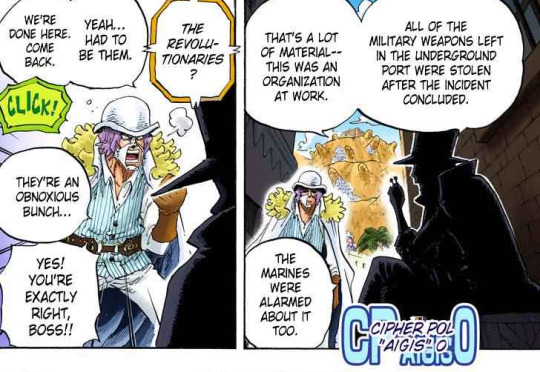
But even in this little scene, we can see they’re having an equal conversation and there’s a major difference between how Lucci’s speaking with Kaku and how he addresses Spandam mere seconds later.
After this we have the Reverie/Levely/what-even-is-this-thing-called arc where they get all of a single panel together and while it’s the first time we actually ‘see’ Kaku after the time-skip, nothing really interesting regarding their relationship happens, so let’s move on to…
The end of the colored manga! And Egghead.

We start with a very familiar situation: Lucci asking Kaku what’s going on, and while Kaku this entire arc seems more outwardly annoyed with Lucci than he ever was in the past (which is never really explained but then again, Lucci spends a lot of the arc doing things he’s specifically been told not to do, so maybe it’s understandable…), he still has all the information and relays it.
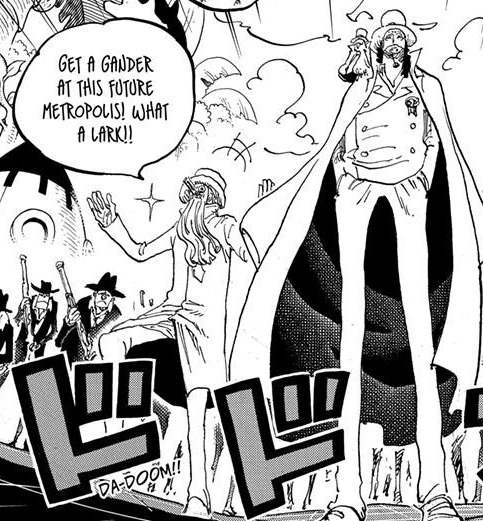
Though Kaku’s also much more comfortable letting his real personality show despite them being on a mission while before he was always completely serious after the Water 7 reveal, especially around Lucci. It came through with Zoro and Jabra but during the cover story he’s smiling and laughing a lot with Lucci right there so it makes sense he’d be more willing to let his guard down even ‘on the job’ by now.
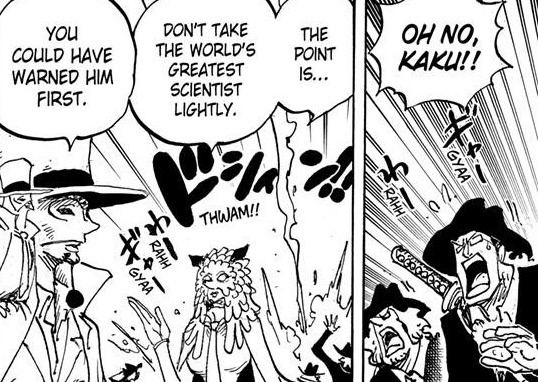
So here’s the first real instance of Lucci showing concern for Kaku, something which escalates pretty quickly throughout the arc. It’s subtle, and though he’s framing it as a suggestion to Stussy, if he didn’t care at all he wouldn’t have said anything.
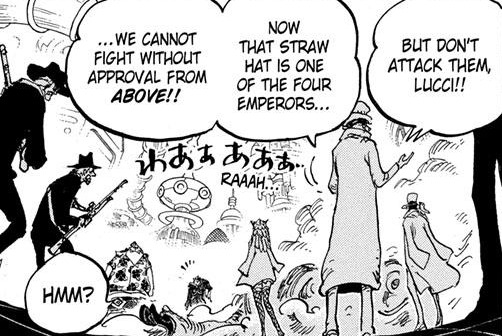
At this point it’s fairly obvious that Lucci and Kaku don’t really have any authority difference between them and Kaku spends a lot of time in this chapter especially telling Lucci to Not Do The Thing. Anyone that’s ever lived with a cat knows how well this works.
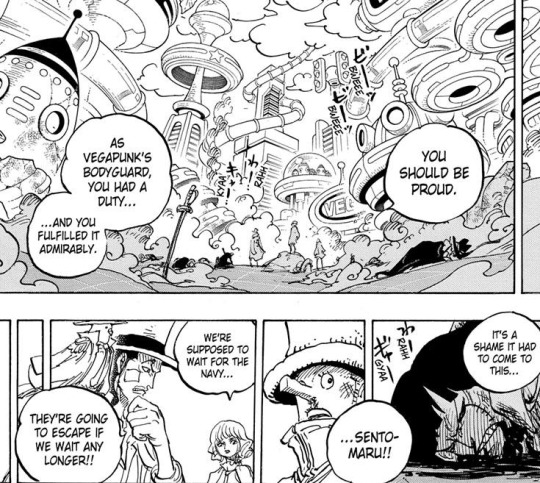
I’ve always found this bit of dialogue particularly interesting because Kaku’s very openly…praising Sentomaru for choosing his loyalty to Vegapunk over assisting the government, and there’s no way Lucci doesn’t hear him say this but he doesn’t say anything in return. There’s no real evidence that Lucci knows about Kaku willingly giving up the key to Zoro or how conflicted he was about Paulie and everyone else, but this seems to imply that at the very least, even if he doesn’t share those sentiments, he wouldn’t think less of Kaku because of it.
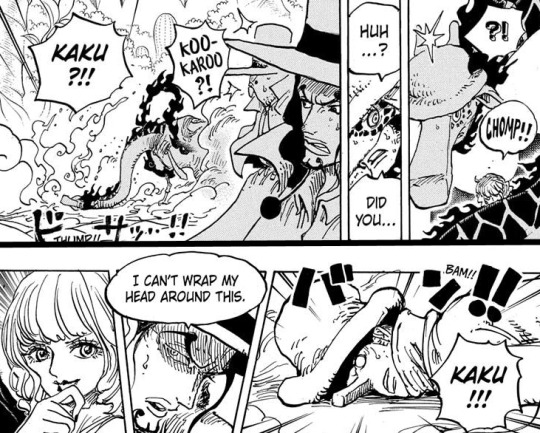
Putting these two together since they’re in the same scene but at this point it’s not even subtle concern anymore, Lucci’s genuinely worried for Kaku and you can tell this caught him off-guard.
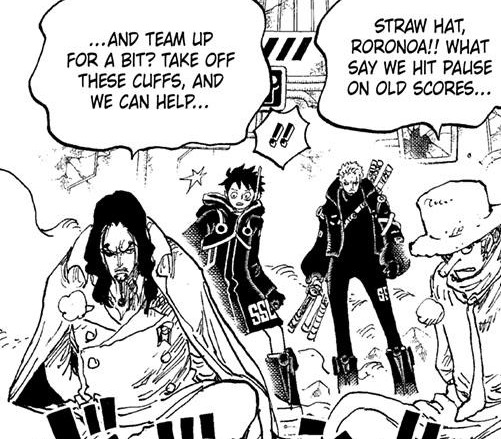
Kaku’s the first one to suggest working together but Lucci immediately backs him up and goes with the idea. It’s logical in the sense that it’ll give them the biggest chance to survive, but willingly working with pirates isn’t exactly the sort of thing that Lucci, especially in the past, would have so easily done regardless of the situation.
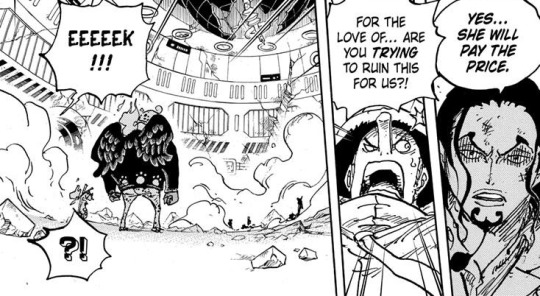
So at this point it’s becoming clear that this whole 4-v-2 section is supposed to be the most…light-hearted thing going on right now and a lot of it is played to be comedic, including Lucci’s inability to lie, but yet again there’s almost nobody else that could get away with scolding him the way Kaku’s doing here.
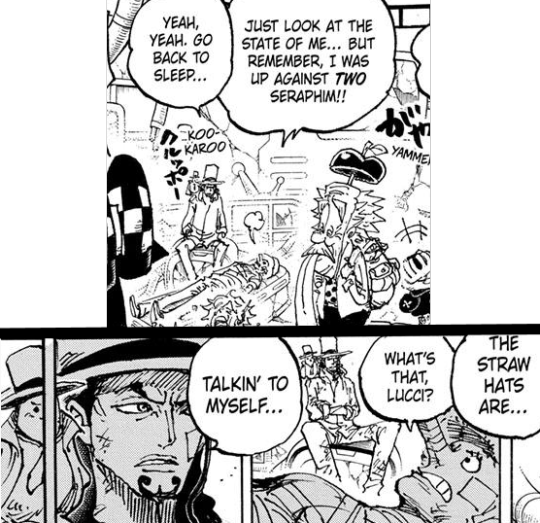
…And then we skip ahead a day and things happen that I really hope get explained at some point because they seem important, but while Lucci’s never going to have impeccable bedside manner, he’s very concerned with getting Kaku to rest and while Kaku’s trying to justify what happened Lucci really doesn’t seem to care about that. It’s a big departure from him being willing to write off anyone he deems ‘too weak’ and it’s a nice character moment.
I’d mentioned on my liveblog that some of the things Lucci was doing after this point were confusing, but if you look at them through the lens of him wanting to protect Kaku, it makes a lot more sense. Yes, he’s deliberately keeping him out of the loop, but Lucci I think has decided that he’s going to throw caution to the wind and act alone since if Kaku can’t prove he knew about the plan, he’s probably safer being left with the Strawhats, and if the Marines show up he should be safe anyway or so Lucci thinks…

When this chapter came out, I’d said something about Lucci being a hypocrite considering what the rest of CP9 did for him when they could have easily just left him at Enies Lobby, but given what happens almost directly after and likely what he’s trying to do with this entire fight, these words feel even less genuine…
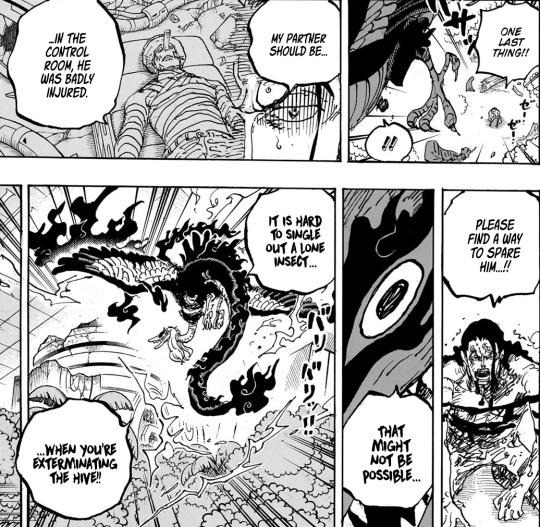
And that brings us to this. The moment that I’ve been thinking about for almost an entire week now. The moment that, looking back at…oh, wow…almost 3000 words of analysis maybe shouldn’t be as surprising as it was for most of us, but it does feel like the payoff for a long, long buildup that’s taken nearly twenty years to reach. Because really, there’s no other way to describe them other than ‘partners’, and probably hasn’t been for a long time…and I’m so glad that Lucci acknowledged it.
To summarize, I think what surprised me most about re-visiting all of this is how much the manga has framed them as equals since the beginning even though it was never explicitly stated between the characters themselves. Lucci’s always been far more lenient with Kaku than with anyone else, and Kaku in turn has never had any fear of Lucci even if he wasn’t really expressing his true self with him for a long time.
The cover story being the turning point makes perfect sense, and the progression throughout Egghead of Lucci being more outwardly willing to show his concern and Kaku not hiding his emotions at all seems like a natural progression of their relationship and their level of comfort around each other.
And the fact that Oda is never really…hitting us over the head with any of it until that final moment when Lucci says everything so plainly because Kaku’s life is the most important thing to him even when faced with a literal monster… It’s so effective.
I don’t know where we go from here. To be honest, I’m kind of scared of where we go from here. But regardless of the outcome, I hope this little essay has been at the very least interesting and perhaps allowed you to look at these two in a different light.
Thanks for reading.
#one piece#opspoilers#rob lucci#kaku#meta#analysis#i forgot about the 30 photo limit so I had to get creative here but#3k words of me examining their relationship sure happened
228 notes
·
View notes
Note
I thought joong was straight? He is quite into dunk lips but beyond that i thought straight. I don't even read him as bi?
Look, I neither actually know nor care what Joong’s sexual orientation is. That’s between him and whomever he chooses to tell. And most of my Joong knowledge is adjacent to my knowledge of FKT, AouBoom, EarthMix and DaouOffroad because he’s close with all of them. I more know of him then know him, so I could be missing stuff.
I would say, in regards to your ask, Joong doesn’t appear to have the painful knowing that often comes along with growing up queer in a society that doesn’t want you to be that a lot of other queer people use as a tell to identify each other. The thing that makes us, as queer folx, hesitate or get shy when it comes to things straight people wouldn’t think twice of. And while I do use that in my analysis sometimes, I also know members of Gen Z across the world actively work to resist that shyness and that shame that comes with internalized homophobia and honestly the real-world consequences that can come from being proudly out.
What I do know is he is 1000% into the fanservice portion of his job. Now either it’s his job and he’s having the best time being gay for pay, its his job and he’s excellent at pretending to have the best time pretending to be gay, or he is just shamelessly queer and has said fuck the knowing.
This man is out here yelling into full concert audiences “where is my teerak” and when the audience yells back saying SHHH! he didn’t ask for them, he asked for Teerak! He’s hugging and kissing Dunk at every opportunity and posting various shots of Dunk’s bare waist in crop tops during this THK filming area. He strikes me as the kind of man who reads the RPF about himself. In The Heart Killers book fair panel this past week, he talked about his love of reading BL novels and imaging himself and Dunk in the lead roles. Take that for what you will.
He also expressly stated in an interview alongside Dunk this week that he insisted on being paired with a partner the same height as him. Specifically stating, he thinks it’s a stereotype that one member of an imagined pair/branded couple is always bigger than the other and he didn’t want to lean into it. He wanted to go against that narrative.
As @firstkanaphans and @respectthepetty pointed out, he has a shit ton of queer friends and has close relationships with the members of GMM that are most likely to be clocked as queer (whether they are or not is also not expressly public knowledge and some folx that people clock as gay are straight because femme isn’t exclusive to gay men) Which again, either he’s the most down for the cause straight dude that exists or he’s also queer. My stance is considering he and Daou talk about how close they were to starving trying to make their first shot at being idols happen, I hope they’re having the best time in Thai BL fanservice land being shameless and getting that money.
To end, let me paraphrase my beloved Kit Harrington: to believe you can tell the level of queerness someone embodies just by looking at them or listening to their voice or looking at their hobbies, you’ve missed the entire part of Heartstopper.
Which is why I keep all my speculating to mostly private convos and tumblr where I can pretend celebrities don’t live because we’re all mostly anonymous on here and this site is hell to search. Don’t @ folx on Twitter or on their IGs or their TikToks. Don’t try and out people with YouTube videos. Let the Schrödinger’s Gays enjoy their boxes.
I know I have other anons (I see you. I am maybe coming soon) but this required less work on my end to compile my answers.
#joong archen#joongdunk#either he’s getting paid to have a good time or he’s having a good time and the bonus is getting paid#and i honestly hope he’s happy#that’s all i’m saying#jojo also has made statements about wanting to work mostly with queer actors as a queer director because of how hard it is for queer talent#but whatever#double27 talks#anon ask#i know I have other anon asks#i will get to them#this just didn’t require me finding stuff or putting it together#also I worry about joong specifically because of colorism#and I don’t know how Thailand is with Turkish ancestry but I know it’s a huge issue in Europe and European spaces#so I worry#he’s just a giant puppy#his actions live in my favorite category#it’s not not gay
99 notes
·
View notes
Note
Just wanted to say thank you for your curly posts, I feel like a lot of people try to make it seem like a black and white situation with him when it’s just a gray one.
Multiple things can be true at once. Yes, Anya was failed by Curly and Curly enabled Jimmy. Yes, Curly was friends with both of them. He didn’t want to believe that his friend did something so shitty like that to another person and was giving him the benefit of the doubt. Do I think he should have? No, though I can understand why he did what he did. Do I think Curly had bad intentions? Also no, though they were misguided ones at best.
I’ve seen quite a couple of posts that claim Curly was just as bad as Jimmy and that they deserved each other in the end. Which, I was just so tired of seeing, because I just don’t feel like they’re on the same level at all. I also feel like people ignore how Curly becomes a victim as well when he’s being abused, again - Curly wasn’t innocent, but I don’t believe that justifies in saying that he would be on the equal field as someone that becomes his abuser, when Curly becomes completely dependent on others for living.
So, reading your posts was a nice refresher to me that not everyone thinks in one ways about Curly T-T
Thank you 🤟🏾
The first thing I do in my analysis is figure out intentions of the themes and intentions with the characters.
I feel like people think Curly and Jimmy had the same intentions because they were friends rather than Curly’s intentions being misguided by his friendship with Jimmy. It’s not malicious and it’s not something he was aware of. He’s a flawed person and a great character and I feel like people are making that one flaw his defining trait.
I don’t know what people want like the game isn’t about revenge like it makes it clear that getting even or leveling the playing field the way they want literally only ends up making things worse. Like I don’t enjoy excessively torturing a character, just cause you feel there were viable options that didn’t actually exist that he willingly ignored.
#not to say I don’t like talking about the characters but I just don’t want to specifically talk about curly being a villain in the story cuz#it’s taking from actuallly talking about Anya in the story like I think Curly and Anya are equally dehumanized by Jimmy but in vastly#different ways and I’d rather talk about that than keep having to defend#a very realistic interpretation of him simply based on the fact he was trying to reduce harm and acted too late based on his perception of#things like sorry I just don’t think he was malicious#mouthwashing#ask#anon#like people forget that good people can make bad mistakes and still be good#like again it says something that anya still felt comfortable and safe around him despite his inaction
51 notes
·
View notes
Note
hello! please, if its no trouble (i 100% understand if im asking too much, i know itd be a bit of work >_<) would you ever be willing to write an analysis of reiji? at least a summary? i adore DL and have for years, but ive never been able to quite understand his character and why he does what he does! (i am a tripletologist lmao i focus on them) i adore your blog and the way you discuss reiji! id love to hear from someone like you what reiji is all about and what makes him tick :) only if its okay though! youre extremely cool!
-resident guy who loves character analysis
Hi! Of course! Take my words with a grain of salt though because it’s always easier to understand a character when you’ve had similar experiences.. I’m a very lazy and unenthusiastic person so I hope you’ll understand🧍I adore characters like Reiji because of how drastically different they are from me. Unfortunately I cannot afford to write a full analysis as of now because I haven’t gone through all the games yet! The amount of reading and note taking I’d have to do (outside of the two games I already played) would probably be like writing an academic paper… I’d love to dig deeper but unless I’m super free and motivated please don’t set your expectations to high for me! That being said I’ll try to summarize my thoughts here.
I feel that he grew up to be the way he is because fate was simply just that unfair to him. It’s no surprise that one will develop some sort of coping mechanism if they failed to receive proper care and support when they were younger. In Reiji’s case, I feel like he’s had a competitive personality since the very beginning, and that he isn’t that type to simply sulk because life isn’t treating him well, but he’d strive to become the best he can so that Beatrix might at least cast a glance at him. Because of that, he’s set out the same sort of expectation for everyone else around him.
And then there’s Shu who received so much attention but is also put under tremendous pressure. I won’t go into detail about him, but he has his reasons for wanting to escape from what is thrown at him, too. I don’t blame either of them for turning out the way they did, but Reiji did have to live his life in resentment for Shu, an uncomfortable reminder of how little his mother seemed to care for him. A lot of this is just surface level, though. When it comes to family, especially vampires whose true ages remain a mystery, there is no singular emotion that can sum up the nature of their bonds. My guess is that Reiji doesn’t exactly ‘hate’ Shu so much that he wishes genuine death upon him, or else he’d probably attempted a long time ago. Shu might be a bit of a lost cause to him, wasted potential, one who threw away and did not cherish anything that was given to him.
Now imagine harbouring all of these negative emotions for your entire life while unconsciously having an inferiority complex, becoming obsessed with your own worth and abilities just to prove a point that you are someone that matters. This is probably also the reason why he appears so strict with Yui. There’s definitely some sense of projection. He’s ridiculously disciplined and expects the same level of dedication from everyone else, expecting them to prove their worth as he tried or still tries to do. I feel that he didn’t allow himself to display any weakness, and so despised it when he sees signs of that in others. His way of caring for others I expect would also be twisted in a some way. He genuinely believed that discipline, control, and constant self-improvement is important to survival. It’s all he’s ever known, probably.
Lastly, someone did a wonderful character study a while ago. It’s much more elaborate than what I have here. I really like their take on him.
https://narihira.tumblr.com/post/63820496449/a-sakamaki-reiji-manifesto-character-study
40 notes
·
View notes
Note
Do you think Naoya and his brothers feel a slight resentment in the change of Naobito’s behavior towards Naohime when compared to raising them? While Naobito is certainly not Grandpa of the Year, I’m sure his behavior is a significant improvement to how he raised his own. So I’m curious if they’d hold some anger towards him or Naohime(I doubt Naoya would but I think he’s feelings might be complicated) since it shows Naobito had the capability to be better but wasn’t? Or do they think that Naohime is just a Naobito whisperer Lol
Now isn’t this an interesting ask? This is a can of worms I feared opening because it might put some of Naoya’s relatives in a bad light but hey, that’s just how some families work haha.
Anyways, I won’t say much here, everything will be either on the actual post or afterwards :> I hope you enjoy my analysis of the situation!!
Warnings: none. Difficult family dynamics.

I would love to say that all of the Nao-siblings are responsible, mature adults when it comes to their feelings but let's be real, when Naohime comes along that’s when the real issues with their nephews begin.
Sure, they always considered them to be quite spoiled from Naoya’s willingness to give them whatever they want, followed by having an actual mother that cares for them, to finally, how they don’t seem to go through the same suffering they did when growing up around people like the Zen’in. (You defend them, Naoya is somewhat softer when training them, etc)
They don’t like the whole dynamic around your family…
BUT Naohime just takes it to a whole ‘nother level. At the intervention of Naobito, they finally realize that what they felt upon seeing your family… might’ve been akin to jealousy. It’s just that Naoya gets to experience that as well this time around.
However, the worst part of it is that nobody really expresses their sentiments, so they kind of just continue to grow bottled up inside them—and you don’t blame them. It’s the first time they get to see Naobito being… well, an actual human being and not the monster they grew up to fear and avoid, so they just don’t know how to process it.
Naofumi kind of gives you hints about their current turmoil, or at least that what affects those present at the estate—I dare say Naosuke and Naohito couldn’t care less about this because they’ve moved on, really. They’re rarely home anyways. And truth to be told, when they’re told about Naobito’s and Naohime’s relationship, they don’t really believe it— but outside of that, he’s used to never being up to anyone’s expectations so there’s no difference now :’(.
Naohiko is very vocal about it too, always complaining about how the old man “now has a heart” and how “ridiculous he looks” acting like that. He blames it to old age, that he’s growing senile, or he’s finally lost it, but…. Well, he won’t do anything outside that. Like Naofumi, he’s accustomed to never being to anyone’s expectations. Dare say, he probably has children too at this point, so he can’t bother himself to care about other kids that aren’t his.
Naoaki and Naoya though… they take it the worst.
Naoya is conflicted in the sense that he’s happy that finally one of his kids appear to be of his father’s approval (he’ll never admit it, but he’s unfortunately cursed to always seek his approval, one way or the other.) it’s just that… he never expected to see that kind of behavior coming from him. For the longest time, he believed it was too ingrained in Naobito’s DNA to be evil… alongside the eternal questioning of “what does Naohime have that I don’t to earn that kind of treatment?”
He eventually overcomes this when Naohime reassures him of being the best father ever (it’s a type of “Father adores Naohime, but Naohime adores me, so take that!!), because to him being a good father is much more important than being a good son (at least to someone like Naobito.) and besides, to compare himself to Naobito is… his worst nightmare haha. But all possible thanks to your and the kid’s support ♥️.
Naoaki… yeah, he’s the worst. He effectively hates Naohime, unjustifiably, but he couldn’t hate Naobito more so he has to take it out somehow, you know?
Now, he won’t do anything outrageous, but… he’ll try to diminish her achievements, make her feel guilty about what she does or doesn’t do, and most importantly, project his own insecurities onto her, like comparing her to her siblings. Naoaki genuinely believes she doesn’t deserve all that she gets, thinks that he's worked harder and such. Kind of a “I spent my whole life training to try to appease my father, and this kid is just born and suddenly she’s all he’s ever wanted?”
But by that point Naoya is the leader of the clan so if anything happens he’ll make sure to take the necessary measures to protect his family, though I think that Naoaki would rather live anywhere else than be under the control of his brother. So, kind of like Naosuke and Naohito.
Naohime is quite a spoiled kid, but nonetheless, she’s equally loved by you and Naoya, and Naobito, it seems haha. You really did come to change the Zen’in estate for good 😭😂.

TLDR: Naoya is a bit conflicted but eventually surpasses this situation because he loves Naohime too much to let such petty things bother him. (It took YEARS to get this mature version of Naoya OOF worth it) Naoaki already disliked everything that had to do with you and Naoya so now this is just— great lol. He’ll avoid Naohime most of the time… unless Naobito inspires her to mock him 💀
There you have it :> what I believe their thoughts would be regarding Naohime’s odd relationship with Naobito. They for sure think she’s some kind of Naobito-whisperer lol and those bold enough might use that to their advantage (like get favors and such, very bad influences indeed) but I also believe it doesn’t really matter since I envision that by the time she’s around Naoya is effectively clan leader. It’s a miracle that Naobito is still around by that point lol.
I hope you enjoyed my short analysis, and you don’t know how happy it makes me to read that y’all are interested in my other characters 😭!!!! It’s the highest compliment I could get, so thank you so much for sending in this ask 🥺♥️
Take care and hope to see you soon!!
#ask#naoya zenin#naoya zen'in#naoya x reader#naoya zenin x reader#naoya zenin x you#jjk naoya#naoya zen'in x reader#jjk x reader#jjk fluff#jjk x you#prompt series: jujutsu kaisen
40 notes
·
View notes
Text
Ok i know i don’t really fragmem post over here but there’s something that’s been bothering me lately that i kinda wanna talk about in the same vein as my past analysis posts. I’m not trying to start anything and everyone is entitled to their headcanons and opinions, and I will continue to believe that because it’s rude to overstep on things like that. That being said…
This post is about Myunna’s age. And the fact that, seeing as they’re often viewed and depicted as a child by the fandom…
Then why isn’t Rimicha?
Like I said, I’m not looking to start a fight, and I’m not trying to change anyone’s headcanons or beliefs. This is just something that’s been bothering me personally, and I thought I’d bring it up while we wait for the final part of Blue episode 3 to come out in a few days.
To start off, I wanna compare Rimicha and Myunna as characters and examine what makes them so childlike in the fandom’s eyes—the latter more than the former. A lot of surface level things are easy to pick up on:
Both of them have very ‘’’childlike’’’ personalities, in terms of coming across as irresponsible, skittish, excitable, insecure due to their inexperience in comparison to their fellow knights, etcetera.
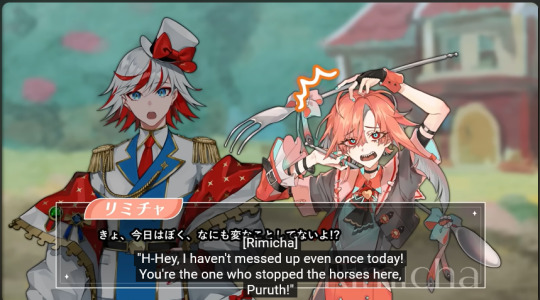
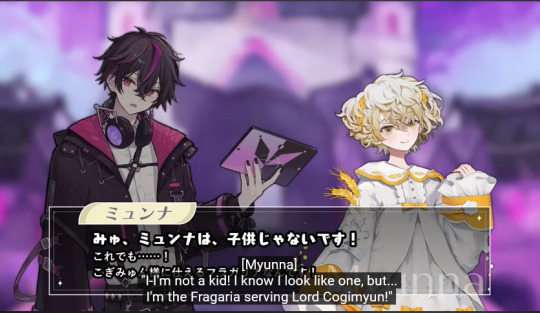
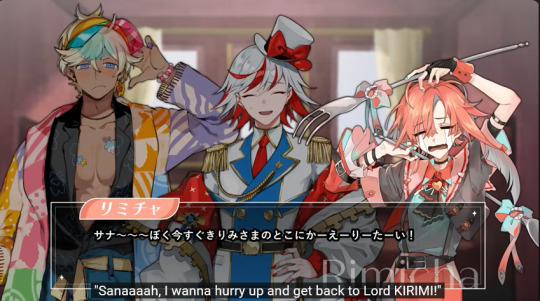
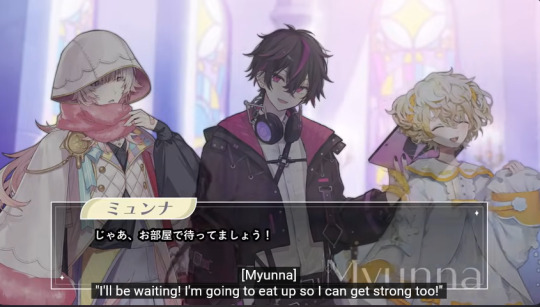
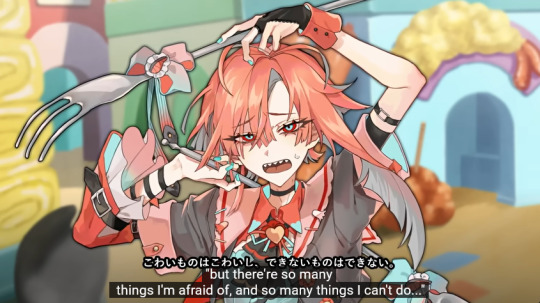
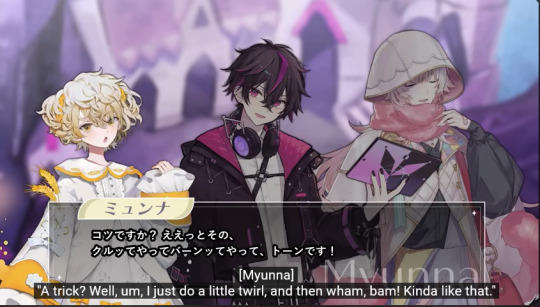
2. Similarly to the previous point, this behavior can also lead to other people treating them differently, be it teasingly/affectionately or just outright talked down to like they're kids. This carries over to the fandom in a way
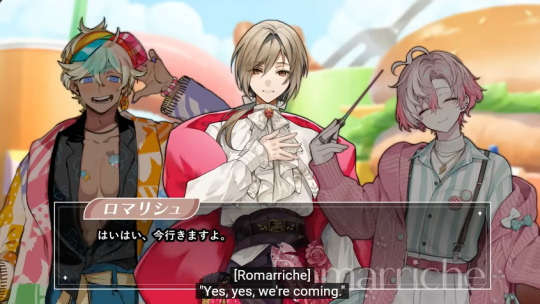
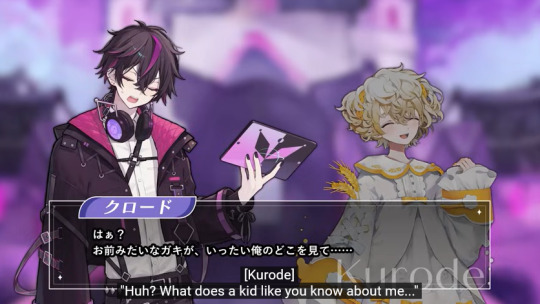
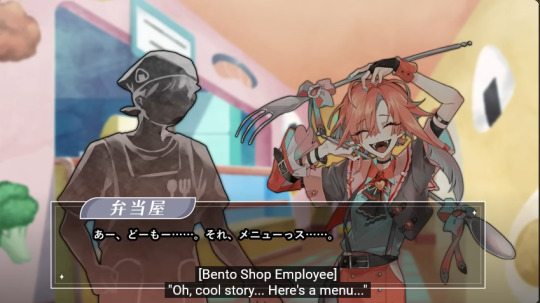
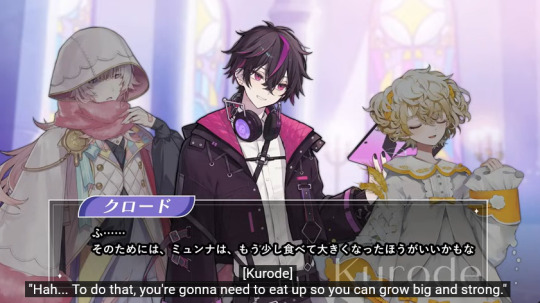
3. Both of them are barely over five foot. In fact, Rimicha is only three inches taller than Myunna (Rimicha is 5’5” or 165 cm, Myunna is 5’2” or 157 cm). That’s not a very big discrepancy
4. Both of them are twinks. I’m correct and you know that I mean look at them. They’re both skinny, shorter boys who appear younger and more androgynous in comparison to their peers and seniors
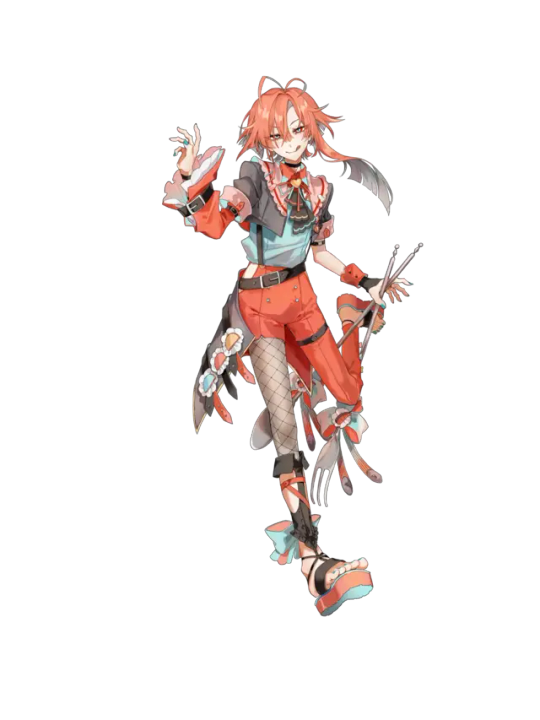
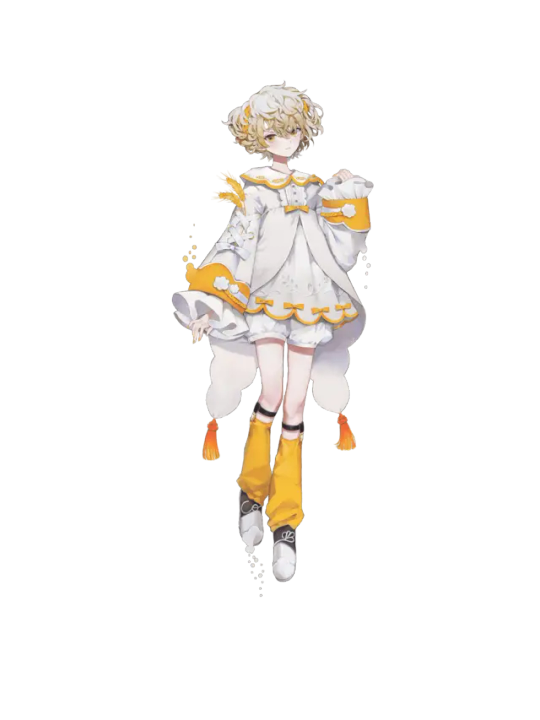
5. Both of them are not only the youngest of their Bouquets, but are also the youngest of all the Fragaria Knights overall
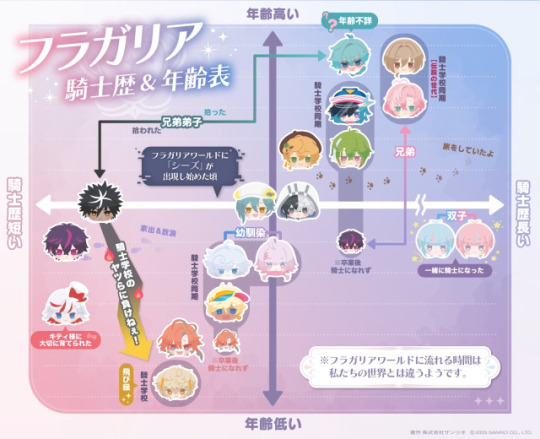
This chartthat was recently released by the official twitter shows the age:time serving ratio of each knight, and seems to imply that each space is only a one year gap between characters—for the most part—which already tells us a lot. Based on that math, Myunna and Rimicha are barely a year apart in age, and less than that in the amount of time between when they each became knights.
So all things considered, Myunna and Rimicha are roughly the same age and should be treated as such, right?
But the thing is… they’re not.
Rimicha is treated as an adult by the fandom, he’s his fellow knight’s peer and trusted ally, and the fandom doesn’t deny that for even a second. Myunna, however, is treated as a child, as in like 10-14 age range, and is not viewed with the same respect and fairness their Red Bouquet contemporary is.
Something about that has always bothered me. With how they both act, look, and the fact they're the youngest of their groups—and overall—it's strange that the fandom views them so differently when there's so much similarity between them. I genuinely don't know where that would've come from.
One reason I can believe for people viewing Myunna as younger by comparison is the fact that they’ve skipped a grade in Knight School, as confirmed by the interviews conducted for the first anniversary
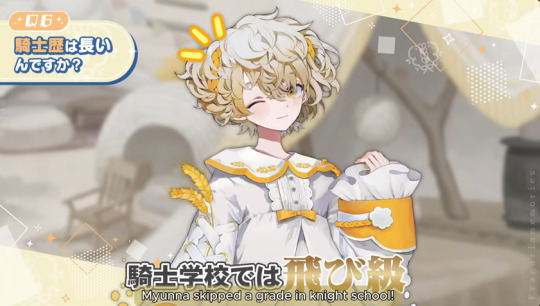
I can see why this would make people think that, but I really don't think it quite adds up to conclude that Myunna is a minor, especially if it was only one year they skipped.
We don't know much about Knight School, so for now let's say it lasts about as long as a normal high school/college, and you go for four years. And let's say Myunna was 14 when they started going, since that seems like a reasonable age for them to have started going while still being young.
By that math, the youngest they could've graduated would be 17. I doubt they'd let anyone under like 16 be a knight, but I can believe Myunna—who would have been over 16 based on our math—became a knight right out of the gate if they really were that prodigal.
To add on to this, let's take note of our good friend the age:time served ratio chart again:

notice the portion I've circled, which is roughly 1 1/2–2 1/2 knights long. If we're going off of the logic that one space equates to one year, then that means by the time the actual main story of Blue Bouquet occurs and we're introduced to Myunna, then according to our math they would have to be 18–19 years old minimum at that point.
This logic can also work backwards towards the argument that Rimicha is also a minor, by virtue of the fact that he must have been in Knight School around the same time, and is only a year older than Myunna—I personally believe they're both adults, though, albeit very young adults.
So what's the deal? Like genuinely I wanna hear everyone's perspective on this because I don't know where that split came from. What about Rimicha makes him seem more like an adult than Myunna?
Like I said, I'm not trying to start anything by pointing this out, it's just something I noticed within the fandom and wanted to put down my thoughts about. I won't disrespect anyone's views or headcanons because of my own thoughts, so if you don't want to believe what I have to say, then you're under absolutely no obligation to, and that's ok. If you have your own input, then feel free to share, just please be civil. Everyone's entitled to their opinions, even if we disagree, and I'll continue to respect that!
#fragaria memories#fragmem#myunna#rimicha#morgan's ramblings#long post#infodumping :3#i just wanted to talk abt this since its been bugging me for a bit lol#but i do not intend to start drama#keep all ur drama away from me this is just an analysis post let me live fragmem fandom please don't murder me for this
31 notes
·
View notes
Note
Maybe you considered it an hate ask, even if i just pointed out that you are not really enjoying a villain character if you have to make up theories about how in reality he did nothing wrong ever. I am a Griffith apologist ( i don't know if you know the character but he's quite famous and in his story he did things that make Vecna looks like a toddler) so i know that liking a villain doesn't mean condone those acts in real life, and i hate when others suggest it. But, like i said, you are not analyzing a villain, you're making up a new different character and even if there is nothing wrong with it (this is a fandom and there is content drought) you are a little too presumptuous, always going on defensive mode if someone finds your theories a stretch.
Alright, so, you sent me two asks (and you’re the person who sent this ask), so I’m going to paste the first ask below & then respond to both.
“ you can't enjoy a villain character without making up stupid streched theories about alternative dimensions and pushing them as canon, so no, yours is not a "normal fandom behaviour" and by the way Henry is literally just some bad guy, he's basically Dark Eleven. He's not that deep, he's not Griffith from Berserk (that's a fascinating no pluridimensional villain character that can be analyzed endlessly and he is actually queercoded, henry can't relate i fear 🫢) ”
Look, anon, first of all, if any of what you’ve said was prompted by my posting tonight re: Dani, you must have missed the multiple times where I said that I don’t care about Dani’s takes on Henry or on my analysis- what I DO care about is being accused of forgiving real-life rapists based on my analysis posting about a fictional antagonist.
Also second of all re: a hate ask, I mean, what was I supposed to call it when you opened it by calling my analysis stupid?
I’m not forcing you to read my theories. I don’t care if you believe them or not- you’re the one coming into my inbox making assumptions about me and telling me my analysis is a reach.
You are making a lot of assumptions in this whole writeup. I’m not incapable of enjoying a villain- I simply have evidence to support that Henry isn’t the villain/that things are deeper than what’s presented on the surface level of the show. Hell, I’ve already said repeatedly that Henry being Vecna doesn’t change my opinion on Young Henry not being born evil, and also doesn’t prevent me with sympathizing with him or enjoying him as a character.
However, I simply don’t believe that he IS Vecna. I know lots of people on here analyze based on what they want to be true, but that certainly isn’t the case for me. I analyze based on trying to figure out what’s actually going on in the show, regardless of what I want to be happening.
If I wanted to enjoy Henry and be a full on apologist for everything Vecna’s ever done, then I would. I don’t need to invent any theories to do that. But I don’t think he’s Vecna, and I’m having fun analyzing the Edward subtext. Did it never occur to you that I’m also an Edward enthusiast in terms of enjoying “””””villain”””””” characters??? Or that I enjoy Brenner *as a well-written villain* and as a representation of abuse of power and predation and abusive systems? Which doesn’t align with the idea that I’m simply trying to invent things about Henry so that he’s not the villain. (Sure, I’m not a Brenner fan in the same way taht I’m a Henry or an Edward fan, but that’s because they’re different characters and even Vecna is more sympathetic than Brenner imo, but again, that’s part of Brenner’s character and it’s a good, effective part of it.)
And I’m absolutely normal fandom behaviour- in what world is analyzing the piece of media that a fandom is centered around not “normal fandom behaviour”? And “pushing them as canon”- you mean posting them on my own damn blog and responding to people like you who come into my inbox about it or responding to the weird rapist apologist accusations like tonight? Because I’m not pushing a single thing. And even if I was, who cares! Block me if you don’t want to see it, instead of wasting your time chastising me for interacting with media in the way I enjoy most (analysis).
Like, analysis IS the thing I enjoy most about fandom. I’m not just doing analysis so that I can try and enjoy a villain by making him not a villain- I’m doing analysis because it’s one of my favourite things to do, and because I want to try and get to the bottom of what’s actually going on in ST.
Have you actually read any of the posts? Do you have specific criticism or questions that I can address instead of vague assumptions about me?
And also, I’m not “making up” any character. Again, have you read the posts? Edward Creel is mentioned by name, on screen, with his backstory and timeline written out on screen, and then I’m extrapolating from that using literary analysis techniques (such as looking at subtext and how that subtext is conveyed by elements like repetition, parallels, intertextuality etc) & pulling that sort of evidence from the show.
I don’t just sit there and think of random things that I want to happen. If that was the case, my analyses wouldn’t be full of evidence/screenshots of the show. Even if I’m wrong about my conclusions, I’m not just pulling them out of thin air.
Your claim that I’m not analyzing anything is completely false, even if I’m completely wrong about everything, I’ve still been doing analysis, you can still look through and see what connections I made and what evidence I used to make those connections and how I came to my conclusion based on what we see in the show.
Also, I’m standing outside right now and too damn tired to talk about Griffith because that’s neither here nor there.
Also RE: Henry not being queercoded, that’s honestly a whole other post on its own, but he definitely has significant queercoding- or do you just think that the rant about hating the standard stereotypical reproduction/expectations for relationships while standing in a room full of rainbows and then going on to talk about being “broken” and sent to a lab that has very strong conversion therapy parallels (with Brenner also being extremely similar to Robert Galbraith Heath but again that’s all a big post on its own but is something I’d be happy to expand on when I’m not literally standing outside waiting for a skunk to leave the front porch so I can go inside LMAO) and being extremely paralleled to Will, one of the main gay characters, was all a coincidence?
And also, it’s interesting that you’re accusing me of being presumptuous and too defensive when you’re the one who came in here making assumptions about me and calling me stupid. Of course I’m defensive sometimes- you would be too if you were being called an idiot rapist apologist and being told that your stupid theories are stretches every other day, all from people who haven’t even taken the time to try and approach those theories with an open mind.
I’ve responded constantly and politely and non-defensively to posts that are genuine questions or genuine criticism of my theories, such as in this post. But I don’t see why I should be expected to extend that same courtesy to people who can’t even extend me the courtesy of reading the posts they’re critiquing.
5 notes
·
View notes
Text
3.2 Significant Form
Approaching Clive Bell’s theory of significant form as someone who has both a Bachelor’s and Master’s in English and has taught literature courses for five years (and counting) was actually quite easy once I made the connection between his significant form and formalism. In literary theory, formalism is a type of analysis that has to do with the structural purposes of a text, essentially viewing the piece in a cultural vacuum in order to pick out its modes, genres, discourse, and forms. It looks to the structures of the plot, the characters, the settings, and the themes as they are wholly within the text, ignoring the author’s cultural, economic, and historical context as acting upon the work. To give a very simplified example, a formalist analysis of Harper Lee’s To Kill a Mockingbird would focus primarily on the characters, the narrative structure, and the themes inherent in the text without connecting the experiences of the characters and events with Lee’s childhood growing up in Monroeville, Alabama in the 1930s and 1940s. Formalism implies that the author’s lived experiences have no effect upon the impact and messages of a text.
Bell’s theory states that the significant form of a piece of art is its potential to provoke aesthetic emotion in the viewer. For the sake of expounding upon his theory, aesthetic emotions are the emotions that are felt during an aesthetic activity or appreciation which can include the base, everyday variety like fear or wonder or they can refer to more complex aesthetic contexts. Aesthetic contexts take the emotions a step further and compound them into experiences like the sublime or the kitsch. Bell specifically delineates significant form from beauty, stating that an object doesn’t need to be beautiful in order to elicit the emotional response that signifies significant form. For Bell, it is the composition of a piece that gives it the ability to evoke emotions; it is the “lines and colors combined in a particular way, certain forms and relations of forms, that stir our aesthetic emotions.”
While it still seems to view the works in a manner that excludes the artist’s intent and contextual experience, the significant form seems to approach art in a manner more emotive than formalism approaches literature. This is probably due to the fact that art and aesthetics operate on a different cerebral level than literature. While literature can evoke aesthetic emotions (gothic literature attempts to explore the sublime by triggering fear responses), it is a drawn-out process that takes the length of the piece, which even in the shortest of stories can be several minutes to an hour. Art, on the other hand, is able to trigger aesthetic emotions almost instantly, so there isn’t a period of waiting to experience significant form.
Let’s look at the difference between formalism and significant form, especially in the immediacy of the aesthetic emotional response. In order to do this let’s look at Pablo Picasso’s 1937 painting Guernica and Stephen Vincent Benét’s 1937 post-apocalyptic short story “By the Waters of Babylon.” I specifically chose this short story because I know for a fact it was written in response to the exact same April 1937 bombing of Guernica, a town in northern Spain, by Nazi Germany and Fascist Italy at the request of the Spanish Nationalists that inspired Picasso to paint his piece.
Benét’s story is presented through a non-linear plot where the reader is grasping at straws trying to place the events in the historical timeline. The narrator, John, is the son of a priest and is training to be a priest himself, though priests in their society are simply those who can handle the metal collected from the Dead Places belonging to the long-dead gods. He ventures on a spiritual journey without revealing his destination is the Place of the Gods because it is a forbidden place. As he reaches the ruins, he sees a statue of a “god”-- a human-like figure that says “ASHING” on its base; he continues through the ruins and is chased by wild dogs into a large building where he finds the body of a dead god. **SPOILERS** That night John has a waking dream of a bustling city, bright with neon lights, and humans living their lives before they are destroyed by fire raining down on them from the skies. John realizes that the gods were just humans whose technologically advanced society led to their own eradication. The short story finishes by stating:
“Nevertheless, we make a beginning. it is not for the metal alone we go to the Dead Places now—there are the books and the writings. They are hard to learn. And the magic tools are broken—but we can look at them and wonder. At least, we make a beginning… We shall go to the Place of the Gods—the place newyork… They were men who were here before us. We must build again.”
The piece creates a feeling of unease and foreboding that emphasizes the theme of advancing technology past our ability to compromise and cohabitate on the planet. Taken in a vacuum as formalism dictates, the aesthetic emotions of fear and unease are developed over the course of the short story, roughly forty minutes. Thus there is significant form, but the story does it over a longer period of time.
Contrast this with Picasso’s Guernica, which is instantly unsettling upon viewing it. The chiaroscuro of the piece emphasizes the sharp lines created by the forms which configure in a confusing and unsettling composition evoking the aesthetic emotional response of fear and despair. The figures in the piece include a gored horse, a bull, several screaming women, a dead baby, a dismembered soldier, and flames all rendered in black, grey, and white. While the primary emotion evoked is fear, the lack of color emphasizes the despair at the violence wrought.
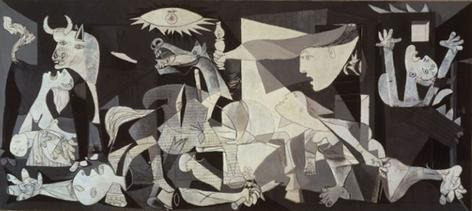
While both of these pieces are inspired by the horrors of the same bombing of Guernica, the aesthetic emotions evoked by each piece happen in different ways over different lengths of time for the audiences. Thus significant form can be applied across the full range of artistic expression be it visual, auditory, or written.
0 notes
Note
Is it just me or isn’t the similarities and differences that Cillian is INTJ (like Petyr), and Aidan is likely INFJ. They share similarities on surface level. INXJ. But they have different cognitive functions. INTJ has Te and Fi meaning they know what they value and their own morals and they’re good at expressing it and doing theoretical analysis. INFJ got Fe and Ti. Always attuned to other people, and they understand things by facts and logic. They may have a harder time expressing how they’re thinking, because they have so many possibilities in their heads. INTJ know what they value and that’s why INTJ are more likely to be grey characters whilst INFJ can, but are more likely to be idealists and dreamers. They’re very different, and INFJs are good at spotting details. But they’re similar compared to other types of people. Both types are the two most uncommon MBTIs. When they say rare it’s still like 1%. So on the globe there will be many. But then again, these are often self proclaimed MBTIs not all will actually be INFJ or INTJ. Aidan hasn’t taken the test I believe, but no other type can fully explain the way he functions and work. It’s why he’s so good at stepping into others shoes, whilst still having a full analytical understanding of them. INFJ and INTJ are both analytical types. But one if analytical in their ideas and often more coloured by their and others feelings and values. INTJ doesn’t care much about others feelings per se, only if they’ve attuned such a moral value into their own values. They make objective analysis better, and are better at expressing it (or want to, because they like to be clever). Hence I think, why you like many, could prefer Aidan over Petyr. Both are complex, both are smart. But one will serve himself, and only if the INTJ values you too, will he be very, very devoted to you (but Petyr was ready to let Sansa go through quite a lot even if he loved her, in his own way)
I didn't answer this right away because I had so many posts about this whole INFJ thing and I don't like to clog my blog with too much of the same thing and nothing different in between. Well, when it comes to texts posts anyway.
I'm not going to assume that Aidan is an INFJ. I'm not going to assume anyone's anything. To be perfectly honest with you, I doubt Aidan would care enough to bother taking the test.
I myself don't put too much stock into this stuff. My sister took the same test I took but she took it twice but spread out over time, it wasn't back to back. But anyway, she got two different results.
I mean, it's cool and it's fun and all, but I don't think we can base all of our assumptions of someone around a personality test.
As far as my preferences, I prefer Aidan over Petyr because Aidan is a real person and I don't think he would push me out a moon door or have me poisoned. To be honest I relate very much to Petyr. I'm a highly manipulative individual and I'm incredibly good at it. I just don't use it on people I care about anymore. I'm only affectionate with people I'm very, very close to. Some people think I'm kind of cold.
And as far as Cillian Murphy goes, I don't like his vibe and I don't like his face. His face really, really puts me off.
1 note
·
View note
Text
there’s a couple things that don’t sit right with me about this, but my thoughts are fairly scattered
for one, i think the conditions in a restaurant or other business could be bad enough that it would be unethical to be a customer and in that case, arguments about depriving the workers of pay by not being a customer would feel absurd (the complement to this being the conditions of labour for most prostitutes being that bad, which could be argued over, but merely establishing the principle here)
and for two, i don’t know if coercive labour and coercive sex are the same level of unethical, and would tend towards thinking they are not—i think if your boss forced you to do some labour task outside your role or beyond your hours without or any number of such situations, that would be bad, but everyone agrees the sexual version of that would be much worse, same with sexual harassment usually being worse than equivalent non-sexual harassment, etc
even at the extremes, even if forced to do labour, which is usually considered very bad, a form of slavery, at the lower time scale, they’re not considered equally bad at all—cf. being forced to do labour for a day vs any sexual equivalent, the disparity growing more severe the shorter the time period.
in many (to most depending on your framework) cases labour is coercive and applying the same analysis to prostitutes as other workers doesn’t change that
so in that sense, johns are purchasing coerced sex and the word we usually use for coerced sex is usually rape—there isn’t quite the equivalent for other labour bc we do not make a clear distinction for coerced labour (arguably bc it is very common, bordering on the norm)
i would be interested in seeing ways the needle can be threaded but it does seem like a clash between certain norms—like the sex positive-ish idea that sex is just another activity like rock climbing and sex work is just another job like dishwashing is tricky bc like pressuring your friend into rock climbing is shitty but it’s definitely not a crime and prob not even like an end to the friendship the same way something like cheating would be,
don’t want to get to into the grass with it, but like if we’re treating labour interchangeably, does that apply to agreements with your flatmates? generally considered fair to make your flatmates pitch in equal work to maintain the household and often do various types of labour that exist in paid forms, your (not like exclusively yours, the flatmate, possessively, but like the category? i think the category of words is what’s being possessed?) housecleaning and dishwashing and potentially meal-prep etc and what are the limitations of that framework in a context where sex work is interchangeable / equivalent to other forms of labour (tbh this last point is not particular important or anything, merely thoughts that occurred to me while making this post, i warned of the scatteredness of my response—)
radfems are mostly wrong bc you can’t apply class struggle analysis to sex/gender (kinda same thing, both ~fake, centring gender/sex distinction was a mistake) but i can’t get behind this pro-sex work (not merely pro-sex worker) sentiment that i see floating around, it’s not even a libfem thing either—usually also comes with this really offputting uwufication of johns too
also i’m coming around on sex worker just being a terrible term to be mainstreamed, the prevalence of the certain class of sex worker online completely distorts and collapses the relevant distinctions between someone selling niche fetishbait pics online and prostitution
also I have no idea why anyone would object to criticisms of johns bc they’re ’half the job’??? criticising the consumer isn’t anti-worker?
#there’s def a strong version and a moderate version of this position and I don’t quite know where I stand on it#certainly I’m more sympathetic to the strong version in response to normalisation campaigns—rightly or wrongly
21 notes
·
View notes
Text
Why is Weird Route so Weird? (DeltaRune spoilers)
So here’s my thoughts on why Chapter 2's Weird / Snowgrave route exists (on a meta level) and why it in some ways feels even more upsetting than UT’s equivalent. Spoilers under the cut, obviously.
(For those who don't know what this route is, here's the breakdown. Yes it's all real, I've played through it myself.)
In UnderTale, there are little hints that suggest the player isn't Frisk, or Chara. Post-paci, Flowey tells you to let Frisk live their life. At the end of No Mercy run, Chara speaks to you, asking why you want to bring back the world after *you* destroyed it, and, if it's your second run of this type, why you'd then destroy it again. "I cannot understand these feelings anymore."
DeltaRune seems to be taking this idea of the player being a separate entity from the character you control and expanding it by making it the focus of Kris's story. Noelle at the end of Weird Route, in fact, makes it very clear that the voice Kris used to command her to do bad things didn't sound like their voice at all.
That's not my main point here, though. My main point is that, where DR as a whole is expanding on that aspect of UT, giving a different perspective that more so focuses on the horror of being controlled by an outside entity, and which clarifies that the human being controlled in these games is, in fact, their own person...
The Weird route is an expansion and alternate perspective on the No Mercy route, highlighting an aspect of it that many fans - Chara demonizers in particular - seem to miss: the corrupting effect we have on the character being controlled.
In UT's No Mercy route, we see Frisk/Chara become more aggressive, we hear from other characters that they're emoting even less than usual, and the narration becomes much more cynical, dry, and focused on the task at hand. We are teaching Chara that they were brought back for power's sake, that it has been kill or be killed all along, and that there's nothing in this world worth saving.
However, the route's focus is generally more on the destruction and hurt you're causing to the Underground. Frisk as a presence basically disappears, and Chara doesn't confront you about what you've done to them until the end - and by that point, they're fully on your side (as long as you agree to finish what you started). The main source of horror and angst is seeing the towns empty, the monsters' responses to this ongoing tragedy, their futile attempts to stop you, the "but nobody came"s. Hell, you literally get a counter for how many monsters you have left to kill in each area.
It's different in DeltaRune's Weird Route. There's still some of that brand of angst; enemies running away from you after a certain point, and their frozen bodies remaining on the map. But you're never made to kill any characters you're attached to in the same way as UT's bosses (unless you're a big Berdly fan, I guess, and that's still just 1), and you don't see any of the Darkners reacting to the loss of their friends and family. The cars in the streets disappear, but it's not quite the same as seeing Snowdin Town abandoned.
The focus has shifted, from the way you're ruining the world at large by killing, to the way you're corrupting, ruining, the character doing the killing.
But how do you make that focus clear, when Kris's emotions and will are already so suppressed by the player?
You bring in another character under your command, who's even more hesitant to fight than Ralsei. And you break her.
You teach her that it's okay to use whatever methods to get what you want. You teach her to see everyone else as just enemies to cut down. You teach her that getting stronger is the most important thing.
And Kris changes too in this run - you're only able to push Noelle so far (after the first few murders) because crueler dialogue options come up for them, and Susie can tell when they reunite that something's off. But the focus is on Noelle, because it's a lot easier to see how horrible it is when it happens to her. To a character you can't write off as just a mold for you to pour yourself into, or as the embodiment of your own desire for power.
TL:DR;
In UnderTale, you primarily feel bad for killing your friends, and for being a murderer.
In DeltaRune, you primarily feel bad for making someone else a worse person, and for using them (still to kill people).
And if you see how horrible it is to do that to a person - a kid ("teens are just bigger children") - who never asked for it in DeltaRune...
Consider turning that lens of analysis back on UnderTale proper.
Don't forget about Frisk and Chara. Don't forget what you did to them.
P.S. - Some more factors which don't really fit into the rest of this analysis:
UnderTale is a fantasy game through and through. DeltaRune has a clear divide between its fantasy world and the "normal" world. It's one thing to fight, even freeze, all these fantasy creatures. It's another thing when the consequences come home to roost in the real world.
Chapter 1 is set up to make us think a route like this wouldn't be possible. And even in Chapter 2, fighting enemies normally isn't enough to trigger a significantly worse ending. It can only happen because you go against the script (the whole thing starts with you backtracking to Spamton's shop, after all) and make both Kris and Noelle act so out of character.
and a few more points for good measure from @bananonbinary
#deltarune#undertale#deltarune chapter 2#deltarune spoilers#deltarune snowgrave route#deltarune weird route#kris dreemurr#noelle holiday#really curious to see how this carries forward into future chapters#my guess is you'll be corrupting other characters in a similar way and getting more of them...#'stuck in the dark world'. let's put it that way.#anytime time to get back to fighting the fucker keeping me from actually seeing the ending
570 notes
·
View notes
Text
My Thoughts On The “Discourse”
Lately, I’ve been seeing a lot of accusations of NuraMago having “problematic content” in regards to the ages of characters, and I just wanted to make one big post addressing all the arguments with one fell swoop.
Of course the real answer here is that it doesn’t matter that much morally because it’s fiction, but that’s the boring response. I want to engage these people on the same level and address their actual arguments, so as to not let one of my favorite series get slandered and misrepresented without proper analysis being done on it.
The first thing to bring up, is Nurarihyon marrying Youhime when she was 15, and Rihan marrying Wakana when she was around 17 (guess it runs in the family). These are, I will admit, kind of weird. With Wakana it’s not QUITE as bad, but Youhime’s case is pretty clear-cut. Considering the time period, I think it makes sense for the author to have written it that way (in that same arc, her own father was getting ready to sell her into prostitution, so this was just kind of a thing back then), but for Nurarihyon as a character it’s definitely not a great look.
Next, onto Setsura and Rihan. While there’s not any definitive proof that Setsura loves Rihan in the same way she loves Nurarihyon, there are certainly a lot of details that suggest it to be the case, and the rest of this post will be operating under that assumption (that’s a topic for another time). Essentially, Setsura helped raise Rihan when he was a child, he developed a crush on her, he grew up and she (presumably) started liking him back, but by this point it was already too late, his feelings had changed and he ended up marrying Otome instead. This is a deeply unfortunate situation, but what it definitely isn’t, is grooming. That’s not what that term means, and would imply Setsura was psychologically priming Rihan to be more susceptible to her or some insidious shit like that. No, she was just raising him normally, he thought he liked her for a while, and then he grew out of it, that’s all that happened.
And finally we arrive at the thing people actually care about, the real meat of this discourse, Rikuo x Tsurara. There are two main arguments used here to invalidate their relationship, that Tsurara groomed Rikuo, and that Tsurara is an adult while Rikuo is a child. For the first one, it’s basically the Setsura and Rihan example all over again, except Rikuo’s crush didn’t happen immediately, it seems to have taken a while to form and didn’t fade away like Rihan’s. Those specifics aside, the same logic as before applies here.
The second point, however, is more complicated. On the matter of Tsurara’s age, we know she was probably a few years old when she arrived at the Nura Clan, ten years went by, and then she wrote a letter back to her mother, at a point after Rikuo’s birth but before Rihan’s death. This could only have taken place from 1997 to 2002, meaning she arrived at the clan anywhere between 1987 and 1992, and was born even earlier than that. This would mean that by 2011 (the end of the series), she had been with the clan anywhere from 18 to 24 years, so unless Yuki-Onna have their own weird system of aging, she would most definitely be an adult, just a petite adult.
Rikuo, meanwhile, seems to exist in a paradox; on one hand, his human form looks like a kid and goes to middle school, while his youkai form looks and acts just like his father and grandfather in their primes, and is in every imaginable sense coded as an adult. Coupled with the fact that the youkai age of adulthood is said to be 13, it can be hard to make heads or tails of this. The most intuitive explanation I can think of is that his youkai form is an adult and his human form is a child, which is kind of supported by how his two states are portrayed as not merely transformations of the same person (like when his bodyguards take on human disguises at school), but separate personalities within himself who can interact with each other, as shown during the Tsurara sakazuki scene.
To add to this confusion, in extra chapter chapter 210.2 (best chapter ever, if you know you know) there’s a scene where Kana, Yura, Tsurara, and Kejourou are all suggested as possible brides for Rikuo in the near future. The fact that 13 year-old schoolgirls can be put next to centuries-old youkai women in this context without anyone batting an eye suggests to me that Rikuo is in fact considered both a kid and an adult, or rather, it switches depending on his form. (A 13 year-old human Rikuo marrying another 13 year-old would admittedly still be kind of strange, though…)
So, it would be fine for Kana or Yura to be with his human form, and then for Tsurara or Kejourou to be with his youkai form, I guess? That’s some ammunition for the people who support a harem ending, if nothing else.
Whether this makes the situation better or worse is up for you to decide, perhaps in the act of defending the series I actually made it look worse in some of your eyes, but eh, shit happens. My goal wasn’t to blindly defend it but rather to look at the evidence fairly and try to sort things out as best I could, so do with this information what you will. This has been your host Stratovariant, the worst Nura fan ever, and thank you for coming to my TED talk.
#nurarihyon no mago#nuramago#nura rise of the yokai clan#nura rikuo#tsurara#rikutsura#fandom discourse
42 notes
·
View notes
Text
The infinite “who’s most powerful Kunoichi” debate and the sexist erasure/degradation of female characters
This is not a post I write to be completely serious -or well, serious in the sense that I truly believe what I’ll say here, but not in the fact that this is meant to be taken as an in-depth analysis.
It’s quite usual for me to find (without even looking, since I’m not particularly interested in participating in these types of discussions) a variant of the debate I introduced in the title. This subject arises particularly from the Sakura Haruno fandom, who often (and I mean, seriously often) introduces this question as to receive a very specific answer -I shouldn’t need to say which result they’re looking for since it’s rather obvious.
And again, this is not to diminish Sakura’s merits (an affirmation I need to do often since most of the time I express disagreement with their conclusion I get labeled as a “hater”) -but her achievements are often blown out of proportion for the sake of putting her in the same level of growth as both her male counterparts.
[Notice how the debate is always limited to the female spectrum, not only because Sakura would be pushed rather down on the list should men be allowed to participate; meaning, there’s a clear intention of making her achieve a higher position when shortening the field, but also because Sakura (or rather, her fans) need her to be the best female choice -and yes, their internalized sexism is the main reason].
We can't oversee the fact that many of these stans are also people who fall into the category of the "self-inserts" type of fandom that Sakura's character possesses; hence it isn't solely about putting their favorite character in the top position, but themselves as well. The thing is, while I don’t disagree that Sakura is -in fact- a rather capable kunoichi, I don’t truly understand where her superiority comes from, so I shall try to break this down:
When it comes to power-comparison there’s a type of technique that gets particularly elevated above others: Physical strength (the type Sakura uses).
It’s likely that one of the main reasons why people hold this particular skill above the others is because it provokes (visible) physical trauma on the victims, while other techniques (such as genjutsu and some ninjutsu) are brushed off as uncomparable in the power-scale.
Seeing as Naruto manga made quite a spectacle of showing exactly how powerful a genjutsu can be and the relevance of intelligence-gathering skills and strategic thinking, the sudden degradation of those aspects in the kunoichi spectrum is rather telling of their bias; as canonically Ino won their match as she outsmarted Sakura and was forced to forfeit:
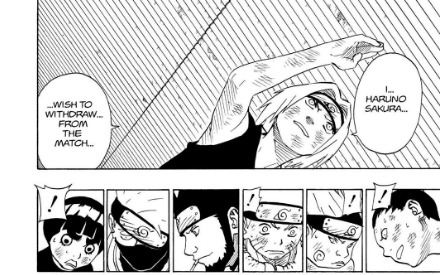
It can't also go unnoticed how popular her type of technique is in the western fandom (where most of her stans are from) -a characteristic that many famous superheroes that Hollywood introduced and perpetuated share, hence, the technique's relevance.
I know that “power” isn’t a synonym for “strong”, but these two concepts are quite often mixed giving Sakura a position in the power scale she does not possess.
There’re female characters that are often suspiciously absent or demoted (without the demoter presenting much -if any- evidence as to why would their favorite female character be able to surpass them) from such discussions, such as:
Mei Terumi: Mizukage who possesses not one, but two Kekkei Genkai (Lava Release and Boil Release), fought and intercepted multiple attacks from Madara Uchiha (while Tsunade herself wasn't able) who also complimented her.
Konan: She created paper manipulation ninjutsu and was able to force Obito to use Izanagi. Although I do believe it'll be a closer match between the two.
Chiyo: a woman who is a puppet master and a medic-nin, was able to create a Jutsu that brings back people from death (but dies in the process). She also has better reflexes than Sakura, despite the former being younger than her.
Kurotsuchi: Likely the strongest amongst them; possesses Lava-Release that she can transform into quicklime and stretch its corrosive range by combining it with Water Release.
It’s frequent to see these females being either ignored or downgraded for the purpose of highlighting Sakura's skills but none of them have to go anywhere near her in order to defeat her.
Sakura’s punches are effective as long as they make contact with the target, but her fans assume that because she’s a medic-nin she’s faster than any of them, despite them keeping up with powerful shinobi that not even Sakura could, such as Madara, Sasori, and Obito. To explain, medic-nins are taught to stay away from armed conflicts as they as medical support can't engage and get hurt, that's visible during Team 10 vs. Kakuzu and Hidan's fight, as Ino didn't engage during Chöji and Kakashi's fight as to keep a safe distance in case she was needed; this rule is not to be applied to those with the One thousand's strength seal (that Sakura canonically can't access until the War Arc) as they have three years of chakra storage to use to heal themselves should they need to. Again, they're told to stay far away from fights, not how to dodge as that has to do with the shinobi reflexes and overall speed.
As a personal note, since people might disagree, I think that none of the kunoichis inside the famous K-11 group are able to surpass or be equally strong as the “senior female characters” the manga introduces.
Besides the women I mentioned in the previous point, Tsunade is another victim of this practice -let’s remember: Sakura invented none of the techniques she uses, in that sense, Tsunade is far more useful in the grand scheme of things since she came up with Jutsus that compensated her “small” pool of chakra and was willing to pass on her knowledge. Furthermore, while -again- Sakura’s feats are not to be diminished, her fans consider she surpassed her mentor because she was able to:
a) Punch a God.
I’d like to add some things to this point: Sakura attacked Kaguya while she was distracted escaping both Naruto and Sasuke and by taking advantage of her blind spot. It’s still a feat -yet this context isn’t brought up.
Furthermore, I’ve literally read people diminishing Ino’s feat (to mention another K-11 kunoichi whose growth was shown during the War Arc) of connecting the entire Shinobi Alliance because “Naruto helped her with his chakra cloak, don’t try to reach”, yet Sakura punches Kaguya after receiving that help as well -why context matters in a case yet not in the other?
b) She had just achieved Bakugou and was able to summon Katsuyu and cure thousands.
She was able to do both because -again, she was taught by Tsunade, who invented and developed it (let’s remember that the technique allows both of them to store chakra and it’s the only reason why they were able to cure people with Katsuyu).
Sakura’s young age is often brought up, but are we forgetting that Tsunade (much older than Sakura and who used Creation Rebirth which shortens her life-span, hence why she needs to Henge herself as to appear younger) fought Madara, was cut in half, had enough chakra control to summon Katsuyu and cure four Kages and herself using the Bakugou seal that she replenished merely weeks after Pein’s invasion?
Of course, Sakura has “more time to improve her control” given her age, but people are assuming that because of her youth, she’ll undoubtedly reach that potential yet canonically, up until the last chapter of the manga, Tsunade is still quite superior.
Medical Ninjutsu and delicate chakra control
There’s a constant misconception in Naruto’s fandom about how Medical Ninjutsu works and the importance of Chakra control. Having delicate chakra control (delicate being the canon word used to describe Sakura’s control on her chakra flux) implies having control over a large sum of their own chakra in a small part of their body (palms) in order to release it either with their medical ninjutsu or, in the case of Sakura and Tsunade, their fighting technique (they don’t boost their physical energy, as they don’t use such control to run faster, for instance. Rather, they concentrate a large sum of their chakra on their fists and they release it upon contact).
This is canonically proven through the Byakugou seal, as both Tsunade and Sakura are able to save a total of three years of their chakra inside a small diamond-shaped seal that they need to release in order to use more energy-consuming jutsu: Mitochondrial Regeneration, summoning one-tenth of Katsuyu’s body, replenish people with larger chakra pools than them -like Obito or Onoki, and to have more powerful attacks.
“Chakra control” in the vast use of the term (nor “delicate” preceding it), has more to do with being able to withstand and use large sums of chakra, as Sasuke says “Naruto has control over this much chakra?” During their final fight –the more chakra the shinobi have, the more difficult to control and use it.
There’s a reason why Tsunade nor Sakura ever use complicated jutsu, as having delicate control over their chakra does not extend as much how many complicated techniques they can perform: To explain in lesser terms, the more complicated the jutsu, the more chakra it needs and neither Tsunade nor Sakura has a large pool as Sasuke or Naruto do. Their delicate control only means that they won’t waste any energy, as they can concentrate the required amount without wasting the rest; for instance, if a jutsu requires 80% of their energy, while the average shinobi will use at least 90% (wasting 10%), Sakura is able to delicately control her chakra to use only the 80% needed, while maintaining the 20% remaining. The primary difference between Naruto and Sakura is that, while a jutsu takes 80% of Sakura’s chakra, it takes, perhaps 10% (if he wastes a portion as he has less control over his energy) of Naruto’s, as he has immense reserves thanks to Kurama.
Speaking of K-11 kunoichis, Sakura is always elected as the “strongest one” amongst them.
And yes, I do believe that Ino -I’ll use her since she’s Sakura’s rival and who was shown the most- would have troubles defeating Sakura in a physical match, Sakura would have a hard time trying to connect mentally with anyone: so why the parameters to decide who’s the “strongest” (often used as “better”, hence this example) accommodates solely Sakura’s techniques? And before people argue this by stating that Ino’s Jutsu is a Hidden Technique whilst Sakura isn’t: Sakura learned that technique from Tsunade -it isn’t a fighting style universally/publicly known. Both skills need specific parameters in order to be learned: One, naturally perfect chakra control, the other, being born in the Yamanaka clan.
I am not stating with this that Ino would be able to defeat Sakura, yet the fight wouldn’t be as “easy” as people make it seem: Ino doesn’t need to actually damage Sakura’s body (so the Creation Rebirth she can perform in order to heal wouldn’t be a decisive factor), and two -like I said- physical strength isn’t always a deciding winner -hell, Sasuke and Naruto were able to fool Zabuza, who clearly outmatched them both.
"But Sakura canonically broke free from Ino's Jutsu, so she'll do it again".
While that affirmation it's true, it's to be noted that the Inner-Sakura that allowed her to break free is nowhere to be seen in Shippuden. But if we decided that such detail isn't reason enough to assume Sakura wouldn't be able to break free again -which, is a fair point; we need to keep canon consistency and also assume, since Ino canonically outsmarted Sakura, that she will do so again.
In addition, during the War Arc Ino controls the Six-tailed V.2 version of Kinkaku before he could injure Shikamaru and without his assistance, as he broke free from his Jutsu (and before she received Naruto's chakra cloak). This only solidifies the notion that being physically stronger than a Yamanaka (in this specific case) means nothing as they can defeat you with the Shintenshin regardless, as the technique's weakness relies elsewhere upon.
Now, and I do admit my own bias for the aforementioned kunoichi (yet, I do believe I'm fair in judgment), why haven't I spoken about the other two kunoichis in K-11? Well, to be honest, I believe that Sakura would have more chances with both of them: Tenten and Hinata's attacks rely on physical damage and Sakura is able to instantly heal from those. But it is fair to assume Tenten, given her range and general performance would be able to hold herself far better in a match against Naruto's heroine. However, Hinata's taijutsu style would allow her to put Sakura in a difficult position should she be fast enough to strike without getting punched, but Hinata (out of all the kunoichis) is probably the slowest.
Sakura is an asset as a ninja in specific situations in the same manner other female characters are important in their chosen field -trying to diminish their relevance/power solely to put Sakura above them is a practice that not only personally annoys me but that it’s quite useless. I wouldn’t trust Sakura to infiltrate a secret organization: She wasn’t trained/nor did possess any technique to do so.
Ino specializes in a field that has nothing to do with Sakura’s expertise, as while Sakura is a front-lines combater, Ino gathers intelligence. In a way (minus the fact that they’re medic-nin so their survival is imperative, but let’s forget this idea for the sake of this example), Ino is one of the few shinobi whose survival is necessary in order to fulfill a mission; simply put, teams like Ino-Shika-Chö, who specializes in information gathering, not only are told to obtain answers and secret information, but they must guarantee at least one survivor that can transmit such knowledge (and Ino, as the primary figure of intelligence gathering giving her jutsu, is likely the one in charge of such task).
By the way the teams are divided, there’re three aspects that matter for the village’s success: Fighters (Team 7), Information gatherers (Team 10), and Trackers (Team 8). Few shinobi can fulfill the three roles with expertise (Sasuke and perhaps, if we are very generous with the “information gathering” aspect of the matter, Naruto -specifically, Naruto when in Senjutsu Mode). Sakura lacks information gathering or tracker skills, as she has no knowledge on how to infiltrate nor has any skill to track; Ino has fewer techniques when it comes to fighting, yet knows infiltration jutsus and has sensing skills (how is she less important than Sakura when without her the shinobi alliance wouldn't ve been able to communicate?), while Hinata has almost no fighting skills (she does possess the Gentle Fist, but the fact that she doesn’t like fighting and during the War Arc was likely the weakest when attacking white zetsus, plus the canonization of her being a housewife in present times, makes her the least capable amongst them) nor information gathering knowledge, but her Byakugan’s capabilities surpass even Neji’s.
Funnily enough, Kaguya is often brought up to give the debate some “seriousness” -of course, Kaguya isn’t a kunoichi, so she’s basically mentioned when discussing the “strongest female character” in the general aspect-, they often put her in the first place (because, well, she’s a God and had to be literally defeated by the two strongest characters in the manga), only to quickly add Sakura in the second position (most of the time the potential mentioned in the point 3.b is an important factor when justifying such decision yet that kindness isn’t giving to the rest of the young female-cast).
Is it really that important to elevate a female character above others? The so-called sisterhood that they claim to have when discussing them suddenly flies out the window if it means elevating their favorite (it happens in other fandoms, as well, but Sakura’s is the one where I see it often), they even masquerade their true desire by pointing out some “good qualities” of the other women, yet it comes off as condescending since they still perform many of the points mentioned above.
There’s also a relatively constant occurrence in the pro-fandom of the most famous female characters (and no, I do not mean the usual use of pejorative terms like "misogynist" against those who do not match their perspectives, which is also very common); which is the naturalization of the argument "why is it difficult for you to accept that X character is inferior?" (of course I’m paraphrasing, but this line -or versions of this line- can be observed in many of their posts/comments).
This is often brought up with the sole purpose of diminishing the “anti”’s arguments against the pro-fan favorite character, or in favor of their chosen character, without committing to the debate and presenting true evidence of their claims (which, unlike those of the antis, are true until proven wrong and not the other way around). In lesser terms, they demand the performance of a specific attitude/introspection that they’re not willing to conduct themselves.
Summarizing, debating who's the "strongest" or "better" kunoichi is nonsensical without establishing in which context are we putting these female characters as to "measure" them, the 'default' setting they use for this discussion favors solely Sakura's techniques -yet she isn't even the “strongest” one in those given parameters.
My point in this case is not to diminish anyone’s capacities, but honestly, the “who’s the most powerful kunoichi” debate became boring and incredibly sexist these past few years, as not only they encompass the idea of “power” solely inside the “physically strongest” spectrum –reducing women’s value around how hard they can punch (when Naruto, even as a Shönen, is constantly reminding us about the importance of someone’s strategic intelligence and/or information gathering skills; if you don’t believe me, re-read the Chünin Exams Arc), while also flattening an interesting debate in order to obtain a single “correct” answer (and this I place the blame on a portion of a very toxic fandom).
Don’t get me wrong, Sakura is the “strongest” (on combat terms) kunoichi of the new-gen, yet to claim she’s the most “powerful”, in the wider sense of the word, it’s at least debatable.
#anti sakura#anti sakura haruno#anti sakura fandom#feminism#temari#ino yamanaka#tenten#tsunade senju#kushina uzumaki#anko#konan#mei terumi#hinata hyuga#chiyo#who’s strongest Kunoichi#sexism in the naruto fandom#not exactly a meta
232 notes
·
View notes
Note
I’d also toss in (not that you don’t know this lol) that there’s a nuance to Sirius too. As plenty of authors have acknowledged, he’s a complex character to begin with—we have a lot of information about his family and background in the text that give us as readers/writers of fic the opportunity to examine how having grown up in those circumstances would impact him, but he’s also…not a one-note character?
My take on things is this: You can think Sirius is ‘dramatic’ AND recognize that he was level-headed and logical in situations when the trio contacted him for adult advice. There are a number of ways to balance those two things where you don’t reduce his character to (as you out in your tags) “Drama Queen Sirius Black,” but instead point out that a person can still be logical and enjoy their dramatics in situations where stoicism isn’t necessitated, you know?
There’s also a lot to be said for the fact that our introduction to Sirius comes after over a decade in prison, which quite obviously has impacted him, as it would anyone. Even if he was more dramatic or reckless in his youth, there’s ample evidence in the books that in most situations where his actions are directly connected to Harry/Harry’s livelihood, he’s doing his best to be cautious and thoughtful. He wants to be a good godfather to Harry, even if his last experience doing so was when he was a 21-year-old (which is a totally different experience than it may have been if he’d had a full 12 years post 1981 to learn what full-time parenting looks like).
The quote you referenced is a good example there too—he spent every year from 22-34 in prison, it’s not as if he was given much of a chance to experience a normal sense of maturity and adult responsibility before he was imprisoned. Obviously there was a war going on, but he didn’t get to, say, tacitly do his taxes and complain about the government over his morning tea during that time. He was just…stuck.
We don’t get much about azkaban as a prison (beyond some of the obvious descriptors), so there’s no textual evidence to say that he couldn’t have been developing other skills while there or having meaningful conversations with other prisoners about the world outside, but at the end of the day, he was still stuck. Even if he was reading the Prophet every day, there’s a hell of a difference between reading about the world and engaging with it, and an even larger one between reading about major historical events and taking part in them.
I think that’s analysis of “he’s basically still a 22-year-old” is probably one of the better arguments for a sense of impulsivity, because that would definitely be an adjustment for anyone to make, but even STILL, we see so much evidence of him trying to be a reliable and responsible person for Harry that it seems like a bit of a character assassination to only ever say that he was dramatic.
: o
i love this!! i’m a sucker for people more articulate than me (which is,,,most everyone lmao) actually putting this into proper words. you’re absolutely right that enjoying dramatics doesn’t have to take away from logical thinking (after all, i don’t think anyone would deny that snape wasn’t one for the ~drama while also being very competent at the same time). i guess it’s just that i don’t see even that kind of penchant for it in sirius in the first place, but that could definitely be a me thing.
i have a lot of thoughts about him being ‘stuck’ in azkaban and the kind of effects that would have on a young adults psycho-social development, so yes, that part would probably give the best rationale for impulsive sirius which makes it all the more weirder that it’s never used. only the DoM fiasco, being in hogsmeade, and molly/hermione’s words are. i don’t know if this is my sirius apologism showing but i feel like even him being stuck as a 22yo isn’t fair, considering how much we actually see from him in terms of showing responsibility, conflict management and response to trauma, dealing with children etc, especially in gof. his caginess in ootp can be attributed to factors outside his maturity/impulsivity levels too imo.
ultimately, i think sirius did his best to overcome the barriers (both internal and external) he did have to fulfill his duties as godfather and a member of the order. i think both of us agree that was quite clearly shown as well, so i guess it makes it even more frustrating that it’s glossed over for the most caricature-like of characterisations for him.
#sbds#also!!#i’m sorry i have a terrible memory—what quote were u referring to?#idk how this came across but i agree with all ur points anon!!#just also adding my own (not sure if it’s biased or not) viewpoint#the bit about azkaban is the most fascinating to me#obviously it was only a minor thing in the books so it wasn’t elaborated more than necessary#but i wonder how it was built?#what the functioning and logistics of it were? did they have human interaction? outside time? was it always solitary confinement?#also i was reading sirius’ description of it in poa and it rly just made my respect for him increase so much#especially in contrast to how barty (and others) fared. sirius was super young too#its all just so murky and there’s so many gaps u can fill in on ur own#pen’s asks
35 notes
·
View notes
Text
SNS Dynamics - Sasuke's Perspective
Lengthy post ahead
On completing my rewatch of Naruto part I and part II, many things which never made sense started to make sense. One among them is the relationship between Naruto and Sasuke. I used to ask why Naruto is going so far for Sasuke. And why Sasuke is helping out Naruto even though he wants to kill him. And I used to think that Episode 478 was retconned to make the final battle ends in a draw and Sasuke somehow made to reconcile with the titular character. Yet, I instinctively felt, ‘Something is very different about them’. But on careful rewatch, all the clues which consolidate their relationship was there. The way they love each other is totally on a different level and the creator very carefully planned this from the beginning of the Manga.
Though I really don’t like the ending for making every characters into a child rearing machine at an age of 20 to make way for an abomination called ‘Boruto’, I still loved everything till Episode 479.
I wanted to discuss about both Naruto and Sasuke's perspective. But that cannot be accommodated in a single post. So, I decided to start with Sasuke. Since Naruto's side of SNS is very open and vocal, we clearly knew what is going on in his mind. But Sasuke's side is usually very subtle but much more intense than Naruto which makes it worth analyzing.
Before getting to that, for most of the characters in the Naruto universe (I mean 99%), Sasuke is a person who looks cool, aloof, rude, overbearing, blunt, genius and emotionless. And that’s the truth. Except for Itachi and Naruto. So when I say he is rude or arrogant, it is from the people’s POV. And since I always see myself in Itachi, I see Sasuke as that adorable innocent child who is very honest but forgiving.
I strongly feel that Sasuke has some innocent enchantment towards Naruto ever since he lost his family which later transcended into a bond which cannot be put under Friendship or Bromance. Enchantment, here I meant by, is not in a sexual way but more like the unconscious need to be in the presence of other person. Like walking beside each other eternally. Or even warming up next to a campfire near a chilly beach. You don’t want to fall into the fire but just enjoy the warmth. It maybe totally a platonic love like many claims to be. But his absolute disinterest in any other characters (even just as a friend) and the following traits he shows only to Naruto are clearly not just distinctive of platonic love either. It’s completely beyond platonic.
The following are the traits which Sasuke shows only towards Naruto, could have been avoided or delegated to other characters if the creator really wanted to assert their relationship as just friendship. There are lot of subtexts and emotions which I cannot accept it under the guise of bromance or friendship. It’s just not possible. If someone you like shows all these traits to another person, you should stop thinking about that person and move on.
The traits are :
Preferential Treatment
Attentive
Protective
My body moved on its own
One and Only
Powerful Eyes
Unconscious Closeness
Preferential Treatment
This is the very basic and first thing you show to someone whom you love. Meaning, I will treat this person much different from everyone else. When I was exploring this trait, I couldn’t stop laughing in many places. Because Sasuke is such a trolling machine who mercilessly trolls people who are in his way. He also inspire certain amount of fear which makes him even more unapproachable.
He has this cold bearing where people find it extremely difficult to manage or approach him. It comes off as very rude most of the times. One such example is Sai told Sasuke that he will get along better with him than Naruto. Sasuke put a Genjutsu on him for comparing himself with Naruto. LOL.
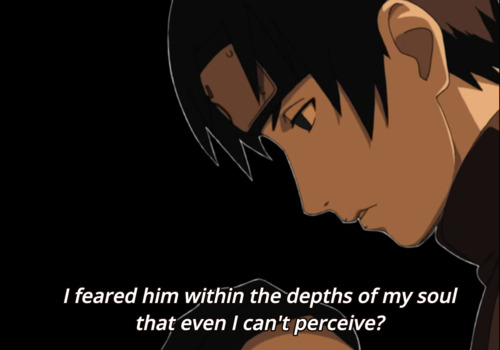
What's more funny is most people (Sakura, Orochimaru, Kabuto, Sai, Hinata) usually talk to him politely with honorifics like 'Sasuke-kun'. But he didn't give two shits about them and shitted them all mercilessly.
Here is the infamous proposal from Sakura in part 1.
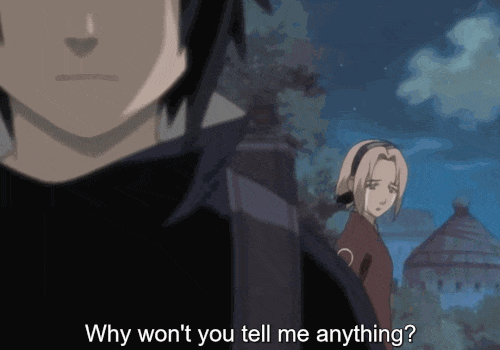
Well she deserved this one to be honest. Throughout the entire conversation Sasuke never saw her face and responded very bluntly even though she was pouring her heart out crying. There was no visible distress or sadness from Sasuke’s side.
Whereas with Naruto, in the final Valley of The End, we saw him turning towards Naruto and answer him properly when Naruto asked the same question of what Sakura asked. There were so many emotions throughout the battle and Sasuke’s pain of leaving Naruto was clearly shown. Which explains the difference of where Sasuke keeps Naruto in his heart.
The following is the one from Chunin Exams prelims where Sakura is begging for him to quit with tears. The response is an usual 'Stay out of my business'.

Me: Sasuke!!!! Even I don't know how to approach you!!!! I understand you don't like to talk unnecessarily so you just shitted on Sai. But Sakura is your teammate, isn't it?
And then there is this little orange blonde who literally trolls Sasuke.

I really thot Sasuke was going to trash Naruto too, like he could have easily said, 'Naruto, you should also stay out of my business'.
But then
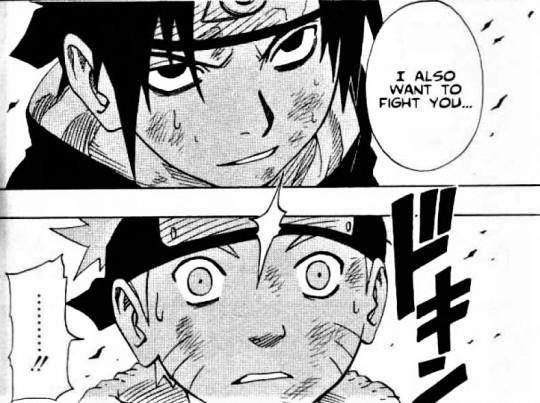
These words are something precious for Naruto. He wished for these words to come from Sasuke someday in his lifetime. But not at that time. And he was truly shocked and very excited. Believe me, when watching that scene, it was really great. But while making analysis like this, it’s absolutely hilarious.
This dynamics is similar to
Sakura: *cries unbearably* Sasuke-kun, I am worried about you. Don’t act so strong.
Sasuke: Shut up. Mind your own business.
Naruto: Bastard! She is worried about you.
Sasuke: Alright, I love you. Now shut up.
ROOOFFFFL :-D
I thought all these childhood bickers were over by part 1 and we will never see it in part 2.
Nope. I was wrong. Kakashi and Sakura were the scapegoats here.

Here's another round of applause from Naruto.
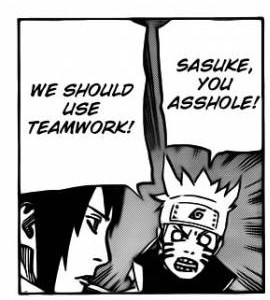
And I honestly cannot comprehend what was going on in Sasuke's mind and why he is really rude to Sakura and Kakashi. It seems he was really irritated by their presence or he maybe thinking they were useless or both.
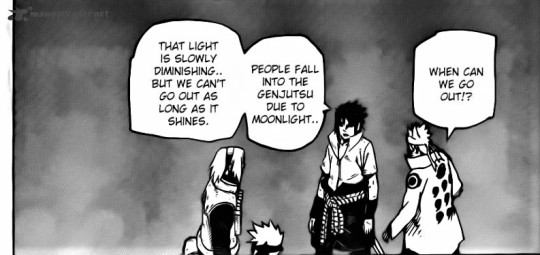
When Naruto asks him something, he responds without any insults. What baffles me most is that during Infinite Tsukuyomi, Sasuke wanted to kill Naruto for his Revolution and awaiting his fated battle. And yet he answers him properly.
Can you see the pattern here?
He shits on people asking some question even with an utmost polite attitude but when Naruto asks the same question he was like "Alright Sweetie, Am gonna answer anything you want and say anything you like".
The following is the beginning of everything where Naruto can't even swear properly but still Sasuke couldn't even bother.
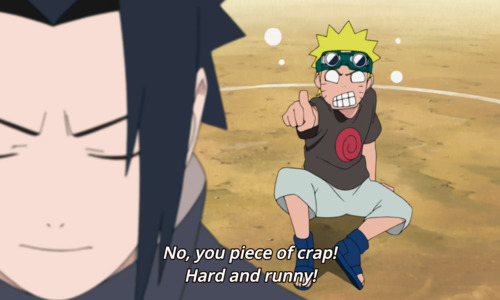
In short, the way he treats Naruto is quite different and hilarious when compared to the others. With his cold bearing, he absolutely has no need to put up with Naruto's outburst but he still accepts without a care every time. RIP to those souls who got the short end of the stick.
He must have an extreme tolerance towards Naruto's tirades to the point where he can never insult him back. And I also believe 100% that, nobody dares to make such frequent insults on Sasuke to his face except Naruto.
I know SK shippers jump in here to say Naruto is not the only one. But still the dynamics between Karin and Sasuke is simply a mirror image of Naruto and Sasuke, probably she reminded him of Naruto and hence made some exceptions for her because Sasuke never gives a damn about any other clan other than his own, but when Kabuto tells him Karin belongs to Uzumaki clan, he was shocked. I am pretty sure the only other Uzumaki member he knew is none other than Naruto.
Now, does this means he is in super love with Naruto? No.
But the way he treats every other characters and how he treats Naruto exclusively speaks volumes and this trope shouldn’t have existed in the first place. The creator should have made Sasuke treat both of his teammates equally which could’ve deflected the shipping angle.
Attentive
Am not talking about how attentively he analyzes his enemies in the battles. Of course, in that department, Sasuke flies high. This is about how attentive he is to Naruto to the point where he can deduce what Naruto thinks and how Naruto looks without the need to communicate with him.
I know Sasuke suspected Sakura was acting strange before Chunin Exams when she said 'Good Morning' with some hesitation. But the difference here is that Sasuke can identify Naruto without even talking to him.
Funny thing here is that Sasuke was sitting somewhere far behind from Naruto and yet he could pick up Naruto getting freaked out without seeing his face.
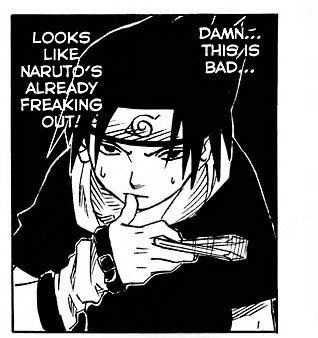
Who could forget about the famous ‘Where’s real Naruto?’ episode during Chunin Exams?. It would’ve been fine if this happened once. But the creator went ahead and made this thing happen twice under entirely different situations. And everytime Sasuke can find fake Naruto without fail. This scene conveys Sasuke is very observant towards Naruto’s appearance & fighting skills (the way he evades an attack).


Now, being attentive to someone is not a special thing which attributes to love. But considering Sasuke’s personality who is aloof and focused on his own world, knowing Naruto like the back of his hand is way too descriptive. Only someone who really understands the other person or constantly paying attention can find out such subtle changes. It doesn’t end here.

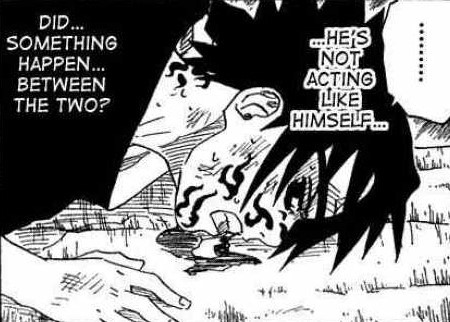
This is the battle between Gaara and Naruto. Where Naruto was literally confused about how to save his friends from Gaara who is much more powerful. And yet Sasuke can find Naruto’s mood just by seeing him.
Me: Yes, Sasuke!!! Gaara happened to pass by Naruto and forgot to kill him on a whim!!! So, Naruto is scared to the shit!!
Also Me: You guys always bicker with each other and are not best of friends. Sasuke!!! How could you analyze his mood just by looking at Naruto????
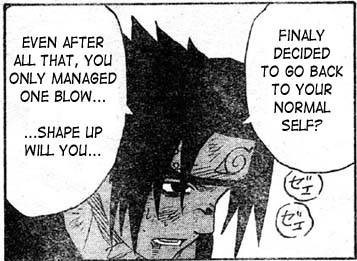
In Shippuden, There’s no inner monologue like the above, but whenever Naruto appears before him (Orochimaru’s hideout, Bridge, War arc), Sasuke gives his undivided attention to him. He even went so far as to advice him to pay attention to the battle. And I was like “Wait!!! you wanted to kill him... why pay attention to him at all? Geez”.
As much as you want to think that Sasuke doesn’t care about anyone, he does care about Naruto to the point where he doesn’t want him to be worried. How thoughtful just for a ‘teammate’.
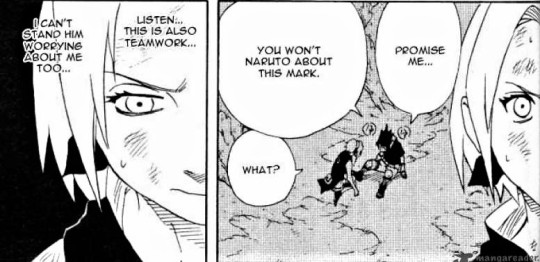
How did Sasuke knew that Naruto would worry about him?, I wonder.
But all these things started from this
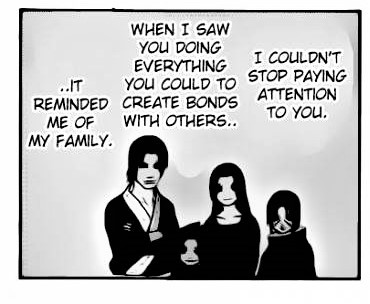
This boy has been noticing Naruto from way back when he was around 7 when he lost his family. Of course he would know every little things about Naruto because for some undefinable reason he couldn’t stop paying his attention to Naruto. A lineup of girls vying for his attention because of his cool appearance, whereas Sasuke simply loved Naruto without any reservations but because of his childish and warm personality which reminded him of his family.
‘I couldn’t stop paying attention to you’ and in some translations the words were ‘I couldn’t take my eyes off you’. Either way, these words are not for someone you see just as a friend let alone a brother.
Protectiveness
I can go on and on about how protective Sasuke is towards Naruto. I can write a separate post about it. This is the most important aspects of this ship which makes it sail higher than any other ships.
Of course, this is the Ninja world where people wants to protect each other and at the same time kill each other too. Sasuke protecting Naruto and Naruto protecting Sasuke is not too special. In fact, one of the weak and pathetic character like Sakura was saved once in every three episodes by Naruto or Kakashi or even by Sasuke sometimes.
And yet here I am mentioning protectiveness as the most important aspect of this ship. So what differentiates?
The way Sasuke protects Naruto is one of the intense thing I’ve ever seen. When I watch this series, I gained this immense ability to put myself in other characters mind just like Naruto. When I put myself in Sasuke’s mind whenever he tried to protect Naruto under different conditions, I simply cannot put their relationship under Friendship.
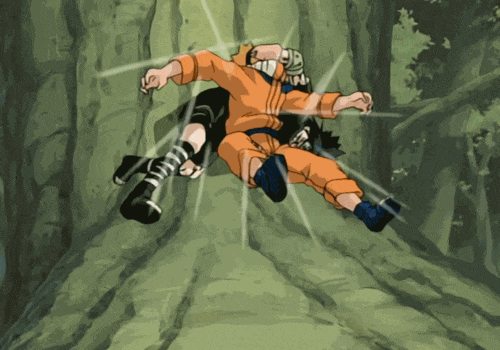
Here, Naruto is fighting Gaara in part 1 and Naruto was repelled by his own attack from the paper bomb. Sasuke being already battered by his curse mark bruise and he couldn’t move an inch. And yet he is shielding Naruto even though it is completely unnecessary because Naruto bumping into a tree log is completely normal. The creator even went under a lot of pain to draw that panel which took 40% of the page.
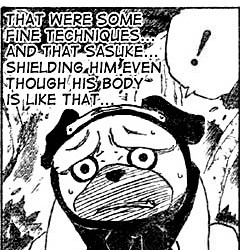
Now you may question, many characters even died protecting someone. What’s so special with just shielding?
Like Hinata jumping in for suicide before Pain, Iruka blocking Mizuki’s attack, Tsunade blocking Orochimaru, Neji dying as a ‘Love Cupid’ for hinata and Naruto.... I can cite many things here. What’s common among them all is that they were all perfectly capable of moving around and yet decided to save Naruto.
But that’s not the only point.
Is there any need for him to save Naruto? No.
Will Naruto die if he didn’t shield him? No.
Then why? He could have spent that energy trying to do something for Sakura rather than do a pointless shielding.
And then there is Kushina.
Naruto’s mom was already on the verge of dying as she had Kurama extracted from her body and Jinchuriki without a Tailed Beast will die. Because of Uzumaki clan’s strong life force, she could hold off for a bit longer. When kurama attacked Naruto, she shielded him with her body and saved her son from an imminent death.
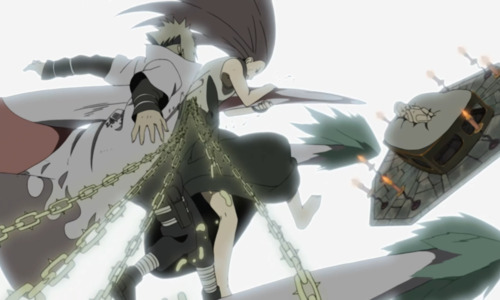
Even though Sasuke didn’t die shielding him, but there is a semblance.
Both protected Naruto even when their body condition is worse. That is, Protect at all cost attitude.
I intended to put Land of the Waves arc here as it is very similar to what happens with Kushina. But that’s for an upcoming section.
Now, as a Mother her instinct to protect Naruto is very strong.
But who is Naruto for Sasuke? What makes his instinct so strong to protect someone who is not even related by his blood? Until and unless you love that person dearly you won’t do it.
That brings me to the next thing.
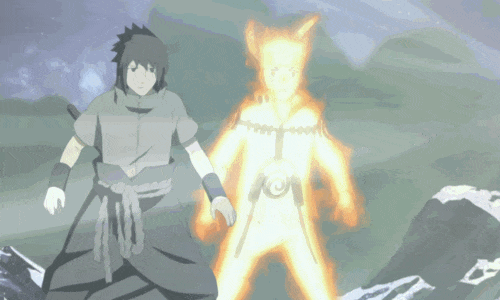
Yeah, it kind of looks ‘very friendly’ to give a 3 layered protection to someone who is already powered up like you and most importantly you want to kill him.(Can I say that looks really romantic?). Anyways my point is different.
What really happens here is this
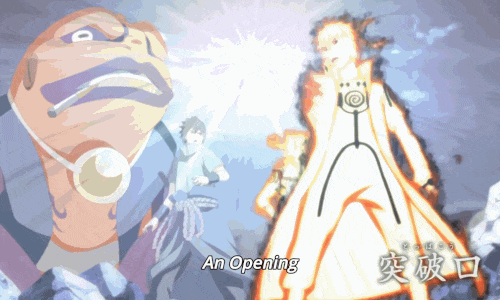
It is a well established fact that Minato, the Yellow Flash is the fastest shinobi in Narutoverse. It wasn’t surpassed yet. He uses the Hiraishin No Jutsu to teleport at the speed of light. It was invented by none other than Tobirama Senju who is the fastest shinobi of his time.
We basically have two fastest shinobi in the battlefield here. And Minato being the fastest among them, definitely don’t want to blow up near his son for whom he died protecting him once. He wanted to teleport somewhere away and before he could do it, Tobirama teleported the bomb back to Obito.
What many fails to notice here is that all these things are happening in mere seconds. But Sasuke realized it real quick as usual and protects Naruto in an instant. How fast his instinct you may ask? Quicker than the two fastest shinobi on the battlefield and one among them is Naruto’s dad.
What I want to say is Sasuke’s protective instinct is quicker than Naruto’s father and similar to Naruto’s mother.
And you know, I questioned myself during the Chunin Exams arc “I think in the Zabuza arc, Naruto conveniently happened to be near Sasuke, So he protected him at the cost of his life. What if Sakura happens to be there? Would he have done the same? Maybe he would’ve died protecting her too.”
But all of my questions were thrown into drain by Sasuke as if he was able to read my mind. The answer is “Hell! I don’t care if she died. That’s her loss. I will not die for her sake.”
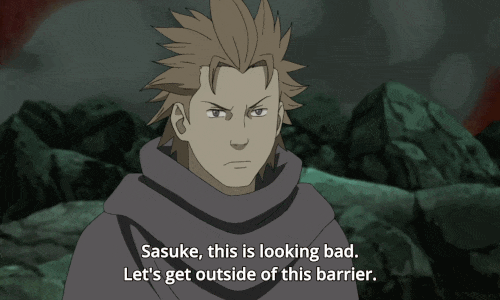
This is really confusing, hilarious and romantic at the same time.
Me: Sasuke!!! I understand why you want to save Jugo... Even though you abandoned him in the Land of Iron. LOL. What are you going to do with Naruto anyway when the whole world is blasted off?
He proved this again in the Kaguya’s Lava dimension too. Before you tell me that he saved Naruto because he needs him to seal off Kaguya, the previous scenario nullifies your argument.
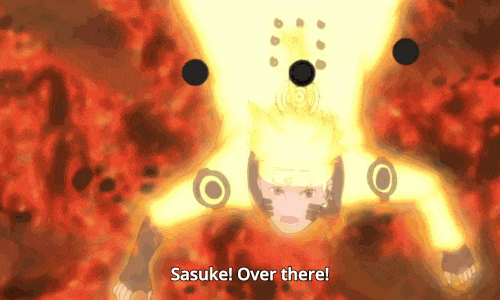
And SS wankers shamelessly defending that Sasuke don’t want Sakura to die by Kaguya’s hands, that’s why he left her to die. Geez!!! Who the hell is Sakura to Kaguya anyway? Even if she were to die by Kaguya’s hands, it would almost look like how Obito died. It’s not bad at all. But falling into the lava pit, burning, screaming.... sssshhhh. Wake the f**k up!!!
Now how can you convince me that this is just Friendship? What’s more funny is Sasuke wanted to kill Naruto later at some point. Throughout the War Arc I was always confused as to why Sasuke even care about Naruto at all? He didn’t care about him ever since he left him 3 or 4 years ago and he doesn’t have to. After all everyone have their own paths to walk on.
Even if I put myself in Sasuke’s mind and see Naruto just as a friend whom I want to kill, I wouldn’t go under so much pain to save him. I would feel like it’s better for him to die by something else rather than me. Because I can’t bring myself to kill someone I know well.
These scenes are not just put there by chance.
Such a strong reflex to protect someone is only possible when you consider that person’s life more than yours.
Does any other ship has such things to show? I’ll wait.
Yeah Sasuke protected Sakura from Orochimaru and Gaara. But he also went so far to wait for Karin and awakened a new power to protect her. So does this means he love those girls?? No. He was just showing a team camaraderie. But it’s funny that later, he tried to kill those girls knowing full well they are unprepared to fight him. While with Naruto, it always comes with a warning. Try to understand this difference. Which is exactly why I didn’t put Sasuke saving Naruto during his Chakra training, or falling from the waterfall and many more. Because they are just a team camaraderie.
I don’t even have to compare with other ships, did Sasuke ever protected anyone like this in the whole series?. These are the things which could’ve been avoided or handled in a different way, like there was no need to emphasize on saving Naruto alone while ignoring others.
My body moved on its own
I don’t need to explain this any deeper. There are many people who says Sasuke is incapable of showing his true feelings. He is cold, rude, aloof and stoic so he always hides his feelings for everyone (mostly this line was used by Sakura wankers who wanted to portray that Sasuke always loved Sakura deeply but never shows). But they fail to understand the irony that one of the most beautiful line in this entire series was told by none other than ‘Sasuke Uchiha’, “My body moved on its own”.
Yet I find Sasuke shows his honest and heartful emotions before the people he loves. If he can show that to Itachi and Naruto, why not with Sakura?
I know those wankers try to say Sasuke repressed all his feelings until Chapter 698, so he has some romantic feelings for Sakura too. Bullshit!!!
Even though he repressed those feelings in his mind, his body always betrays him in the end and his feelings pours out from time to time. That is what this section explores about.
Man, this is the most painful GIF I have ever made.
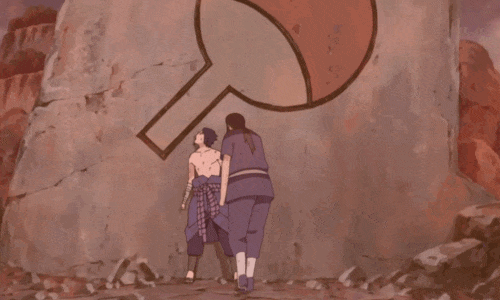
In his battle with Itachi, he was completely consumed by the feeling of revenge and hatred for his brother. But when Itachi approached him in his final moments with an intention (seemingly) to snatch his eyes, he still couldn't push Itachi away though he could have. Sasuke just looked into his eyes and let him do whatever he was about to do.
Why?, Because he loved his brother so much once that he don't know what to do but simply embrace that moment. These are the moments your mind says to close your eyes or even run away (he totally could have) but his body will not allow him to.
This is what I meant by your body betrays yourself. Even in your darkest moments, you cannot fake. You always show your true emotions towards the person you love. The more you suppress, the more it will burst out.
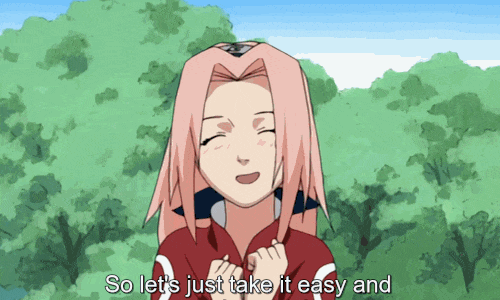
Here Sasuke’s hatred is glaring through his eyes because Sakura is persuading him to not do something he wants to (as always). His only motivation is to kill that man. His resolve is a real deal.
But in a matter of minutes after giving that long hateful speech with some heavy determination, when he saw that hungry blonde boy who was tied up for trying to steal food, Sasuke just acted on his own and served him food even though he was told not to which could jeopardize his career.

This bipolar dance is something to notice throughout the series and is always interesting to explore. When Sakura tries to dissuade Sasuke from something, he always retorts to insults or an angry stare. But when Naruto accidentally stands in Sasuke’s way, he always involuntarily helps him out.
In short, towards Sakura he was like “Even you cannot take that path away from me” but when turning towards Naruto, he was like “Well, I can risk everything for you at the cost of my path”.
This seals the real deal for SNS ship.

At this point, for us viewers, Naruto is just an orphan who has no friends but always carries his life with a positive spirit hoping that someday he will be accepted by everyone.
Unbeknownst the fact that he already has one person who was willing to die for him and putting all his dreams into fire.
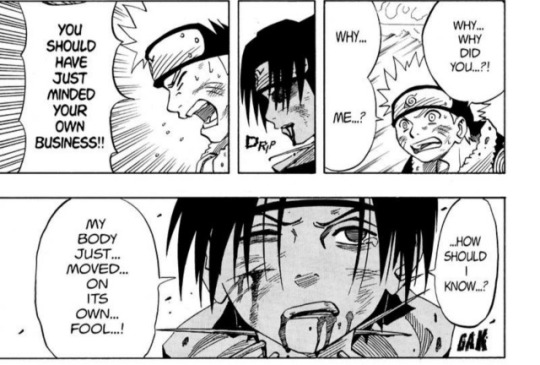
Important thing to notice, It’s entirely at Naruto’s fault for them being in this situation. If Naruto had used a bit of brain to attack from outside the mirror, they wouldn’t have been in this situation. But still Sasuke plunged into the trap without any regrets. That’s the beauty of this scene.
What’s more thrilling is that the creator told us Sasuke loved Naruto in the very next chapter itself.
How?

By making Haku jump before Zabuza knowing full well that he is going to die which is not very different from how Sasuke shielded Naruto.

And not only that, but by making Naruto say “He really loved you”. I got to say the creator may sucks at writing Sakura and Hinata for God only knows for whatever twisted reasons. But when it comes to male characters like Naruto, Sasuke, Itachi, Obito... he was just amazing and on another level.
How?
By indirectly drawing parallels between Sasuke and Haku in a matter of successive chapters.
By dropping indirect hints and crumbs like these to tell us, the audience, the motivations of the characters.
I always had the thought why did he risked his life for a boy who always fights with him? This became more emotional when we get to know the real reason for why Sasuke risked his life much later in chapter 698.

Having faced all the turbulent things in his life, somehow seeing Naruto doing all those childish stuffs made him feel relieved. That warmth was what he needed at that time. He wanted to escape from it but couldn’t. That’s why he embraced his warmth unknowingly in his Team 7 days by constantly reaching out to him starting from asking tips, concerned about having breakfast and training with him to climb the tree.
Sasuke even come to like Naruto more than himself and that’s why he was willing to die for him.
This feeling is definitely not a bromance or friendship. It’s an innocent enchantment you hope to last forever. Which again explains why he tolerated Naruto’s insults and hostility all those times. Because Sasuke knew those childish things were the ones he got attracted to him ever since his childhood. Rather than saying tolerated, I should use the term enjoyed. He really enjoyed those moments being bugged by Naruto for no reason.
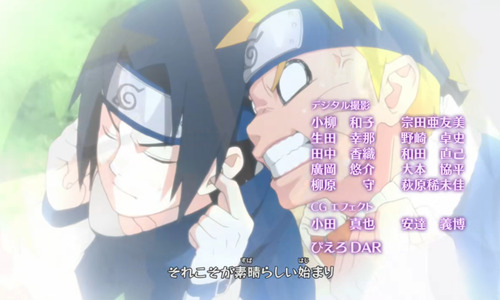
Because just like Itachi said to Sasuke once, ‘If you are excellent you become alienated and arrogant even though you were sought after at the beginning’ . But Naruto pestering him means he is very curious about Sasuke which no one else tried. He was adored by those girls for his coolness and revered by those boys for his excellence but nobody really tried to befriend him. But Naruto tried to befriend him through Rivalry. That’s why Sasuke unconsciously started to like him. This also explains why he roasted Sakura for badmouthing him even though Naruto attacked him and tied him up earlier.
If Sasuke can show all these feelings even though he was trying to suppress it towards Naruto and Itachi, Why can’t he show a single normal feeling towards Sakura??? Because there isn’t one. Except for an old Team 7 camaraderie where he saw her as an acquaintance and nothing more.
Many NH shippers claims, but Hinata loved her ‘Naruto-Kun’. She jumped in front of Naruto to save him from Pain, when in reality she just acted selfishly and couldn’t pull out the Chakra rods. Meaning she failed whatever she was about to do.
Another interesting thing to cite for NH shippers, they claim for Naruto, Hinata is the most important person his life. Since when? With that shitty movie called ‘The Last’ with shitty retconned stuff? In all the 699 chapters he always claimed Iruka Sensei and Sasuke were the important people in his life. And you know what? For Hinata to like Naruto, he has to jump in to save her from the bullies. But for Sasuke he just saved Naruto without any validation. He saw Naruto and liked his presence and just did it.
When you could accept that failed attempt as a love, why not accept Sasuke loves Naruto when in fact he succeeded in saving him and that too unconditionally?
This is one of the tropes which should have been avoided if the creator wanted Sasuke and Naruto to be just friends.
One and Only
This is something very special that is offered to that one person in his life. That is Naruto. Even Itachi knew it. That is the Power to influence Sasuke’s heart. This is the fact even Sasuke himself knew it and that’s why he wanted to kill him.
Now don’t compare this with the manipulation shit which Orochimaru and Obito were doing. It’s not that. Many Sasuke fanatics always blame Naruto that he is also manipulating Sasuke just like everyone. That’s totally wrong.
Manipulation is something you do by talking about some twisted facts and make the other person to do what you want to.
Naruto never did that. Ever. Whenever Naruto and Sasuke meet, they always talk about themselves and how they feel. Not the world, not Team 7 or anything. Which is exactly why Sasuke himself willingly left that space in his heart for Naruto when he left him in the Valley of the End which he badly wanted to destroy. Sasuke, of all people, know Naruto is also very honest.
Sasuke lost all his rationality when he went into darkness by stabbing Karin who was helping him in his battle with Danzo. She even replenished his chakra many times. He not only just stabbed her, after when he found her still alive, he decided to finish her off with his Chidori.
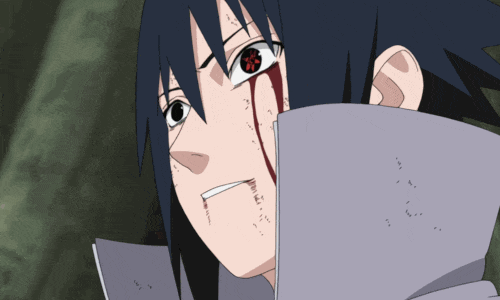
And then the pink haired bitch appears before him and started to concoct lies with malicious intent to kill him. This provoked Sasuke more and more to reach this point.
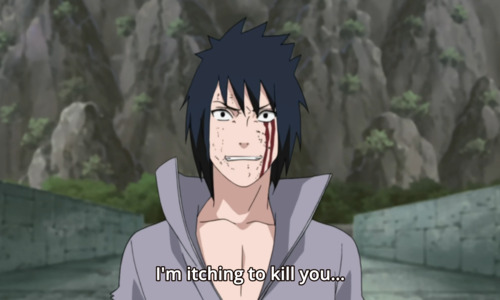
Believe me, when you are lost in darkness, all you need is a small light which can show you a path. Someone who can extend helping hands to lift you up with honesty.
Sakura, being a crass woman, riled up Sasuke further with full of nonsense.
If you want to picture the darkness,
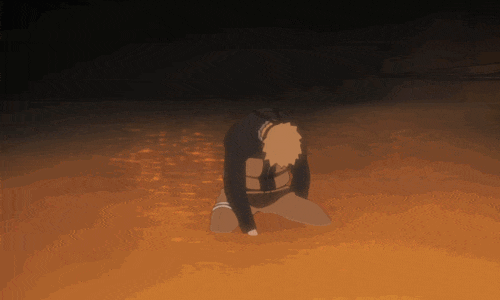
This is exactly how Sasuke feels. He is in so much pain and don’t know how to face it or deal with it. So he started to destroy everything he sees. For him Karin, Sakura, Kakashi are all just some pebbles in his way and want to trample them as he goes. His entire life has become farce after knowing his beloved brother’s real pain and miseries. Now he has no one left from his family.
Until Naruto appears.
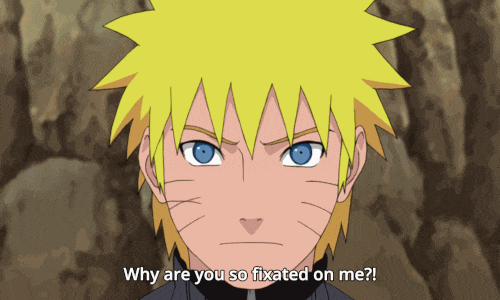
He may not be his family, but he is the only person left for him in this world. Which is established in many Naruto endings and even Sasuke himself accepts this with Sage of Six Paths.
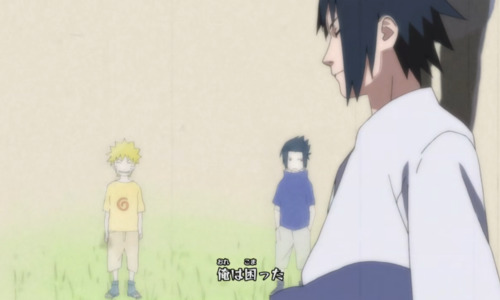
But my Cherry Blossom queen really loved Sasuke, she only wanted the good of him. My question is ‘Then why the fuck she tried to kill him? She looked at Sasuke and find that he changed. She didn’t even bothered to find out what’s going on from his side.’ Then how is this considered as wanting only good for him?
Surprisingly Sasuke calmed down a bit, the moment Naruto appears and even started to respond to him which he didn’t before with Kakashi and Sakura. Deep down Sasuke himself knew in his heart that the path he is going through is Self-destructive. Just like Kurama tells Naruto ‘Destroy everything you see’ in the Pain arc when he sprouted upto Eighth Tail, Sasuke’s traumatic mind tells him to ‘Destroy Konoha’.
All he needed was someone to extend an helping hand to tell him what to do without any malice. Naruto did that. Just like what Minato did for Naruto in Pain arc.
After clashing Rasengan with Chidori ,they meet inside the White bubble space and Naruto talks to Sasuke which evoked all his past memories which he never wanted to awaken.
That’s why Sasuke was visibly shaken with Naruto’s words. Because those were the words which mirrors exactly how Sasuke feels too. He was surprised and shocked that Naruto also felt the same way without him ever openly confessing those feelings.
When everyone tried to kill him for his monstrosity, Naruto is the only person standing there seeing him as his friend. Just like how Iruka saw Naruto way back in 1st chapter.
Believe me, even at the depth of darkness, when you see the person you love so much, you will stop and rationalize.
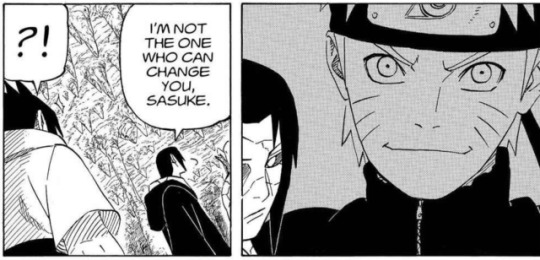
That is exactly why Itachi left Sasuke in Naruto’s hands. He even admitted to Sasuke that his words will not reach him no matter what.
Sasuke may not have abandoned his ambitions at that point. But Naruto gave him a clear path. That is ‘Show all your hatred on me’ and then do whatever you want.
I know SS shippers will claim that back hug from Sakura changed his murderous behaviour during the Chunin Exams. Yes. That’s true. But right after that, when Sasuke was fighting Yoroi in a one-on-one combat, his Cursed Seal flares up again. He retracted that seal out of his sheer will and thought about both Sakura and Naruto who was freaking out without even knowing about the seal. So, it’s not only a Sakura exclusive moment. The creator even went ahead and drawn a panel asking Sakura to not say anything about the Curse Mark to Naruto. Why do that?
As far as I understand, Sasuke saw Naruto and felt the warmth of his family. He singled that out in chapter 698. When Naruto was placed in the same team as him, he started to extend his good side to his other team members as well. But the moment he decided to leave the village, he severed the ties with Sakura (was there ever one apart from considering her as a teammate?) by saying Thank You. Meaning, you helped me many times so thanks for all of that. What’s more pitiful is, he didn’t even look at her face for the entire conversation except for saying ‘You are really annoying’. There is nowhere in the manga where Sasuke singled out Sakura for making him feel anything and did something for her exclusively. It’s all in the context of Team 7.
If Sakura is the most important person in Sasuke’s life, he should have stopped the rampage the moment he saw her but instead he got riled up more and more. Which explains where Sasuke kept her in his heart. Literally nowhere. He threw her into the trash. LOL.
If Hulk can calm down after seeing Betty Ross and you call that love, why not accept Sasuke loves Naruto??
Powerful Eyes
You know, Even in real life, Our eyes always reflects our true feelings, just like how your body betrays your mind , your eyes even betray your body.
Just like how Itachi could never fake his evil brother act in his final moments.
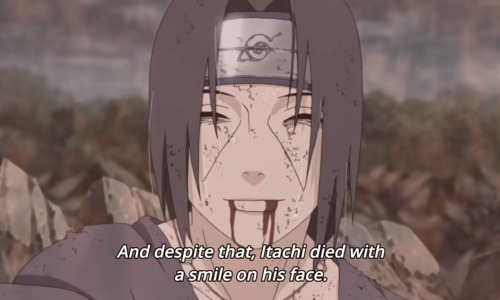
Just like how Sasuke couldn’t turn away from Itachi when he was approaching him to seemingly snatch his eyes.
Uchiha boys being a romantic bunch, always expose their awakening/ reawakening/ evolving their Sharingan in a most distressed situation. Just like Madara and Sasuke exposed their brimming eyes for Hashirama and Naruto. But in this department, Madara is wildly romantic as always. LOL. Despite losing 3 brothers, he awakened his Sharingan only when he was breaking up with his ‘friend’. And Sasuke, he reawakened / evolved Sharingan when trying to save / breaking up with his ‘friend’. Such a Biological defect!!!!
Poor Sakura pathetically fails in this department.
Anyways this part is not about Sharingan anyway. It’s about how such a powerful eyes becomes powerless before those Blue Eyes.
Eye Symbolism is something I really enjoy exploring in this ship.
Like I mentioned earlier, Sasuke has never shown his emotions atleast starting from Part II. He usually never shows any positive emotions like happiness, laughing, pouting, love, excitement (although he has shown all these towards Itachi and Naruto) and is known for negative emotions like anger, annoyance, hatred.
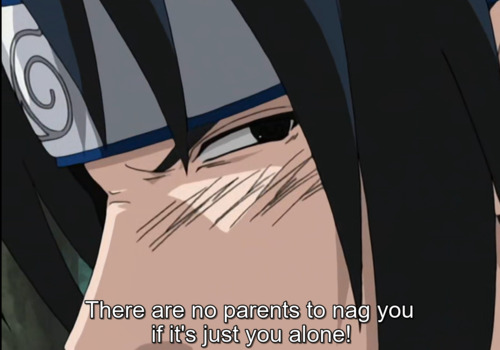
Look at how Sasuke is glaring with hatred for her insensitive words. She deserved this to be honest.
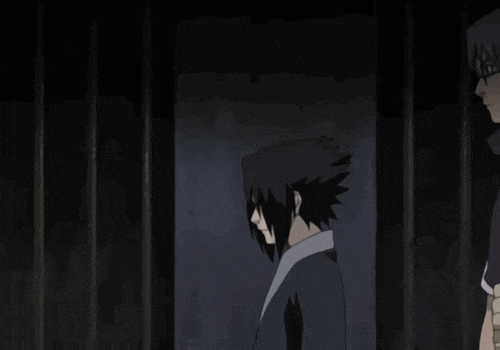
Now, is there any need to show your fury towards Kabuto?
Since the beginning of the Shippuden, some facts have been established strongly:
1. Sasuke has changed by leaps and bounds in terms of his attitude and hatred.

2. Sharingan is pretty dangerous. Many characters including kurama acknowledges it. Sasuke is very adept at using his Sharingan.

Orochimaru maybe right. But he doesn’t know the weakness. LOL
His hatred has reached to a point where he couldn’t think anything rationally and started to kill everyone, just like how Naruto kicked Sakura in his 4 Tailed Kyuubi Mode engulfed with the hatred of Kurama. Meaning, to reach his goal, Sasuke will kill anyone in his path without any hesitation. This shot is the representation of this.
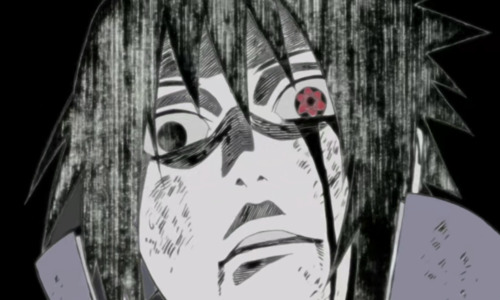
And yet when he saw those particular Blue eyes, he stops his rampage immediately and visibly shocked even. That’s the look of ‘why is that blue eyes here?’
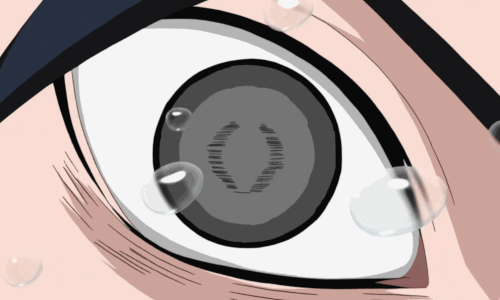
You have every right to accuse me that I am over exaggerating this scene. I am not. Even I wanted to think that way too that I am deluding myself. The creator has only consolidated my view pretty strongly.

There’s no need to emphasize on eyes at all. The anime team has went under so much pain to animate this scene in a satisfying and compelling way.
What’s more? The creator even went under further extent to draw a whole page in the manga focusing on their eye contact after the Rasengan vs Chidori clash. Meaning, Sasuke has calmed down visibly and became very easy to reason with.

Trust me, even in your darker / vulnerable moments, your eyes will reflect your true feelings to the person you love. You cannot be stubborn.
Now did it stop here?? Nope, it happened again in the Final Valley of the End battle too.
Sasuke is usually confident of his Sharingan (rightfully so) and likes to flaunt his eyes just like Madara. He was very sure that he was going to win.
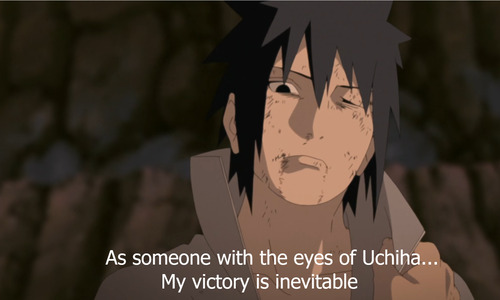
While Sasuke had a clear resolve to kill Naruto when he was showing his back, but the moment he comes close with those Blue Eyes, his heart even pounded strongly (in the anime), and lost the resolve completely which made his Sharingan retract itself unconsciously. Meaning, his eyes betrayed him.
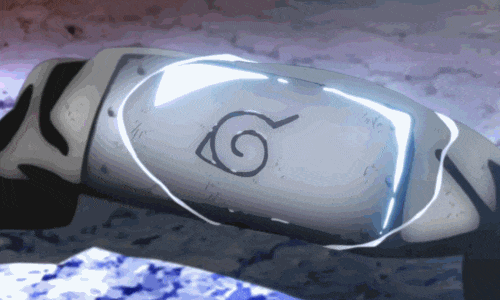
It’s funny that not even a minute ago he was very proud of his Visual Prowess as an Uchiha and his victory is inevitable but the moment he saw those Blue eyes, he just lost. You think I am again exaggerating?. Nope!!!
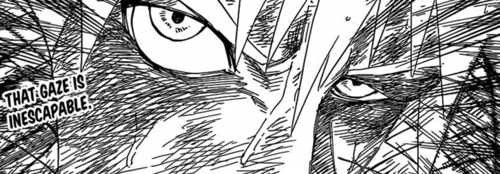
Oh Dear!!! This doesn’t get more romantic than this. An inescapable gaze from those blue eyes he loved all along.
Sasuke!! What happened to your proud Uchiha eyes?. You just stole Chakra from Naruto, isn’t it? Hints like these are really heartwarming, to be honest.
My entire point is, every character from every arc hypes up Sharingan starting from Zabuza, Haku, Rock Lee, Orochimaru, Kabuto, Kurama and many more, but why put a weakness for Naruto’s eyes?
What I really loved exploring is the way Sasuke totally expressed everything through his eyes in Episode 478.
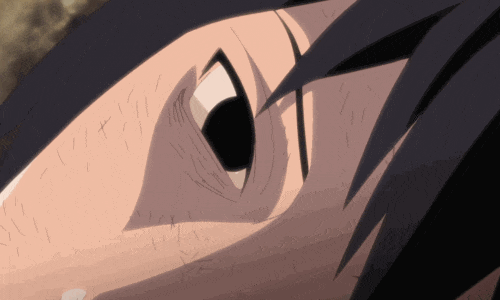
Sasuke shows his vulnerability towards Naruto with just his eyes. These are not something you show to everyone. Even when Itachi departed finally after releasing Edo Tensei, Sasuke looked sad, shocked and pained but didn’t cry. He accepted the reality of it. The last time when we saw him crying, it was after knowing the truth of Itachi, facing towards the beach and was weeping unbearably because there was no one else for him in this world. But this time, he is next to the person whom he feels truly loved and he doesn’t mind showing it with his eyes.
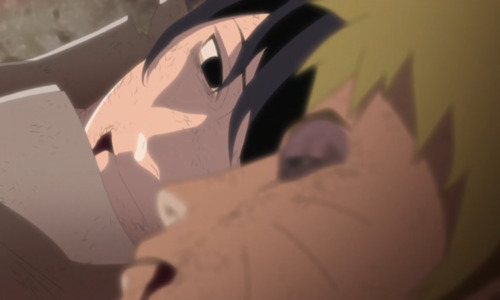
Well, on multiple rewatches, the clues for their love was already dropped in the 1st Valley of the End fight itself. Sasuke already lost his resolve to kill by balling his chidori fist rather than ramming through his chest. So the feelings inside the bubble are their honest emotions like always.
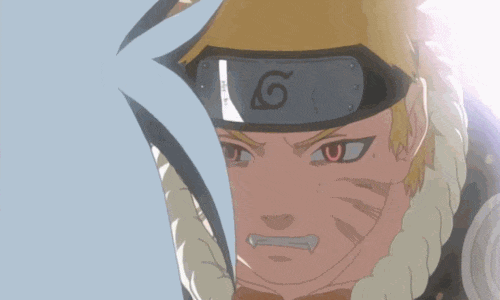
The pain on the verge of their separation inside the white bubble is clearly evident from their eyes even in their monstrous form. Even in the manga it was mentioned that ‘I can’t turn my back Vs I am not letting you go’
But what they really wanted to be from their childhood was this.
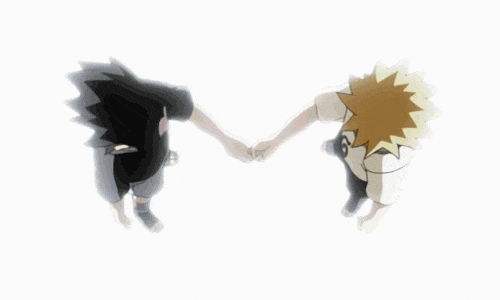
Look at Sasuke, how entranced he was on looking at that innocent boy. Now put yourself at Sasuke’s mind. Will you ever look at your friend like that??? Now, they are probably just 7 here, am not romanticizing. But Sasuke looks enthralled innocently.
But somehow, their paths separated them for who knows how long. But the pain in both their eyes is unbearable. Even the databook, mentioned that separating from Naruto is like ripping half of his body. Well, this proves it.
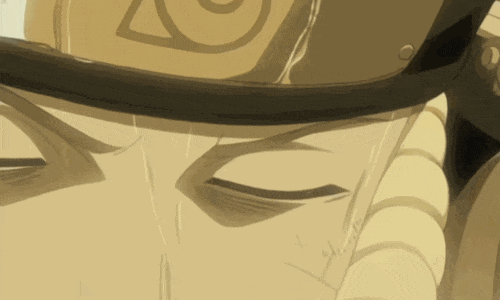
Now, if they really wanted to portray this as friendship, they never should have given Eye symbolism at all. They should have gone with ‘I was always jealous of you’ thing, like they portrayed in that filler episode 450.I would’ve gladly accepted it as friendship. Because that’s how friends behave when they are jealous and I wasn’t feeling any romance at all. There’s no need of that lengthy monologue on how he was always looking at Naruto and felt pain.
I am telling you, I won’t be looking at my friend like this.
Unconscious closeness
Remember, I’ve written in the beginning of the post that Sasuke enjoys the warmth from Naruto. Meaning, he likes that person’s presence unconsciously and want to be near him. Sasuke proved this many times.
This is the most intense and confusing section I have to dissect for this post. But it’s the most entertaining nonetheless, atleast for me.
Starting from the Land of the Waves arc, here Sasuke is speed walking to match up with Naruto.
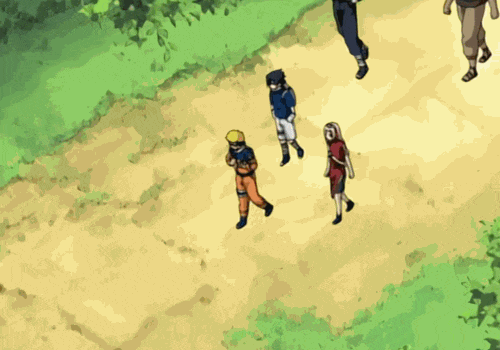
Initially I thought, he is trying to be competitive. But instead of walking ahead of Naruto to show who is faster, he just walks beside him. I find this really hilarious and adorable. This just shows Sasuke likes Naruto’s presence so much so that he wants to walk beside him.
Now many SS shippers tries to make this scene for themselves, when it is clearly not.
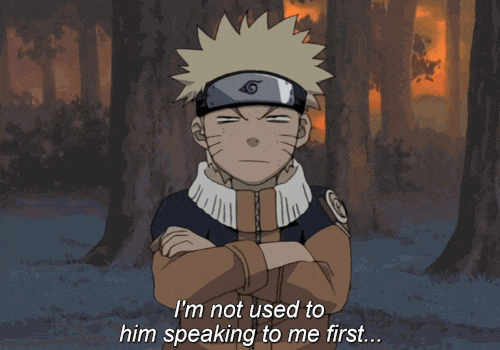
If you notice Sasuke in the Bell Training, he compares his strength difference with Kakashi and determines to get stronger. Same with Might Guy, he compares Might Guy’s speed with his own Sensei. Meaning, he respects people with strength. Naturally, he should’ve asked her and Sakura would have given him tips wholeheartedly. Because she really succeeded in that training.
Why bother to ask a deadlast?
The only reason I could find is that he wants to befriend him in his own stubborn way. But Poor Soul!!! He didn’t get the tips anyway. LOL. But despite getting the short end of the stick, he never hold it against him. Just like he never held anything against Naruto when he tied him up in Episode 3. All he did was just flaunt how he escaped.
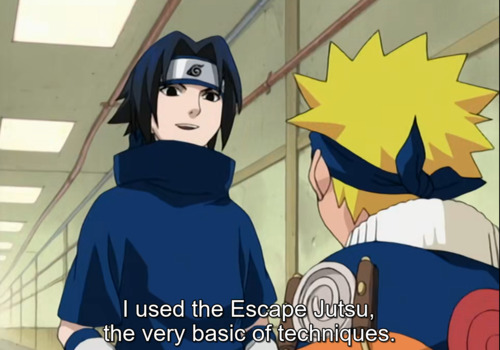
Pretty cool for a 12 year old kid. Because If I were Sasuke, I would hold it for sure.
Once again Sasuke proves how he can care Naruto in his own adorable way.
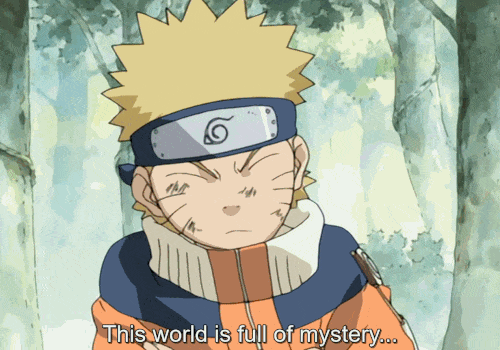
He could’ve said ‘I am going to train too” if he really intended to train. There is no need to say ‘Going for a Walk’ and ask Naruto about breakfast. This explains that Sasuke simply missed the boy’s prolonged absence and reached out to him in his own cute way.
Now all these doesn’t mean he was in love with him. It’s just a childish attraction which makes him act like that involuntarily.
I just added this GIF to compare with the next scene.
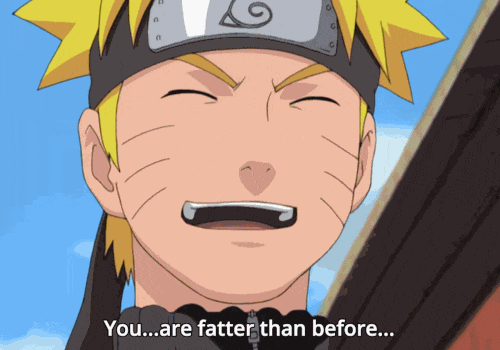
Now Shikamaru falling on Naruto in an unconventional way doesn’t look anywhere romantic. Instead it’s the opposite. They are pretty friendly here.
But Sasuke’s approach to Naruto does looks undeniably sensual and I couldn’t deny the sexual tension that brings with it. (Even when I watched it for the first time having no idea of shipping anyone, I lowkey got creeped and thought, ‘Sasuke!! What have you become? ’)
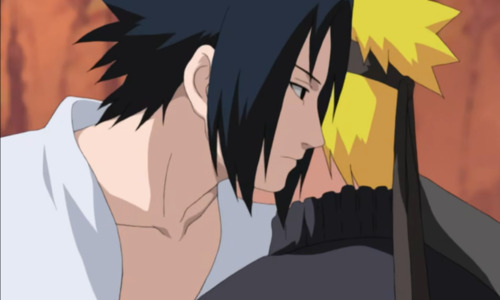
This scene is something even I can’t dissect. Because honestly I don’t know. Sasuke is a person who never appreciates physical touches nor does he initiates either.
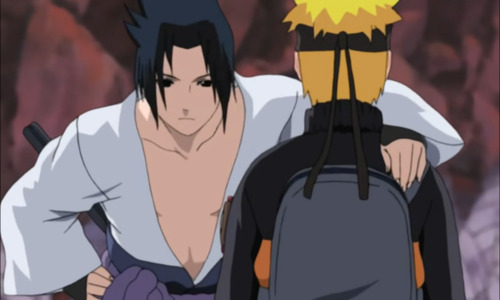
I get this crazy femme fatale vibe when seeing Sasuke with his sexy costume landing at a speed of lightning with his hands wrapped around Naruto and taunting near his ear about what was he doing there? The only reason I could think of is that maybe he missed him for 3 years which made him go unconsciously so close near Naruto. It’s also funny that he could’ve shoved his sword into Naruto’s heart before landing and no one could’ve batted an eyelid.
Damn you, Kishimoto!!! Is this scene absolutely necessary??? What are you trying to convey? Why do you give Sasuke, a sexualized aura?? I understand you love this character so much and you want this character to be desirable among women. Yeah, you succeeded by making Karin behave like a woman in heat, the moment they met. But instead of letting her get close to him, you made Sasuke to say ‘You... Don’t get so close’ whereas with Naruto, you made Sasuke to go willingly touch him in a half hugging stance. Geez!!!
Here comes the most interesting part in this section.
It may seem irrelevant at the beginning but trust me, it will make sense later.
Before that, I would like to appreciate the creator and especially the anime team to bring the battle sequence so lively and different in its own way. If you notice the purpose of every battle that happened in Naruto series, each carries it own meaning and deliberately distinguished. How you ask?
The fight between Deidara vs Sasuke.
Logically Deidara should be dead in the Gaara retrieval arc itself. There is no point for him to chase Sasuke who killed Orochimaru to whom Deidara had nothing to do with. It didn’t impact the story in any way. But the purpose of that battle is to show how far Sasuke has grown up in those 3 years. The way he can use his Sharingan to analyze his enemies abilities and weakness so quickly and take multiple steps ahead, the way he can use Genjutsu and other incredible jutsus in his arsenal were a visual treat.
Now, let’s analyze Sasuke’s arsenal of Jutsus. He can do Teleportation Jutsu, a decent Genjutsu, Chidori Senbon (needles), Raikiri (Chidori sword which ranges to 5 metres), Chidori Nagash (Chidori from his whole body), Transformation Jutsu, Substitution Jutsu Shuriken Jutsu with wire works, Kirin, Gokakyu No jutsu, Sword fighting, basic Hand-to-Hand fighting (I’ve never seen him do it ever since the Chunin Exams with Orochimaru), Archery fighting, Susanoo, Amaterasu and all the Rinnegan abilities.
Based on the jutsus he learned so far and how he applies in every battle, it all confirms two things:
Sasuke is a Medium-Long Range Shinobi
Sasuke’s battles are usually based on his Cleverness
Let’s go for Naruto. He can do Teleportation Jutsu, Sexy Jutsu, Harem no jutsu, Rasengan, Rasen Shuriken, Oodama Rasengan, Biju Dama, Tailed Beast Mode, Kage Bunshin No jutsu, Sage mode jutsu, Frog Kumite, Better Hand-to-Hand combat skills (better than Sasuke), Transformation Jutsu, Substitution Jutsu and all his Six path abilities.
Compared to Sasuke, Naruto’s jutsu variety is very less. But for every 4 punches from Sasuke equals 1 powerful punch from Naruto. Analyzing all of them,
Naruto is a Close-Range Shinobi except for his Rasen Shuriken
Naruto’s battles are usually based on his Jutsu Timing and Unpredictability
Now, Let’s rewind back to 3 years and look at the 1st Valley of the End battle. That battle was cleverly choreographed which carried very intense emotional baggage. Things we never knew about those boys until then were openly admitted and acknowledged. That is, for Sasuke, Naruto became his closest friend. For Naruto, he always wanted to be Sasuke’s friend way back when he was 6 or 7. For both, they already have some unexplainable bond by just looking at each other and smiling secretly.
The theme of that battle started as Am going on my own path vs I can’t allow you to tread on that dangerous path and ended up with I want to break our bond vs I don’t want to.

Now, this posture represents, Naruto is the one who pursues Sasuke to stop him from whatever he was about to do. Meaning, Naruto is the one who is constantly reaching out and Sasuke as usual kicks him out violently, that is he is pushing him away. That’s the essence of the whole battle.
Considering all the battles in the Naruto universe, I categorize them as follows:
Best Calculated (and emotional) battle - Itachi vs Sasuke
Best Hand-to-Hand combat - Kakashi vs Obito (what a fight it was!!!)
Best Mega Powered Up battle - Hashirama vs Madara
Best Emotional battle - Naruto vs Sasuke (1st valley of the end)
Best Unpredictable/Entertaining battle - Naruto vs Pain
Despite having all the potential to fulfill the above categories, The Final Valley of the End Battle never bested in any of them.
As analyzed before, the boys have grown up to greater heights. I expected a battle between Cleverness of Sasuke Vs Unpredictability of Naruto
But what I observed was something so intense. That is Unintentional closeness.
This battle symbolizes one thing: I am going to kill you to get lonely vs I won’t let you kill me because you will be alone.
Being a long range fighter, I expected Sasuke to go for this.
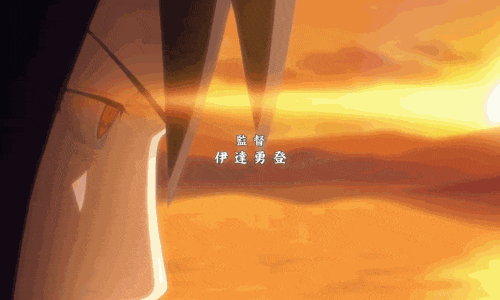
If you have to kill someone you love, it is best to keep your distance. Sasuke knows this full well when he battled with Itachi. Except for some Sword fighting, he maintained a certain distance to fight Itachi throughout, until the very end.
But when fighting Naruto, all I got was this.
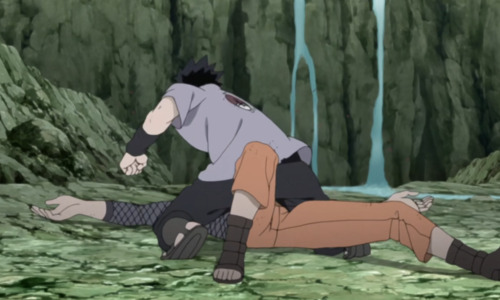
That’s when I finally understood that this posture means, the fight is very personal. Which means, Sasuke or Naruto won’t be fighting by sitting on top of each other with their enemies or anyone else. That’s just between them alone.
There was no analysis or cleverness from Sasuke’s side or any Unpredictability from Naruto. It was very bland and Sasuke looked clueless throughout the fight.
It started with some boxing style combat, including stealing hand seals and then some power punches. Very quickly it propels to Susanoo vs Tailed Beast mode. I expected some Hashirama vs Madara level power battle.
But all we saw there was this.
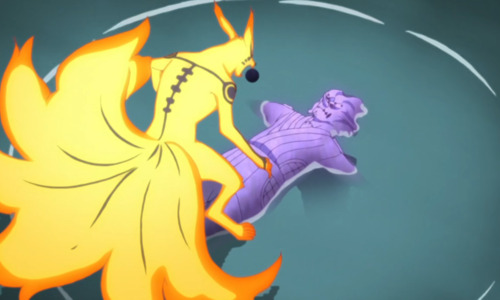
I mean, Come on!!! Man. Even the most Crazy and openly Romantic Uchiha, Madara himself never fought like this in Susanoo with Hashirama (Though Madara must be thinking ‘Damn Hashirama! I should’ve tried this with you’. LOL). Those mega battles carried variety of tactics.
Another thing I noticed was, Sasuke is the one who does lots of talking and constantly pursuing Naruto. Whereas Naruto is uncharacteristically quiet for the most part.
And finally it leads to this.
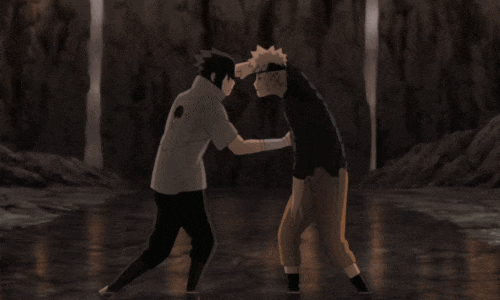
Sasuke was unconsciously getting closer and closer to Naruto which is the opposite of what he wants to do. Because of that very closeness, he couldn’t look at his eyes with his Sharingan and eventually got an uppercut. It’s like Sasuke was screaming, ‘Hate me’ and Naruto was like ‘Keep talking’.
Every jutsu he had for attacking from a long-range were forgotten. He didn’t even try to put Naruto under Genjutsu. I mean with his Rinnegan, he was capable of putting all the 9 Tailed Beasts into a powerful Genjutsu. Why didn’t he try that with Naruto? There was no Chidori Stream or Lightning Blade.
I can imagine Naruto doing close range fights with someone or even sitting on top of the enemy. Example, part I, Naruto head bumped Gaara. He was literally fighting with his Shadow Clones against a Monster so he had to get closer. Naruto monstrously punching Deidara not knowing the fact that it was a clay clone.
But Sasuke??? Can you imagine Sasuke sitting on top of the enemy and punching to pulp??? No way. Not a chance.!!!
In one way or other way, Sasuke was always in the close proximity with Naruto throughout the battle and touching each other which is totally uncharacteristic of him when compared to his other battles.
Every battle he ever fought was always at a distance which is the clear representation of his own character. He is calculative, analytical, precise and moves fluidly with a flair like a true Ninja unlike Naruto who is always reckless, noisy, powerful and clumsy.
Sasuke is someone who never lets his emotions get ahead in the battle, unlike Naruto. This is evident from the War when he was yelling at Naruto to stop worrying about Hokage as they were Edo Tensei who can regenerate. Even when fighting with Itachi, he calculated every move and attacked Itachi without any emotions except at the very end. Sasuke in this final battle forgot who he was and telling us viewers “Am just gonna get closer to Naruto and punch him hard”.
In short, Sasuke completely forgot all his battle tactics he had with Itachi and let his emotions get ahead of his cleverness and got himself closer to Naruto which eventually ended up weakening his resolve to kill him. This is what I meant by Unintentional Closeness.
Anyways, what I understood was, the creator didn’t put all this by without any meaning. It’s all very deliberate and drawn carefully.
Moving onto the final and the most defining moments of SNS.
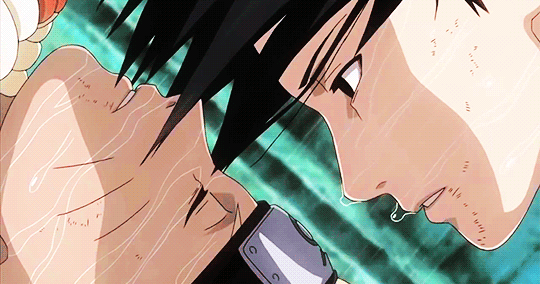
When I watched this scene for the first time, I can’t comprehend the exact meaning. And I forgot about this later because of my excitement to know what happens next. But what I understood on my rewatch is that, the feelings exchanged here is very pure and innocent but distressing.
Sasuke already lost his resolve to kill by not ramming Naruto with Chidori instead balled up his fist. So he is not contemplating whether or not to kill Naruto.
Sasuke made every effort to leave Naruto and succeeded in it too. But somehow, accidentally, when faced with a person whom he considers so precious in such a close proximity, despite have a stinging pain in his arm, he is feeling the warmth he once felt. He just wants that warmth to prolong for some more time and he can’t able to evade it. So he totally gave in to that desire and feeling it unconsciously. Sasuke always watched Naruto (unbeknownst to him) and felt warmth, relief and weakness. This scene is the symbolic and innocent representation of all those feelings when he saw Naruto and he is exeriencing it for the final time.
Does this means, does Sasuke wants to kiss him? No.
But every symbolism of that being happening is there. It’s just all open to interpretations. The creator could show us how Sasuke fell on his knees and staring at Naruto intently but never intended to show when he got up and left. I don’t understand this twisted mind of the creator.
Added to that, Sasuke was about to say ‘Naruto, I....’ God only knows what he was about to say. But every possibility of Sasuke confessing and kissing is there.
I know the creator cannot approach this directly considering the situations he worked under. But is there any necessity for such an intense scene? Even the anime creators loved this scene and made their own version of making Naruto’s eyes wide open and even more closer.
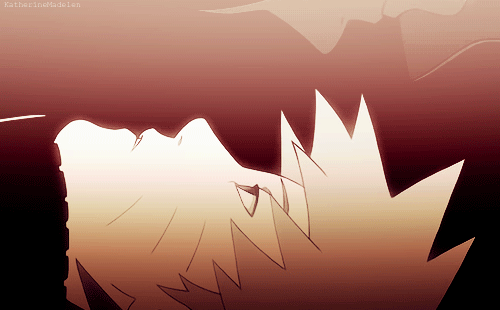
I wont be watching my friend or sister like that.
That explains all the way back to this fated accidental scene.
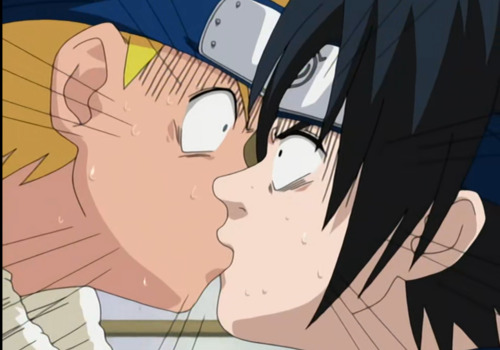
There is nothing special about this scene. It’s all very clear that the kiss was accidental. It was really funny. But my point is why Sasuke never beat him to pulp or even push Naruto away like he did with Sakura and Karin? Why did he stood up for Naruto before Sakura? Why did he let go off Naruto even though he tied him up? Too many leeway for a single person in a single episode. And the most important part is, Sasuke thought it was intentional and remembers the taste. LOL.
Does this means he enjoyed the kiss? Not at all.
Most probably he was shocked to see Naruto in such a close proximity after seeing him from a distance for all those years. And he enjoys this as just another prank from Naruto in his own innocent way. But he won’t mind getting another one from Naruto either.
So, to conclude
I believe I made this post from an objective standpoint without making crazy theories and I don’t have to..... since canonical resources were plenty. Obviously my own bias will also be there which is unavoidable. But I tried to question the creative choices of why this scene even exist in the first place many times. Because those are the scenes which made the most impact inside me.
My first watch of Naruto gave me the benefit of doubt that ‘Are they in love? Nah... They are friends. Maybe I am just overthinking... but why does it feel different??’ and that too only after finishing episode 478. After rewatching it again and again, it only consolidated my view.
For Sasuke, his worldly ties are pretty thin and runny. He was always a loner from the beginning even when he had his family. He never bothered to make any friends nor did anyone tried to befriend him. He was pretty close to his family especially Itachi. When he lost everything, somehow he got attracted innocently to Naruto and started to like him. But beyond Naruto he never bothered to add anyone in his heart. He considered Kakashi and Sakura were like his acquaintances who helped him a lot and that’s all.
Then after using Orochimaru, he gathered some high skilled shinobi for killing Itachi. But he made it clear that there don’t need to be any understanding but just co-operation would be enough. But along his way, he just abandoned Jugo, Suigetsu somewhere. He openly said to Karin that she is nothing but a burden to him. When his hatred reached upto a maximum boiling point, he didn’t even hesitate to kill Karin, Kakashi or Sakura. But the moment Naruto appears he calmed down. The proof? He was shocked to see Naruto at first. Then Naruto calls, ‘Sasuke!!!’, to which Sasuke responds with, ‘What?’. Despite becoming a maniac, he could find it in his heart to listen to Naruto.
It took an Edo Tenseified Itachi to bring him some rationality to question his beliefs about destroying Konoha. When Jugo and Suigetsu appear again, he casually asked them, ‘What do you want with me at this point?’, I mean, Come On, Man. LOL. Even during the war arc, when things were about to blast off he only cared about Jugo (who helped him many times, so understandable) and Naruto (Geez!!! LOL).
Even after their final battle, the anime went so far as to create a scene where they were alone in a bright Konoha. But Sasuke looked very peaceful and listening to Naruto intently. When Naruto freaks out about Infinite Tsukuyomi, he casually laughs off and says ‘you still care about the world’. Meaning, he is happy there spending time alone with the person he loves. Doesn’t give a rat’s ass about missing anyone else. (How romantic!!!). Honestly, Sasuke wouldn’t mind if they were to stay that way forever. He would gladly listen to Naruto all day. But when Naruto disappears he freaks out and starting to make up his mind about joining his brother.
It’s very clear that the people he adores are Itachi and Naruto. Towards Itachi, it’s super understandable, because he is his own brother. But Naruto??? Why should the creator go so far as to make Sasuke adores Naruto even after breaking up with him?
And why make Sasuke possessive about Naruto’s life? When Obito was about to kill Naruto with that Black Orbs, Sasuke blocked him and said ‘You are not the One to sever the past, I am’. I understand the logic behind Sasuke’s possessiveness on Itachi’s life because he destroyed his family, childhood and even Itachi wants Sasuke to be the one to kill him. But why possessive on Naruto? He is not related to him by blood. Naruto never did anything wrong to Sasuke to warrant any hate either. You will become possessive on something only when you truly hate it or wholeheartedly love it. There is no middle ground. My point is why put Naruto here at all in the first place?? Believe me, If Sasuke never paid attention to Naruto in the War arc, I would be the first person to jump out of this ship.
Just to give you a basic example, Imagine you are living in a place far away from your family, friends and that loveable person. When Corona hits everywhere and forced Lockdown to travel outside the city, and the situation is getting worse day by day. Whom would you desperately reach out first? You would reach the person whom you are connected well in your family and that loved one. You will prioritize your friends only later. This is the Universal truth. Sasuke was seen showing that same instinct in the War arc towards Naruto whom he was not related by blood. And you all just want me to believe Sasuke sees him as just a friend?? Give me a break!!!
If all those traits I’ve mentioned above have been avoided to a greater extent, I would be happy to believe that they are friends. If not all, at the very least delegate some of the tropes to other people or share some of the tropes with other people along with Naruto. But dumping it all on Naruto alone makes me only curious and incredibly romantic too.
It’s no wonder, Naruto would go so far as to reach out Sasuke even at the expense of his life.
Oh, Did I forget about the cutest and most exclusive trope to SNS?
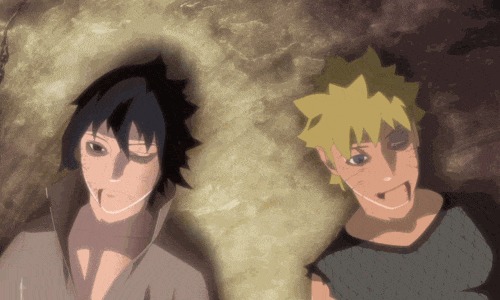
U-SU-RA-TON-KA-CHI, the most personal word which carries its own meaning and is only for Naruto. So funny that Sasuke has to spend a certain amount of energy to call Naruto using a 6 syllabic word rather than NA-RU-TO, a 3 syllabic word which is much easier.
Disclaimer: This post constituted everything from from Chapter 1 to 699 or Episode 1 to 135 (part 1) + Episode 1 to 479 (Shippuden) excluding fillers. Though Sasuke shinden novel was made into anime, I don’t want to consider that here. As much as I loved the prologue in that novel, I still don’t want to cite that here, as I consider everything after 699 is $$$$ making bullshit.
FUN FACT:
If you put yourself in any character in the Naruto Universe except for Naruto, and ask them, ‘What do you think about Sasuke?’. You know the answer from Sakura, she will say ‘Sasuke-Kun looks very cool and acts aloof, that’s why I love him’. Kakashi will say ‘My favorite student’. And all the other people will say somewhat similar, ‘He is an excellent Shinobi who belongs to the proud Uchiha clan and Naruto’s rival’
But Naruto will be the only person to say this.
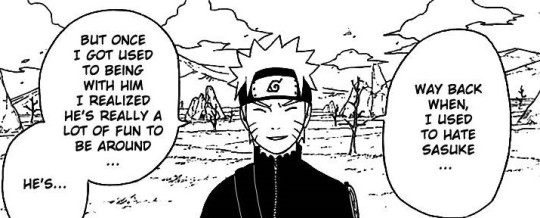
“Lot of fun to be around” ....... LOLLLLL.
Me: No, Naruto!!! Clearly not. No one in your universe can have fun with him except you. Go and Ask Sai, Team Taka or your own Team 7. They adore him for being Cool and Talented. But Fun is not the word that equates with Sasuke unless there is no You, Naruto.
Thanks for reading :-D
#sasunaru#narusasu#sasunarusasu#sns#naruto#sasuke#naruto uzumaki#sasuke uchiha#anti sakura#itachi#anti sasusaku#anti naruhina#naruto analysis#naruto and sasuke arent brothers as they never shared a womb#if you see your friend with all these traits then you are no longer just friend
648 notes
·
View notes
Text
Why SaNa over other ships?
Now, this is not to hate on other ships or downplay them, because what shipping really comes down to is often simply preference. What characters or dynamics you enjoy and what reasons you might have for liking different things.
No, this is simply my own reasons for why I like SaNa and also why I think they could make sense and thirdly why it’s possible Oda could be setting it up to actually happen in canon. It’s all just my views and I apologize if I forget a moment or add something that is more head canon, but again, this is my reasons and they will always be partially biased. (And there are too many to remember them all properly, so if you want to add feel welcome to do so.)

I think Sanji and Nami is a lovely ship even based just on fan content and the community. But we also get some great moments in the manga, and I personally think there is potential for Oda to make an actual romance work between them.
1. Why I like Sanji and Nami
I personally fell in love with Sanji before I even started to watch or read One Piece, simply based on his voice actor (Hiroaki Hirata), his design and his fighting style. So obviously I already have a bias towards Sanji (SanjiAFsincedayone having a bias towards Sanji? Who knew?). I didn’t ship Sanji with Nami from the start and even now I am a multi shipper who enjoys fan content with Sanji as a main part of several pairs, most prominently ZoSan.
So, when did I fall for SaNa then? Well, I have talked about it in various posts before which you can find in my Masterpost - SanjiAFsincedayone, but for me shipping Sanji and Nami more seriously didn’t start until Thriller Bark.
Sanji took a knife in the back for her as she is dressed in a wedding dress, even this one scene is enough to explain why someone might like to ship them together.

I for sure saw many SaNa moments before that, and felt Nami seemed special to Sanji, but I didn’t think it would have a big chance of happening and I preferred other ships above it when consuming fan material. Again, shipping is after all mostly fantasy and wanting more of something in a romantic/sexual way. Thriller Bark was when Sanji and Nami’s interactions caught my attention properly and I started to look a bit closer and actually note the way Oda wrote them and their moments. Going back after and rereading I think there is a lot of interesting things even before that. But the wedding theme and bridal carry and how Oda showed them in Thriller Bark was just too on the nose to ignore.
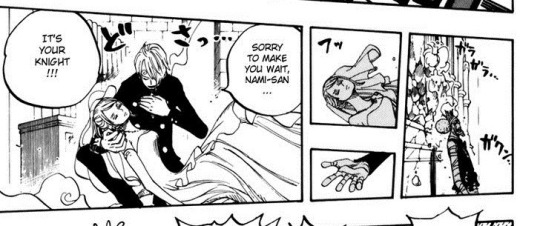
What got me into shipping Sanji with Nami were mainly three things.
1. Their dynamics getting more interesting over time and Sanji and Nami being two of the most well written and interesting characters in One Piece. 2. Sanji consistently seeming to have a preference for Nami in combination with my belief that he is after true love and isn’t just a pervert forever doomed to be alone. 3. The manga showing the potential of it actually happening and them finally catching my attention in Thriller Bark. Basically there are moments to follow and look at in the actual story as well, which in turn also leads to more fan content and material for shippers.
So point 1 and 2 really is mostly about my preference and how much I enjoy watching them together and how well I imagine they would fit together. I think their personalities and desires overlap well with them being able to understand and compromise for each other while aslo being on a similar level of intelligence and communication. They also have their kindness and empathy as a highlighted shared theme for their characters.
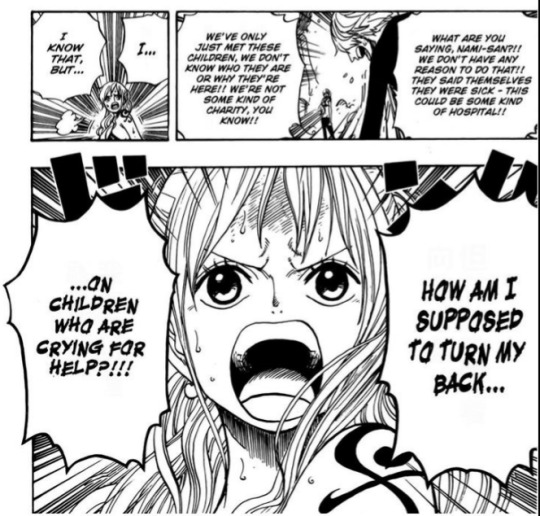
Them talking about the Children in Punk Hazard or Sanji helping Nami turn in the argument between both Luffy and Vivi and Luffy and Usopp are some examples. Or Nami letting Sanji smoke in her body because she knows how hard it is for him. Small gestures like this show both understanding and a willingness to compromise.

I think they are fun and have a relationship that right now might need working on, but it’s clear how much they care for each other and how they actually appriciate each other a lot.
Simply put I think they are interesting together and I think they could work as a romantic couple in the future, where their dreams and family oriented views migh allign. Again, from how I view them as characters and interpret their wants and possible futures I think Sanji and Nami is a good match. They can have a restaurant either traveling the world or docked close to both Cocoyashi and Zeff, Nami can tend to her mikans together with Sanji and they can manage a restaurant for a living. I also think they are the most parental members in the crew and has shown some possible signs of wanting to settle down with families. This would also work well as a final contrast to their less than happy childhoods (You might also want to check out my post (Part 3) Sanji x Nami hints - Thematic parallels).
There is a lot of potential in their dynamics and how different they seem while they also seem willing to adapt and try to understand each other that make them interesting as characters of romantic plots. At the same time they have enough in common to relate to each other and work well together. Again, as a fictional ship within the fandom there is a lot of great artists, writers etc. that truly explore them and make Sanji and Nami a great and fun ship with an active fandom to engage with.
Of course there are more shallow reasons like them matching in age and being good-looking but really I could ship Sanji with almost any woman if it was only about the looks. I mean, Purin is basically made to be a perfect match for Sanji, but I personally find his dynamic with Nami much more interesting and his dedication to Nami is of course unpraralleled thanks to the time Oda has spent on them over many years.
I love Sanji and Nami as individual characters and with the amount of moments between them there is also a lot to explore and enjoy in the manga. It makes them interesting in a third aspect for me, which is of course analysis and the potential of them actually ending up together and looking closer at the way Oda writes them from a story perspective. For me what we have gotten from Oda in terms of Sanji x Nami moments is very interesting and I see potential there even though it would need more development to truly work for the current story.
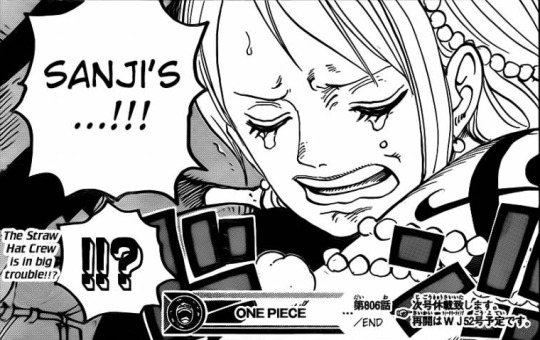
But, again shipping doesn’t have to mean anything for the actual story... There are crack ships or slash ships that surely will never happen but that could still be great and fun to explore for the fans. Honestly, everyone is free to ship whatever they want. We all have different taste after all.
So, what about the manga then?
2. Why do I think they could make sense as a romantic couple even in canon?
First, my own view is that Sanji is someone who seeks true love, and as briefly shown with both Violet and Purin it seems like he would take an actual relationship seriously if given the chance. I also think it would make him happy and thus as Oda might want to create happy resolutions for the strawhats I think Sanji ending up with someone has quite a big chance of happening. This is combination with his preference for Nami and in turn Nami truly caring for him (though not yet in a romantic way) is something that makes me think it could happen. Other ships have potential too depending on how Oda decides to develop them, but considering how he keeps adding moments for SaNa in the way he does as of now I still think SaNa is the most likely ship for Sanji.
As I mentioned earlier I also think Nami has shown some possible inclinations for wanting a family (or at least being a great mother if we look at her with children in many arc, not the least Punk Hazard) and maybe even getting married eventually.

If she ends up with someone we will need to see a more obvious attraction and want for romance from her no matter what ship we might consider. She has at this point not shown a lot, but I do think the thematic parallels she shares with Sanji in combination with how their moments are written has the potential to grow into something more.
As a romantic pair I think Sanji and Nami would be happy, he would adore her and take care of her and both of them would probably find that ideal. In fact it’s already a big part of their dynamics and seem to make them both happy. They also seem to try to understand and show interest in knowing each other as seen with several scenes and general attention towards each other’s backstories. They also challange each other in different ways and we have seen them compromise a few times. I think compared to many other relationship in the manga Oda has shown more personal moments between them. So a romantic additional aspect is not too far off. Not that Oda would make it happen now, but that he would lay down the groundwork for it to work by the end of the series.
In short I think they would make each other happy, but also challange and grow thanks to the other. I think their dreams of traveling the world with Nami drawing her map and Sanji cooking on all the seas and finding All Blue and then settiling down together close to both their “homes” in East Blue with a restaurant and family seems to fit them both. It wouldn’t always be easy, but I think they would actually enjoy their dynamics with Nami bossing Sanji around most of the time.
Now this all sounds nice and all, but it’s of course just my imagination based on biased interpretations of the manga. So where do I get it from?
3. The way SaNa is portrayed by Oda
Now this is really the biggest point... Because again, I can ship whatever characters I want and it is just for fun. It doesn’t have to happen for me to enjoy it or I wouldn’t ship Sanji with Zoro. But with Sanji and Nami there are legit reasons in addition to my preference that makes me think it could happen in the manga.
It might take years to actually go through it all in order with my additional interpretations, but I will try to go through the basics themes and moments that to me could indicate SaNa over any other Sanji or Namji ship.
I think the obvious thing to talk about first is simply how Sanji definitely has a romantic (and sexual) interest in Nami. No matter what other character you might see with either of them, this has been shown consistantly over the whole manga. You may argue that Sanji might be interested in others equally, and though I wouldn’t agree it’s a fair point. However from a story perspective it would still need to be resolved. It’s highly unlikely for Nami to end up with anyone unless Sanji ends up with someone else and gets a happy ending too.
As for Sanji’s interest in Nami I personally think Oda has paid a lot of attention to it in a way that makes it the most likely ship for Sanji. He might yet add moments between other ships and develop them (most notably San/Pu of course), but in my opinion the way Oda has added Nami in other potential romantic moments with Sanji it seems Nami is above every other woman so far.
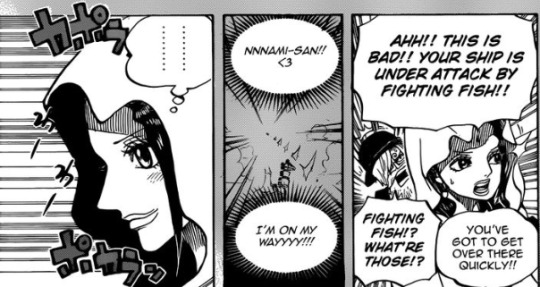
Most importantly I think we have seen:
Sanji leave Violet who actually seemed to show interest in him to run off to save Nami (and the crew, but the point is that Oda chose to highlight and add this moment with focus on Nami to begin with).
Sanji being more focused on Nami even when Vivi and Robin has been on the ship or at the same place. Oda definitely puts Sanji with Nami above other women at least in amount of moments and involvment.
Sanji being very concerned with Nami in front of Purin and being shown happy with her (the bridal carry for example) and saying he loves her right in front of Purin.
Sanji having stronger reactions to Nami than other women. This could just be my way of seeing it, but I do think we have seen the strongest reactions from Sanji when it comes to Nami. Not the least with turning into a literal devil when he heard she was kidnapped by Absalom. For example compare Sanji rushing after Nami in both Skypiea and Thriller Bark even to him going after Robin. Or his reaction to Nami getting sick in Drum. We simply have a lot of strong reactions from Sanji towards Nami in different ways and more importantly Oda seeming to add focus on them.
We also have him reacting to things like “women’s tears” or calls but only indicating Nami might be calling him personally. For example Sanji hearing Tashigi cry or saying he trusts Violet or Robin even though they are lying but for Nami adding things like “I think I heard Nami call out for me” or moments like “I leave my Nami to you”. Basically the way Oda writes it there often seems to be added a more personal stake in Sanji’s reactions and moments with Nami compared to with other women.
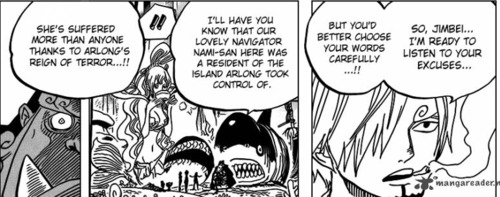
So from Sanji’s point of view, and the way Oda has written them so far, I think he puts Nami above every other woman. But more importantly, Oda shows us moments between them that he doesn’t add for other ships as consistantly or in romantic looking ways. Keep in mind that both Nami and Sanji are main characters, but they are not Luffy. Oda choosing to not use Luffy (who will obviously have strong moments with all of his nakama, like how he had his own time with Sanji both in Baratie and WCI) for some of these moments but rather insert Sanji or Nami instead for each other’s stories makes it more relevant. Because it’s not an obvious choice in the same way. It’s a choice based on their characters and dynamics within the world, not because of their roles as main hero or heroine. Here are some examples.
1. Their first meeting. Sanji is for the first time seen in love cook mode and he basically seem ready to leave everything behind for Nami. Right away his reaction to Nami is stronger than what we have seen from him and it seems to hold true even with time.
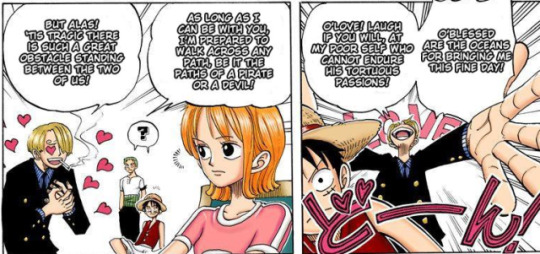
2. SaNa having interest and plot relevance to each other’s back stories. Sanji getting involved with hearing Nami’s back story and saving his sister. Also, calling her “sister” which indicates a platonic familiarity where he puts Nami above Nojiko romantically (yes, despite flirting some with her). Nami in turn also getting involved and showing interest in Sanji’s backstory, pushing to go with Luffy to save Sanji and being the one to remind us of Sanji’s past and character traits.


3. Sanji getting personally tantalized by using Nami. This has happened several times, the first with Kuroobi in Arlong Park, but also with Mr. 2 in Alabasta, Absalom in Thriller Bark and then in Fishman Island (Zou too, but that wasn’t just Nami) and on Zou. You can check my post (thought not updated fully) Sanji and Nami – Fights and danger for a more detailed view. (Even in movies like Strong World Sanji has a direct talk with Shiki about Nami and it seems most people are aware of Sanji being extra sensitive to Nami.)
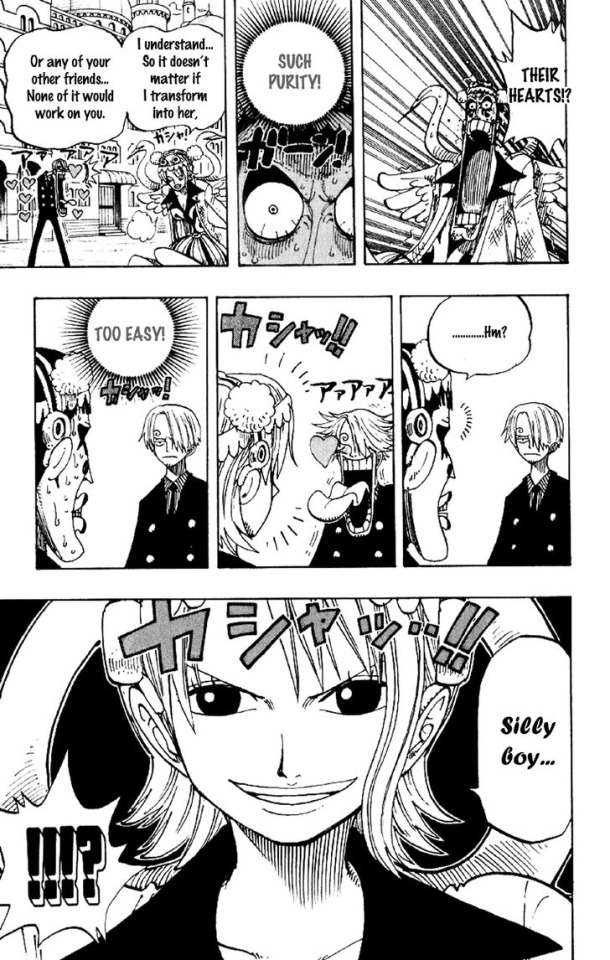
4. Sanji asking Nami if she is jealous or if she loves him, indicating again that he is interested to know is she is interested in him. Once even responding “I love you too”. In general Nami responding in these situations in a more “positive way” or Oda showing Sanji interpreting her actions as more romantic. For example the “proposal” or the hug in WCI.
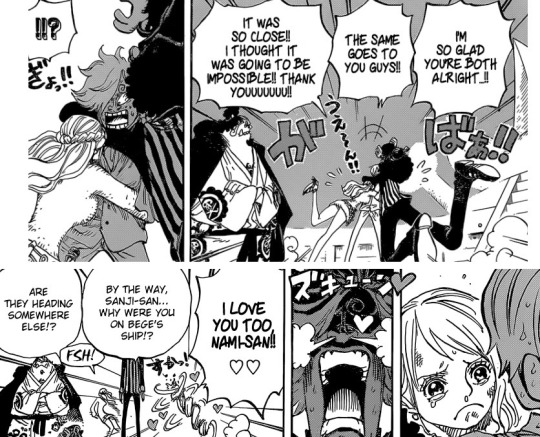
5. Romantic looking moments or themes. Now this is of couse not something that has been done mutually between them and thus aren’t actually romantic scenes. But the tropes and common use for many of the things that Oda has chosen to use for Sanji and Nami are romantic in nature. Of course the two forced marriages are the strongest examples with them rescuing each other from getting married to someone else. But we also have the switch body trope, the slap and of course smaller gestures like the bridal carries or the way Oda drew the hug between them in WCI. I am not saying that SaNa is the only ship with romantic looking moments, because San/Pu And San/Violet obviously has some as well. However, considering the amount SaNa moments and the fact that he has left Violet and Purin in particular for Nami seems to make the SaNa moments trump any other ship. At least for me personally SaNa as it is now and as Oda has portrayed it in comparison to other Sanji ships gets in the way of Sanji ending up with someone else unless Oda starts to make some changes.

I want to make some emphasis on how Nami and Sanji seem to get some “bigger” moments between them in almost every arc. Again, compare this to Sanji with other women, or even Nami with other crew members.
Baratie - Their first meeting and Sanji’s reaction to Nami and interest gets focus. Arlong Park - Sanji shows interest in Nami’s past and Kuroobi mocks Sanji by specfically mentioning Nami. ( Loguetown Arc, Reverse Mountain Arc, Whiskey Peak Arc and Little Garden mostly have small moments, like Sanji asking if Nami is jealous or Sanji giving Nami his jacket.) Drum Island - Nami is sick and we see Sanji worry and care for her and in the end even sacrificing himself for her. Nami worries about him too. Alabasta - Sanji fighting Mr. 2 looking like Nami and lots of small moments like Sanji asking Nami if she loves him.
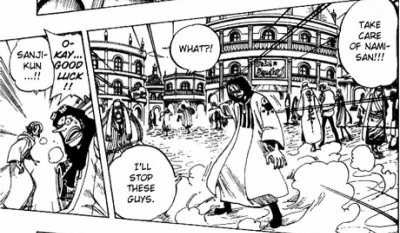
Jaya - Nami showing interest in Sanji’s back story. Small things like Nami hiding for the bugs behind Sanji or Sanji. Skypiea - Sanji being hell-bent of saving Nami and making the others look for her. Then him saving Nami and Usopp from Enel and Nami being worried in return. (Both times Sanji gets hit by Enel Nami is there and worries.) Then a lot of small moments like him giving her a flower and Nami pulling Sanji’s ear for flirting with Conis. Long Ring Long Land - Nami encourage Sanji be the ball and win, but mostly small moments like Sanji getting annoyed with Aokiji for flirting with Nami or him sitting next to her and trying to kiss her. Water 7 - Sanji leaving his love letter to Nami and Nami being worried for (and impressed with) Sanji. Enies Lobby - Sanji losing against a woman, Nami being understanding and then stepping in to basically revenge him. Also Sanji hearing it as Nami loving him and then him showing up to save Nami and Usopp from Jyabura.

Post-Enies Lobby - Not much, but Sanji stepping in to make Nami and Zoro stop fighting and make Nami understand Zoro’s pov. Thriller Bark - Sanji just being extremely focused on Nami and worried about her throughout the whole arc. Also him getting specifically selected by Luffy to save Nami. Of course the wedding theme with the bridal carry and Sanji’s reaction to Nami. Also Sanji’s Zombie protecting Nami (and later kicking Robin) and his “obsession with Nami” being mentioned. Sabaody Archipelago - Another smaller arc, but we do get Nami worried about Sanji possibly drowning. And smaller moments like Sanji being angry for Nami being put in danger by the Fishman Riders or him telling Franky to take care of Nami as he runs to protect Zoro. When they return we of course also get the nosebleeds, and Sanji daydreaming about Nami’s development.

Fishman Island - Sanji’s reaction to Jinbei and Arlong. Also the fishmen pointing out that Nami might be their weakness due to Sanji’s “over reaction“ to her falling. Punk Hazard - The body swtich, Sanji’s body saving Nami and Sanji being careful with not hurting her etc. Also them working together to save the children, Sanji listening to Nami’s request and saying he loves her more because of her kindness. Also small things like Sanji giving his jacket to Nami again. Dressrosa - Sanji leaving Violet behind to save Nami, insisting that he should be the one to save her and then him getting attacked by Doflamingo and Nami getting worried and not wanting to leave him. Sanji basically tries to sacrifice himself for Nami for the 4th time (Drum, Skypiea x2, also maybe in Thriller Bark). Zou - We get a lot of focus on Nami and Sanji together, and then of course when Sanji is gone Nami is the driving force for his plot. Once again Nami is also used to taunt Sanji (inside Capone). Then Nami is both the one to mention Sanji being from North Blue and to listen to Pekom’s talk about his family. Not to mention her insisting on going with Luffy to WCI and having a fight with Zoro as she defends Sanji. Whole Cake Island - The way she pushes for them to find Sanji, her hapiness when they find him and her hurt and the slap. We even get something like Nami being tantalized with Sanji by both Purin and Brulee. The only strawhat besides Luffy who gets a personal story thread with Sanji and a personal resolution for their conflict is Nami. The tension seems personal and combined with Sanji having another love interest but choosing Nami above her it does seem like Nami is the more natural choice both for Sanji and for Oda.
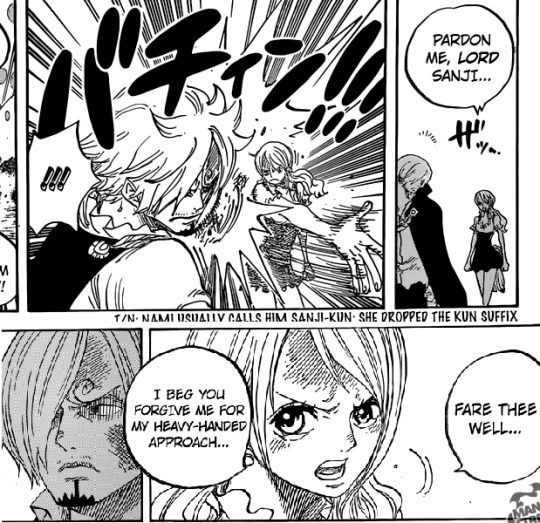
There is also a distinct increase in romantic-looking moments between them, with them touching more than ever before.
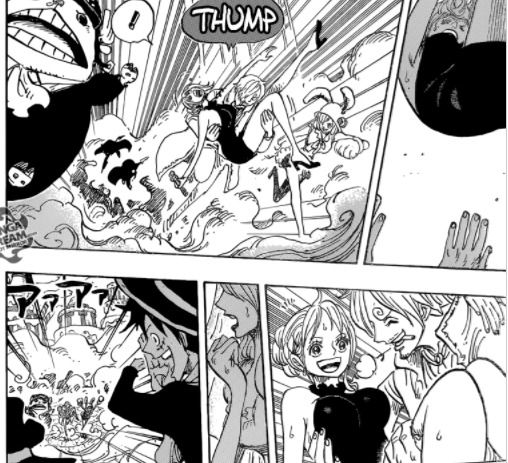
Wano - Even after WCI it doesn’t seem like Oda is stopping the SaNa moments. Sanji manages to save and carry Nami three times in the beginning of Wano. On top of that we have the bath scene and of course a lot of small moments and mentions between them like Sanji asking Usopp to take care of “My Nami-san” or Sanji jumping in abobe Nami to save her from arrows.

How many times have we had Sanji be the one to go after Nami or save her? By his own choice, by being the one present or even by Luffy asking Sanji to go. Oda puts Sanji next to Nami a lot, and I think it’s possible he might be doing it for a reason.
Who knows what we might get, but the fact that we have as much as we do really seems to show Oda having a preference to put them together in various ways.
The point is they have a lot of time and moments dedicated to them from Oda despite them both being secondary characters. At this point it’s possible Sanji is the person Nami has moments with the most in the story besides Luffy (and perhaps Usopp) as they often end up together. Of course this is including them thinking about and talking about each other as well, and not just direct interacting. For example counting the body switch and Nami being worried and focused on Sanji while on Zou. Oda doesn’t have to, but he has chosen to write it like this. On top of that he adds romantic interest from Sanji and romantic looking moments between them.
I could go on, and there are plenty of moments and examples to find between Nami and Sanji that are interesting to look a bit deeper at. You can check out my Masterpost - SanjiAFsincedayone for some of them. But as it is now here are the main points for why I think SaNa at least has a bigger chance to happen than other ships with the two of them as it is now.
One-sided attraction and romantic interest from Sanji’s side that needs to be resolved in one way or another.
Nami seems special to Sanji. Even small things like only using -san for her and -chan for others is a detail that makes her stand out to him.
Great involvement in each other’s stories. Oda likes adding Sanji and Nami in moments together both for interaction and explenation about each other. For example Sanji is also often used to save Nami.
Interactions of understanding and changing dynamics between the two, like them compromising for each other or wanting to know about the other’s past. Matching personalities and a possible future.
Romantic themes and moments, mainly the weddings, but also the amount of times Sanji has saved Nami and things like the hug being drawn in a very romantic looking way with Nami being more focused on.
Tension and urgency. This is basically Sanji and Nami having a lot of focus on each other in dire situations and Oda showing it with specific mentions.
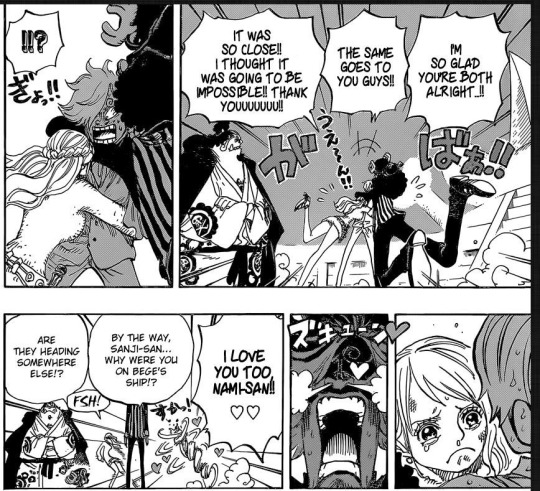
So, to summarize, I like Sanji and Nami both as indvidual characters and together. I enjoy them as a ship and to explore their dynamics in a romantic way no matter what they might end up as in the story. Anyone should be able to respect that people have different preferences. Additionally I think and speculate that they would work well and could happen in the manga as well. This is obviously a biased interpretation and opinion.
I might be wrong, but you should be able to respect that too as we have yet to get anything objectivly confirming any ship. We don’t know if any ship with end up canon at all. Maybe Sanji and Nami will remain a ship that never becomes canon, but even so they are a ship that is definitely worth enjoying.
I hope you found this post interesting and can enjoy your own ship and fandom while also seeing that it’s ok for others to like something different than you. Thanks for reading.
#sanji#nami#sana#sanami#sanji x nami#sanjixnami#sanami theory#One Piece analysis#sanji x nami analysis#sanjiafsincedayone#one piece manga
380 notes
·
View notes